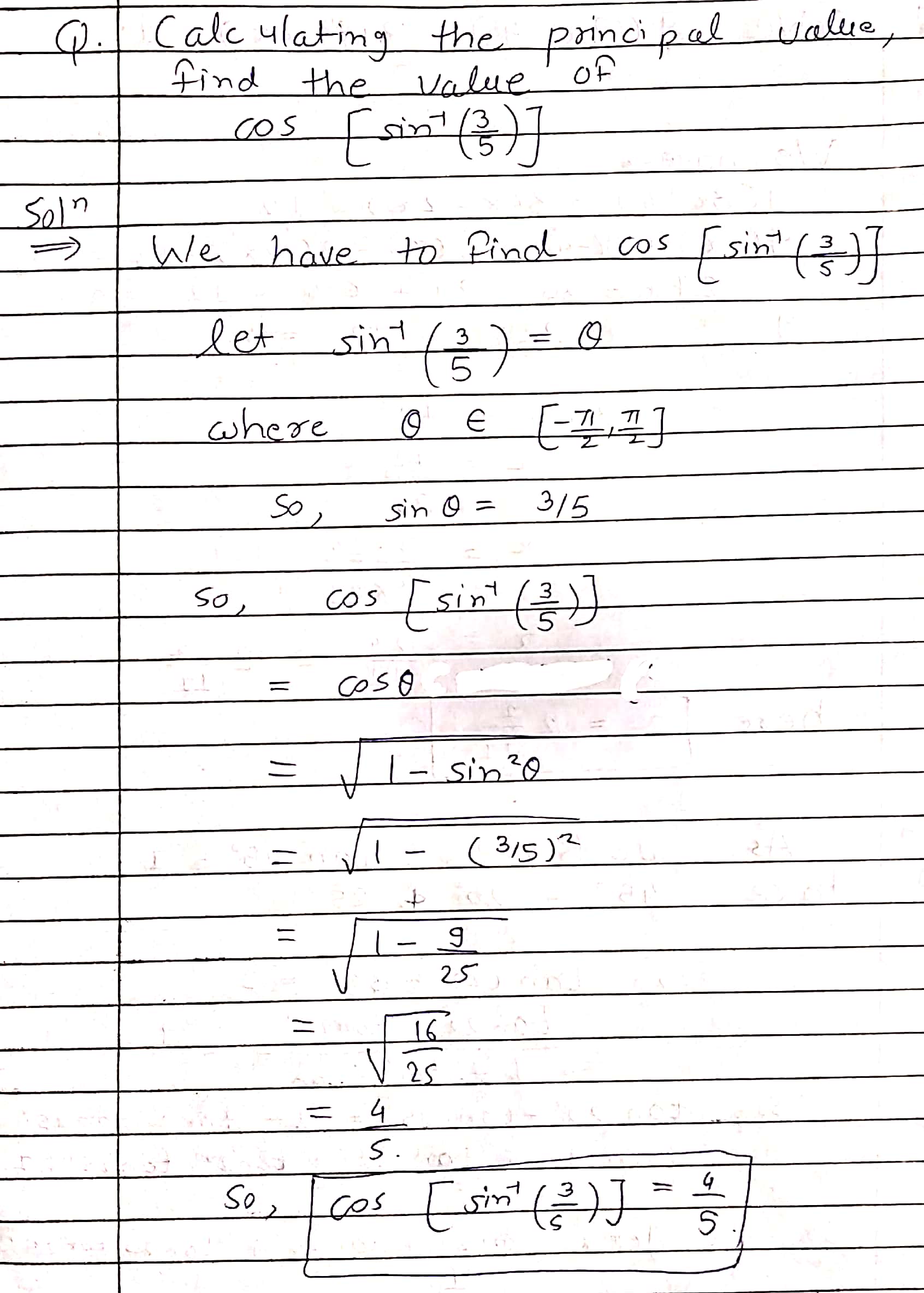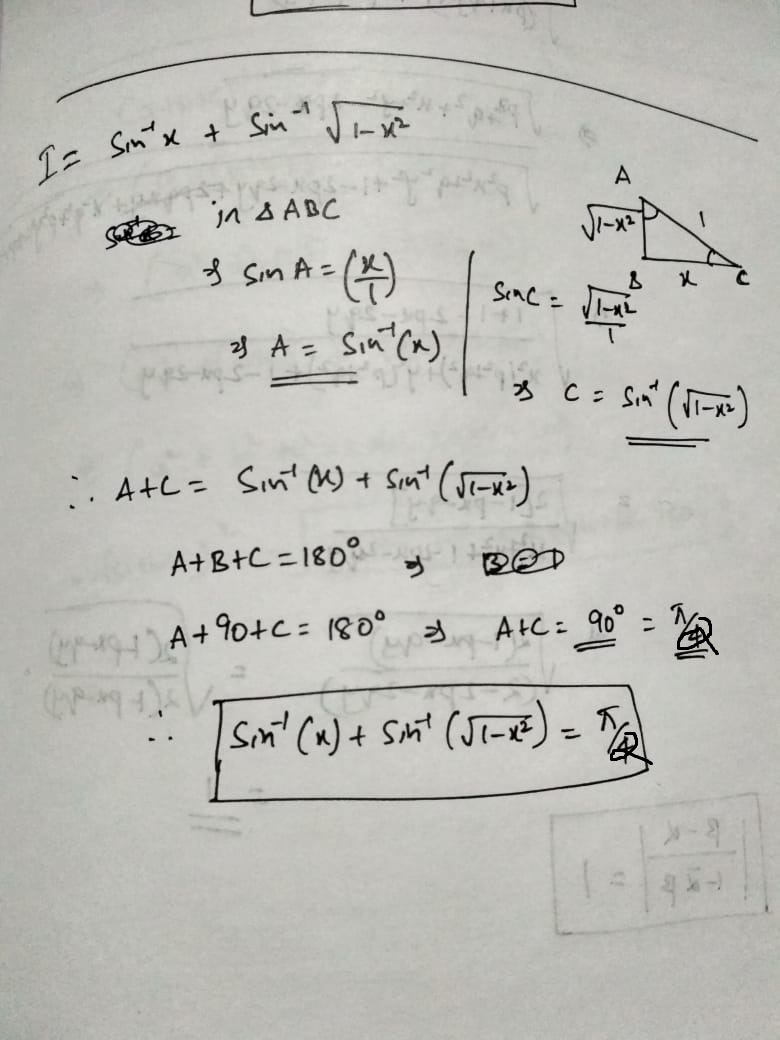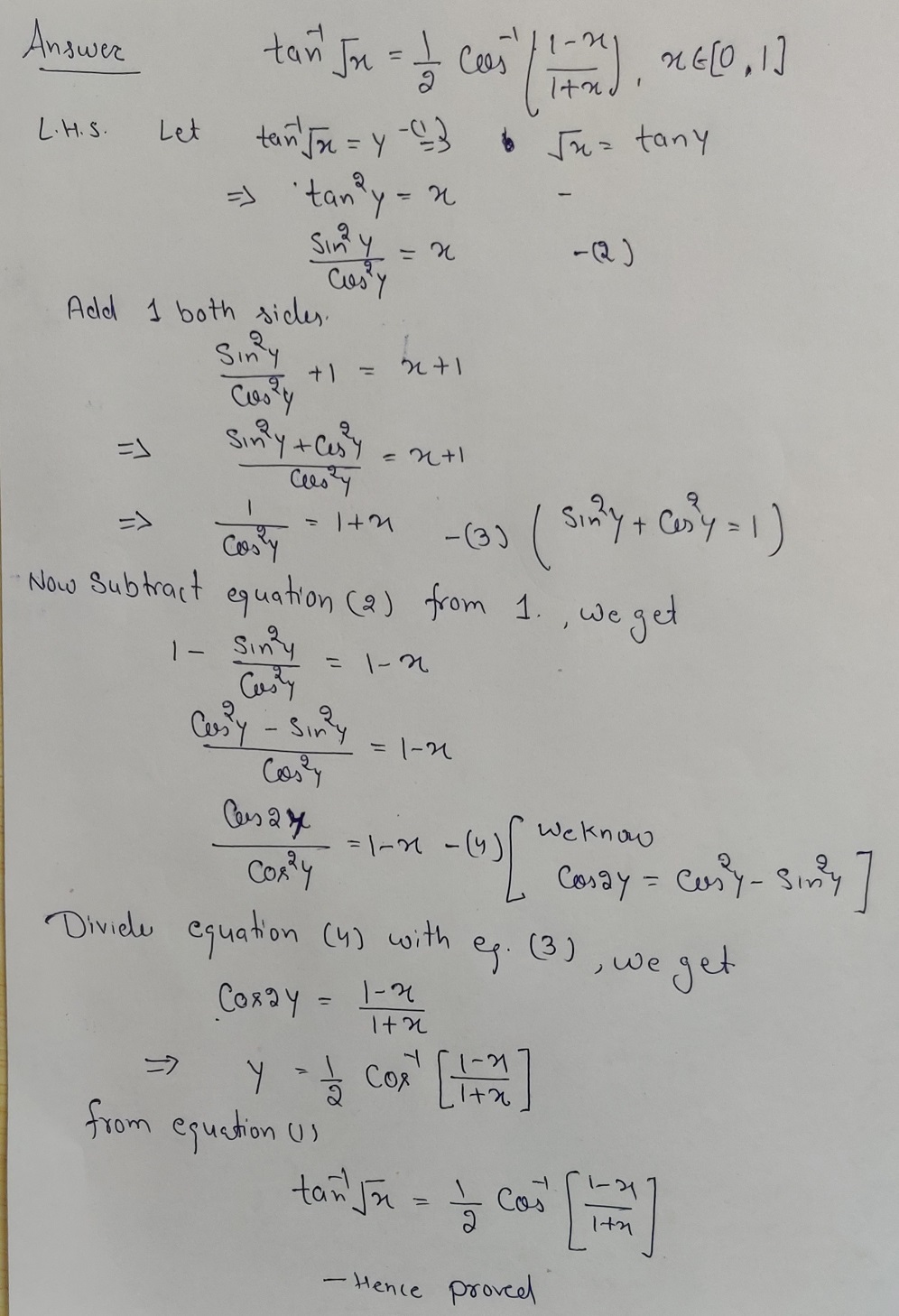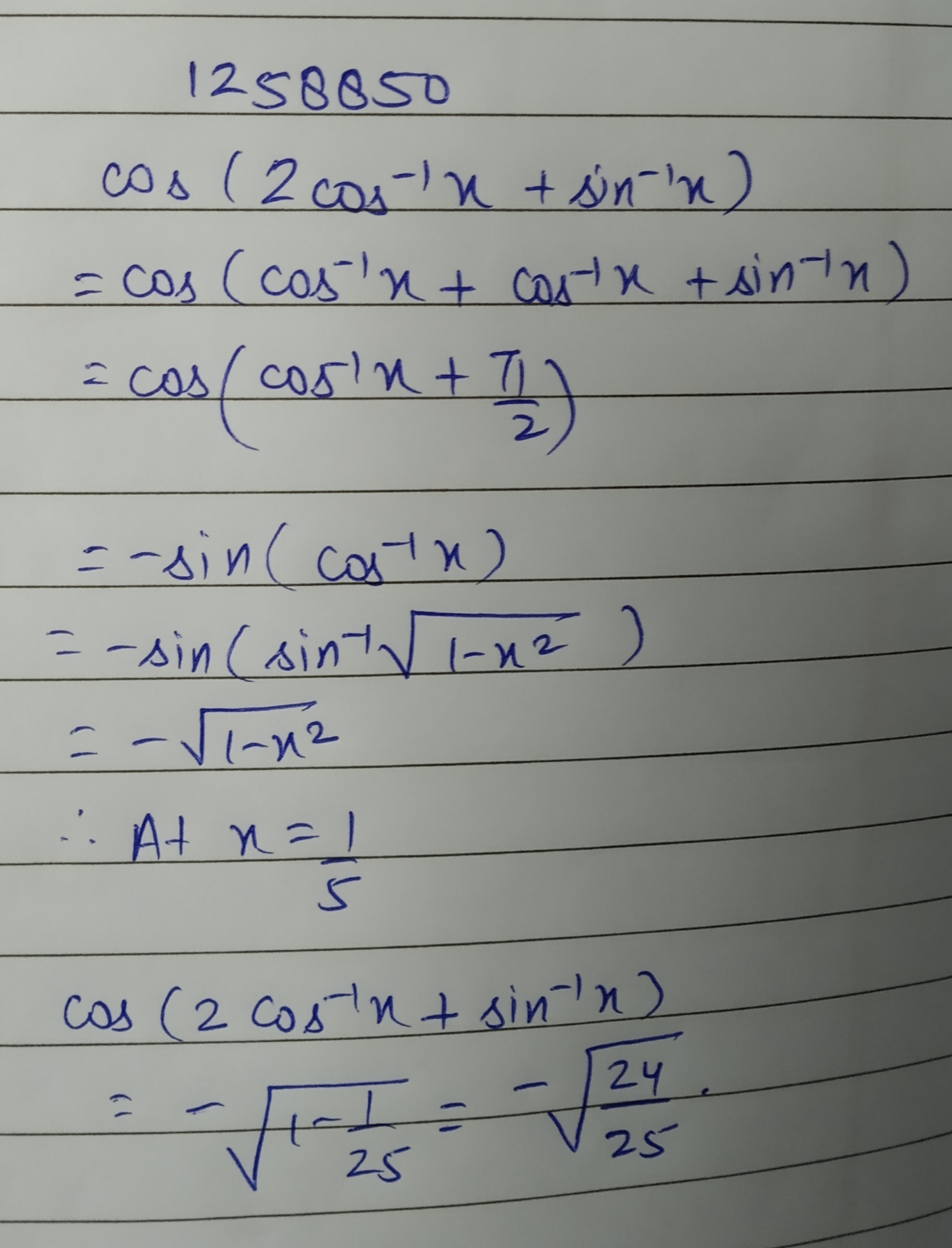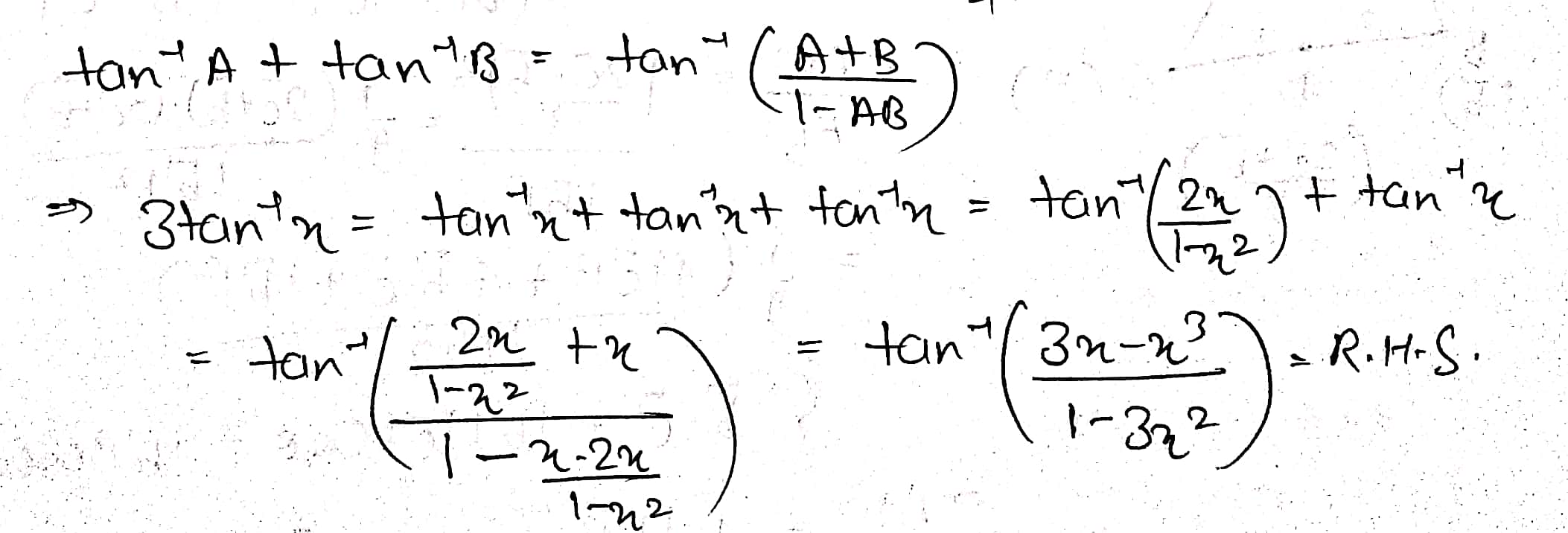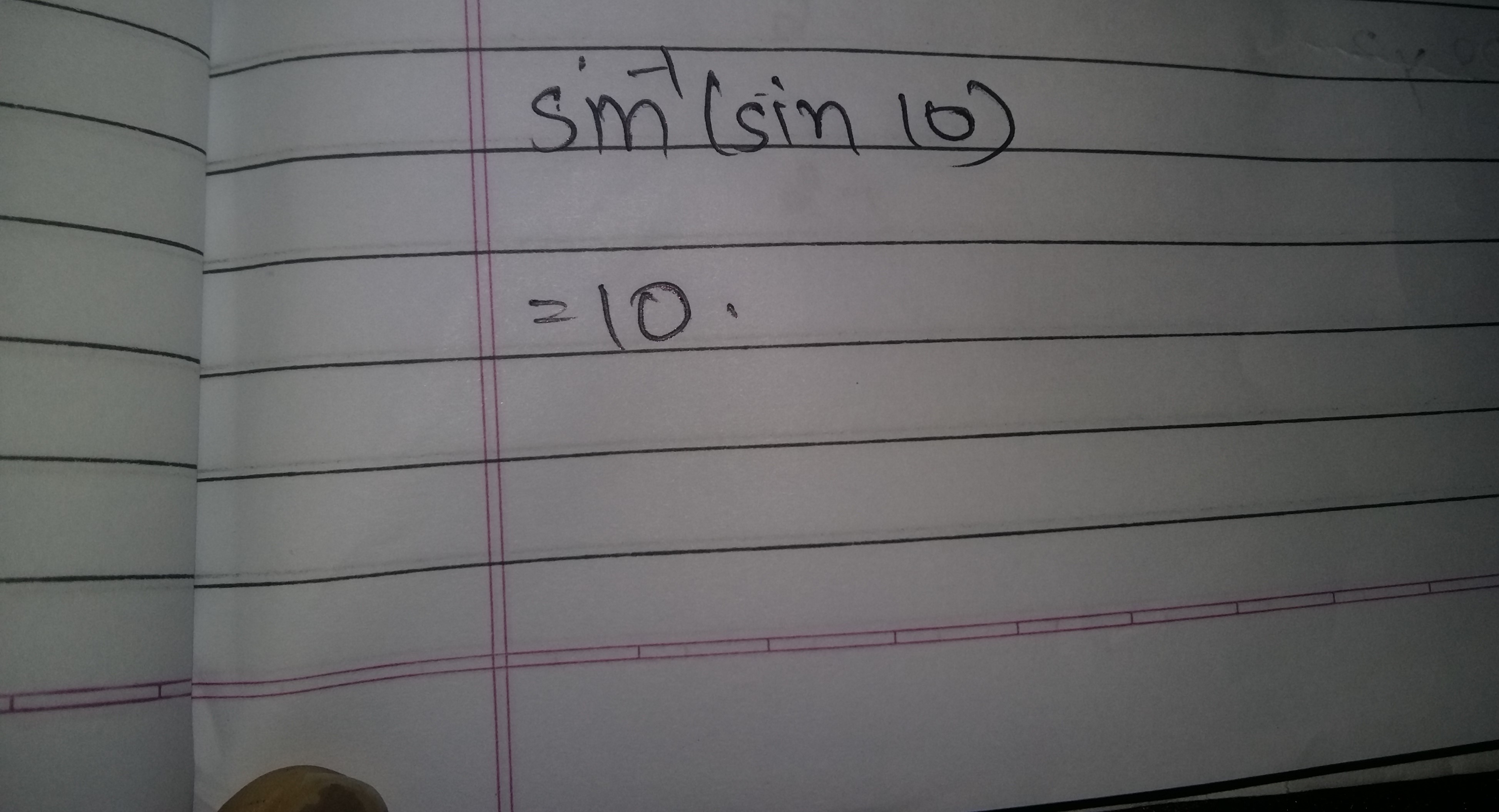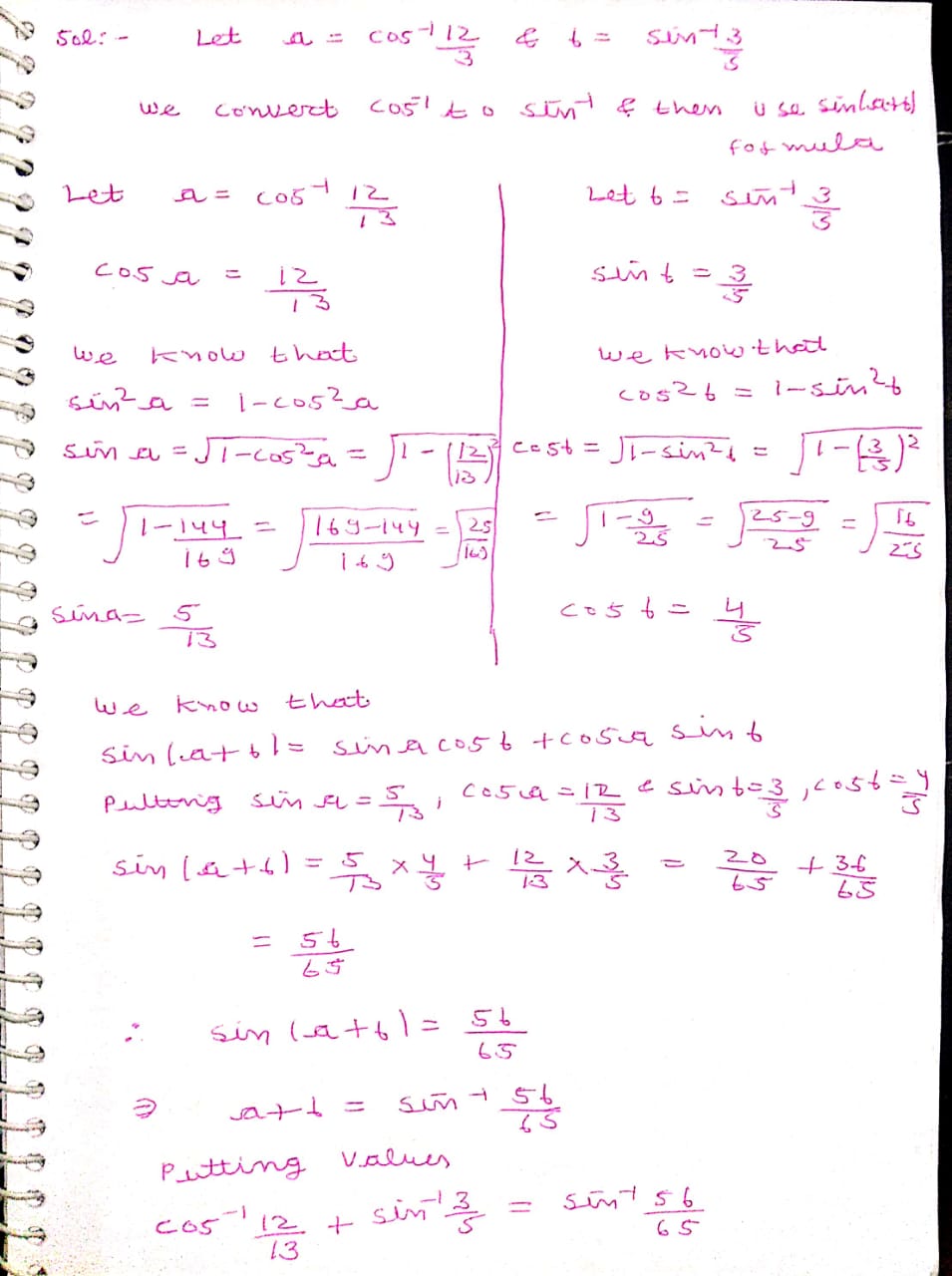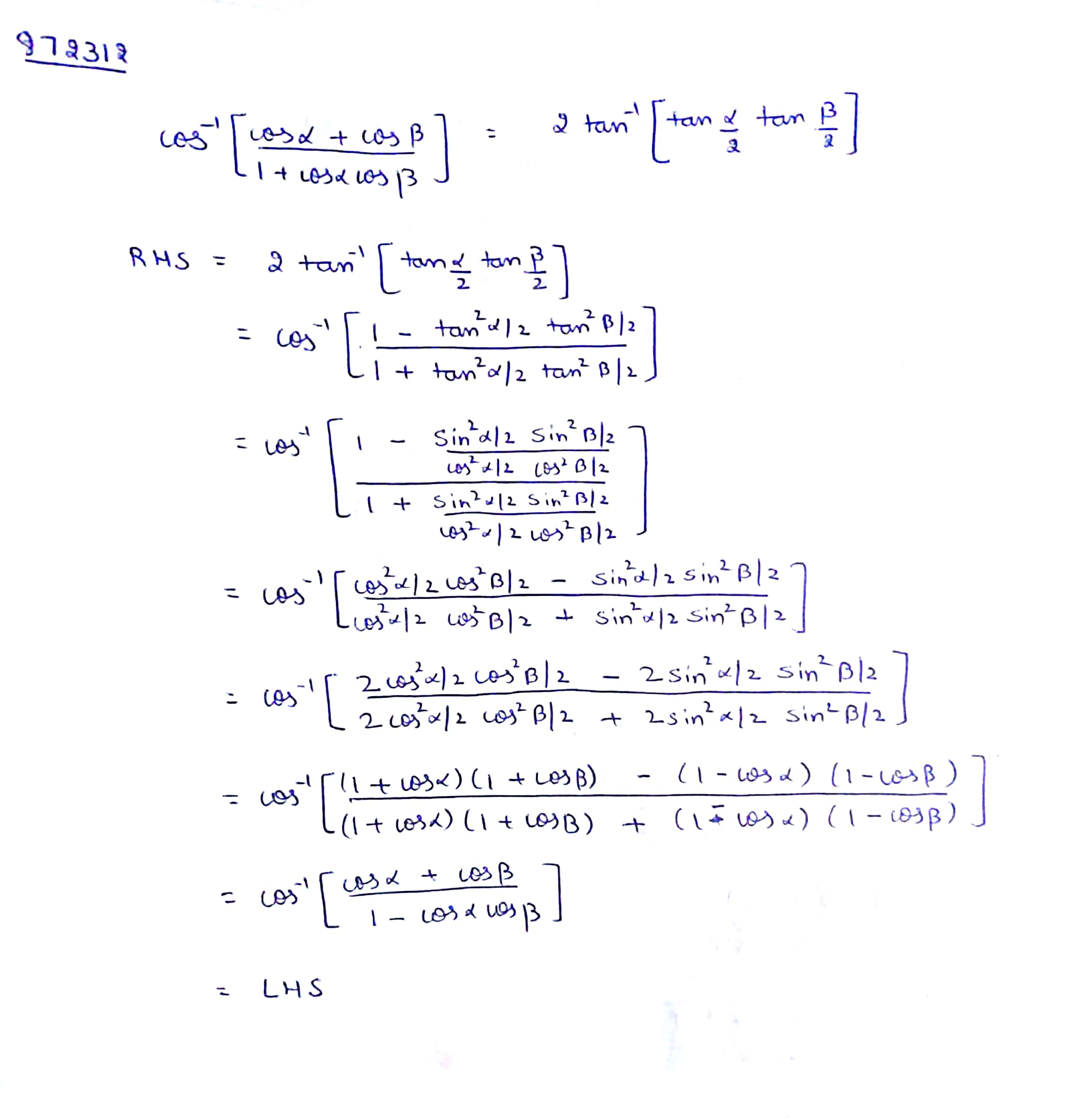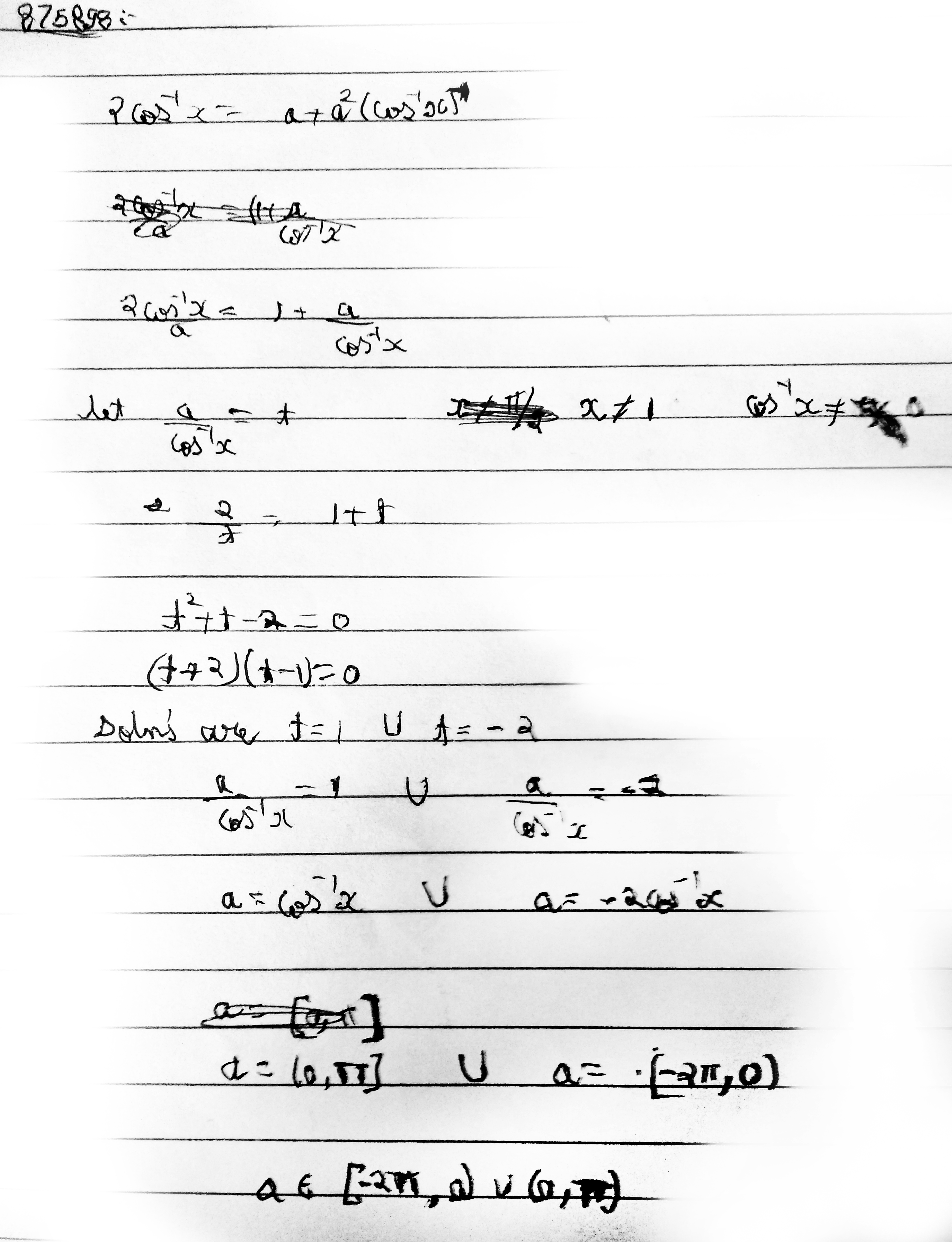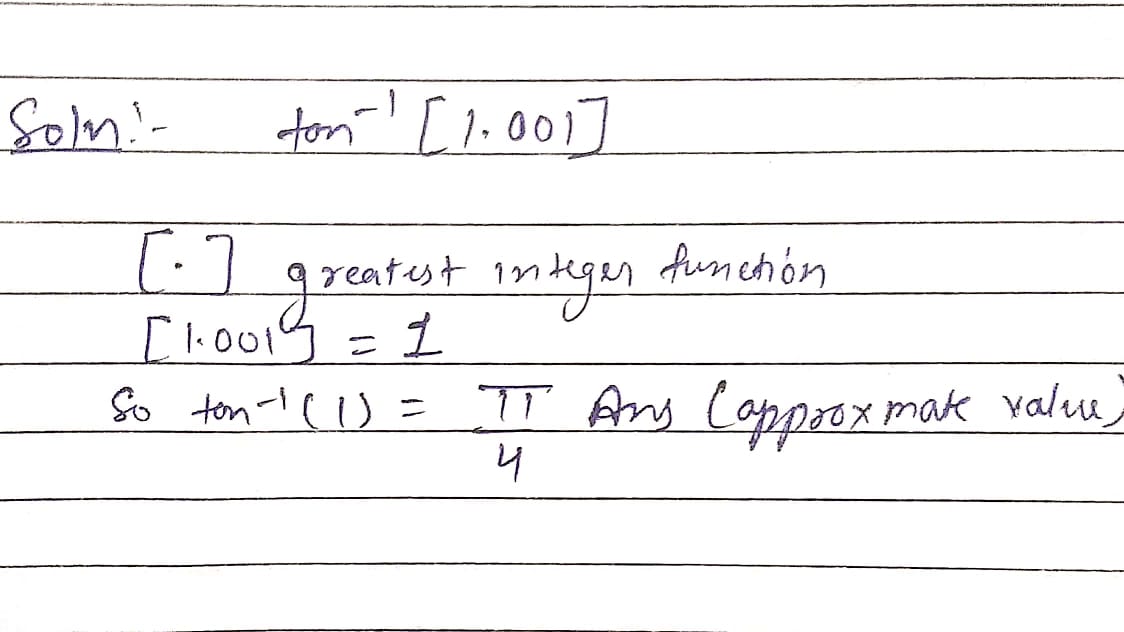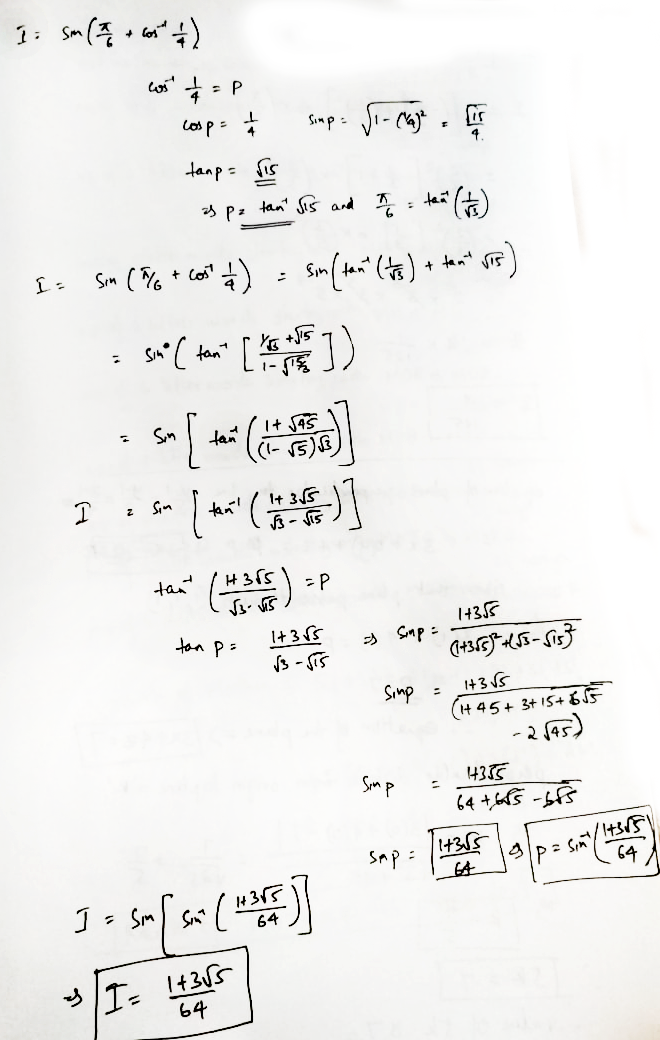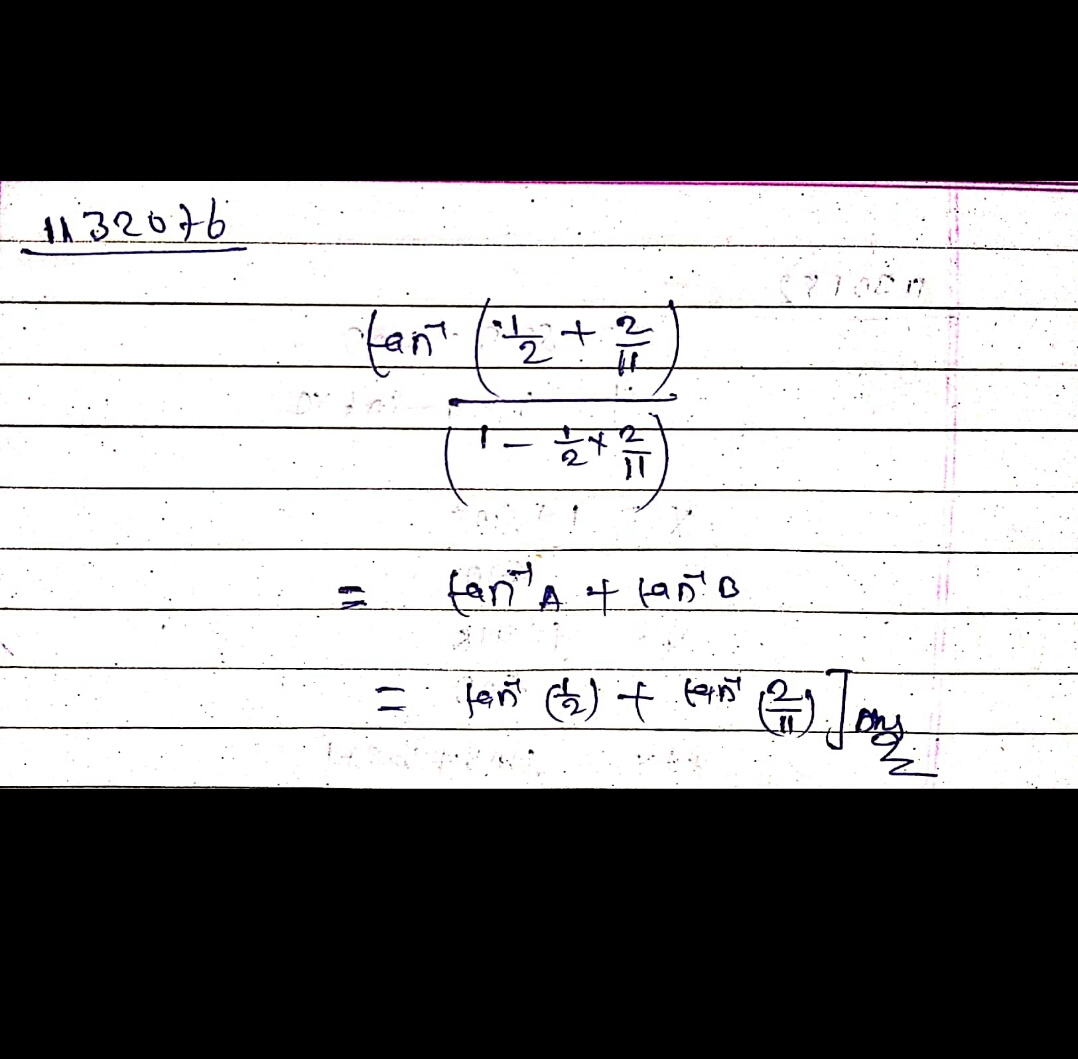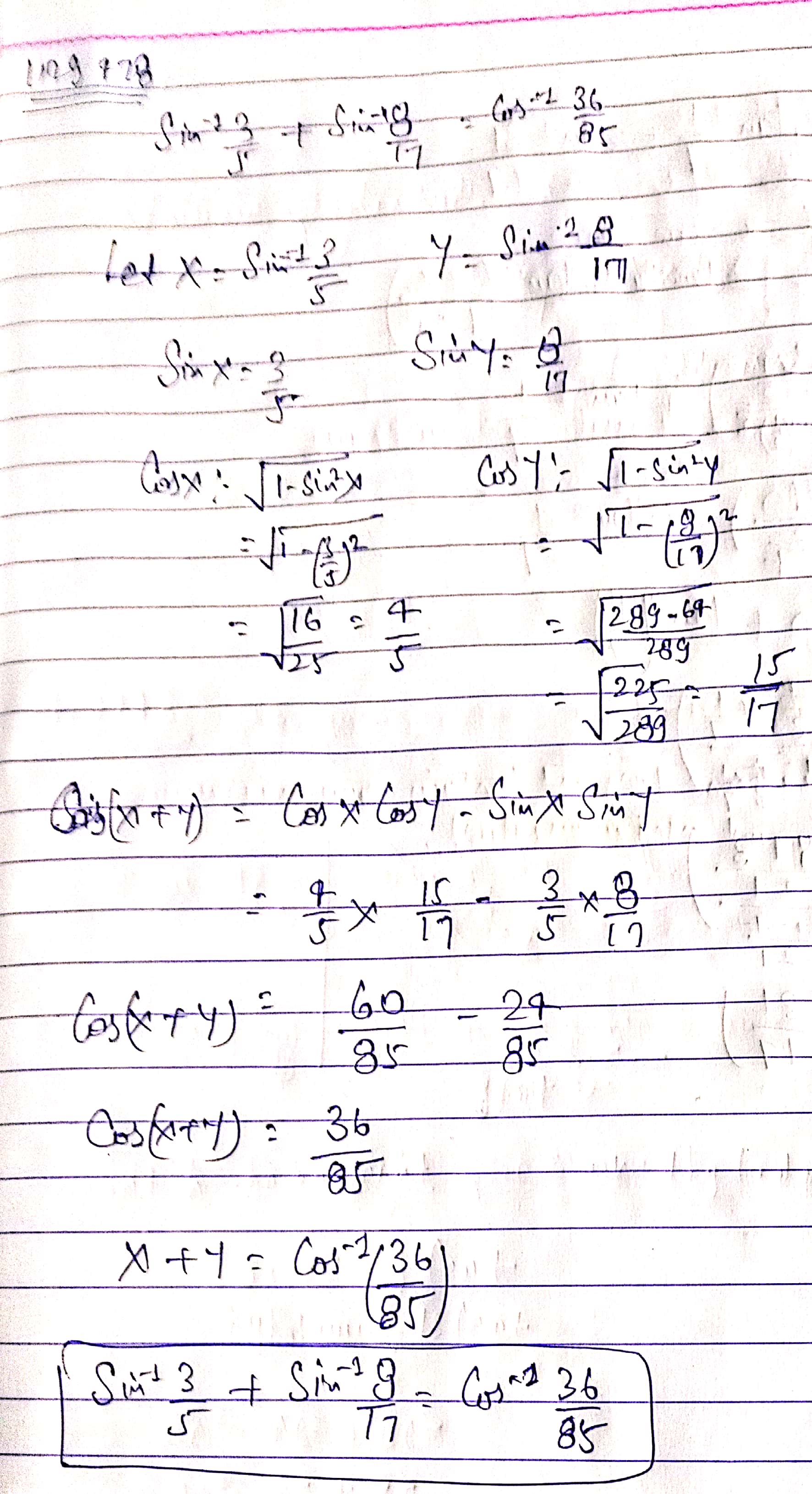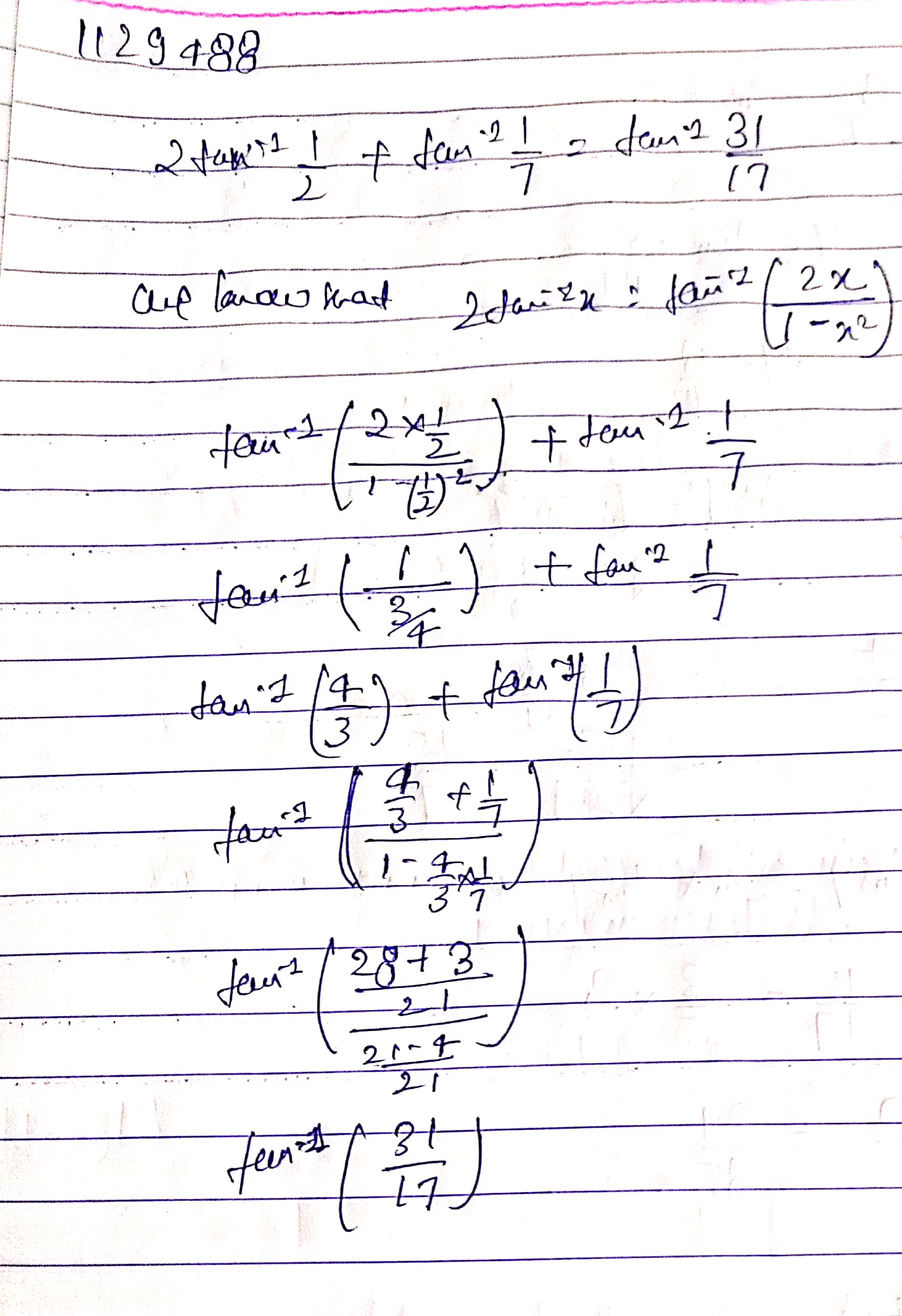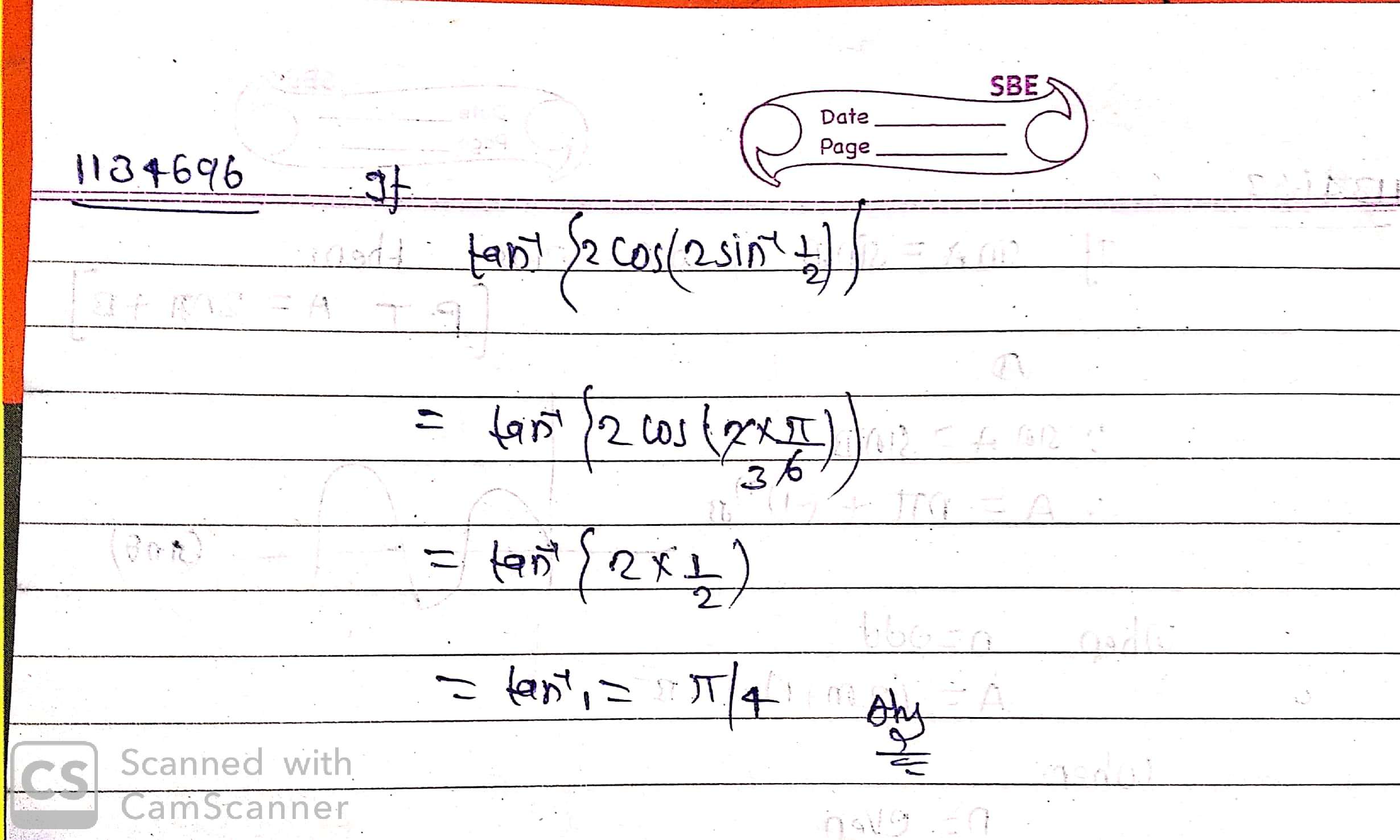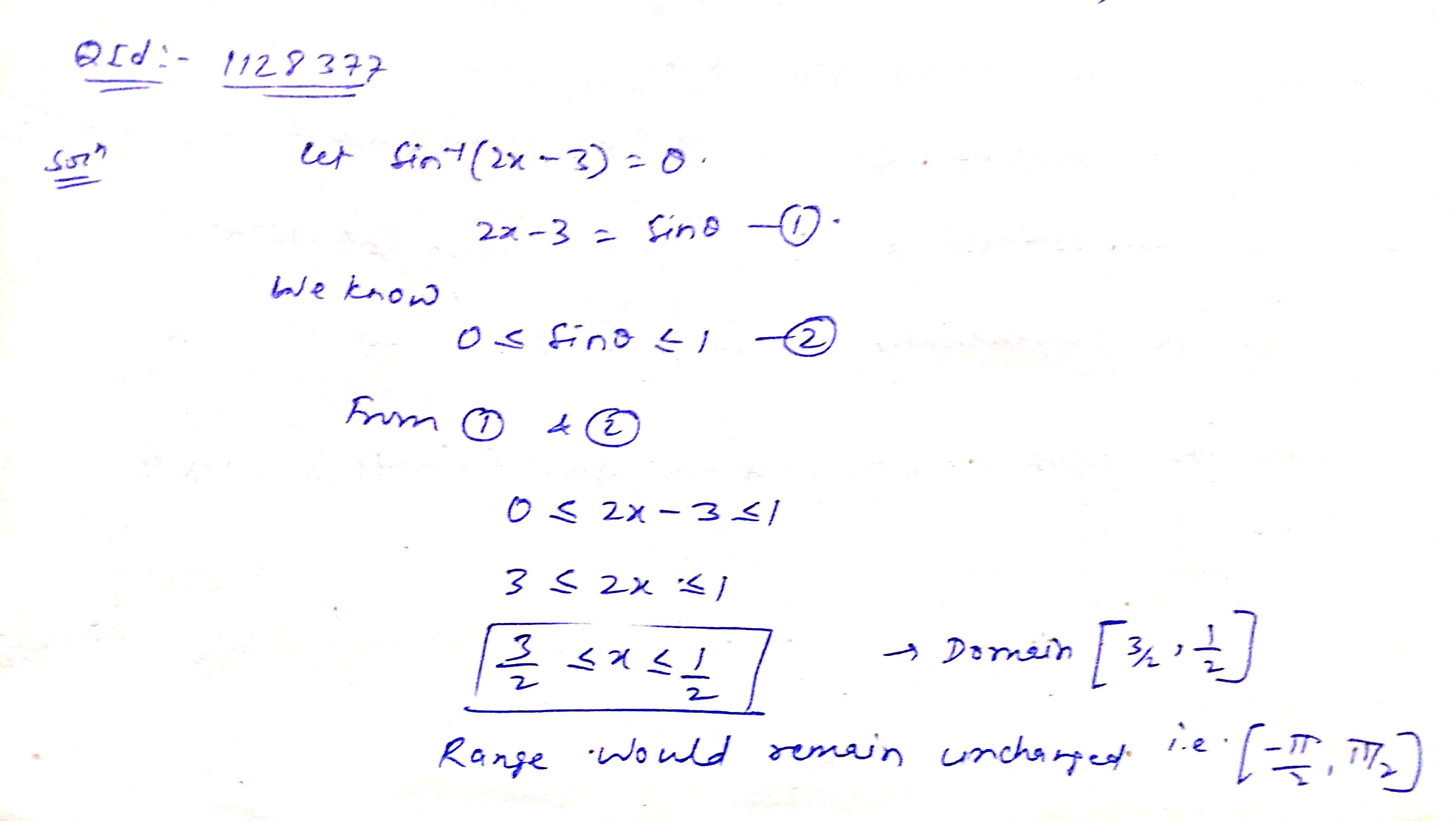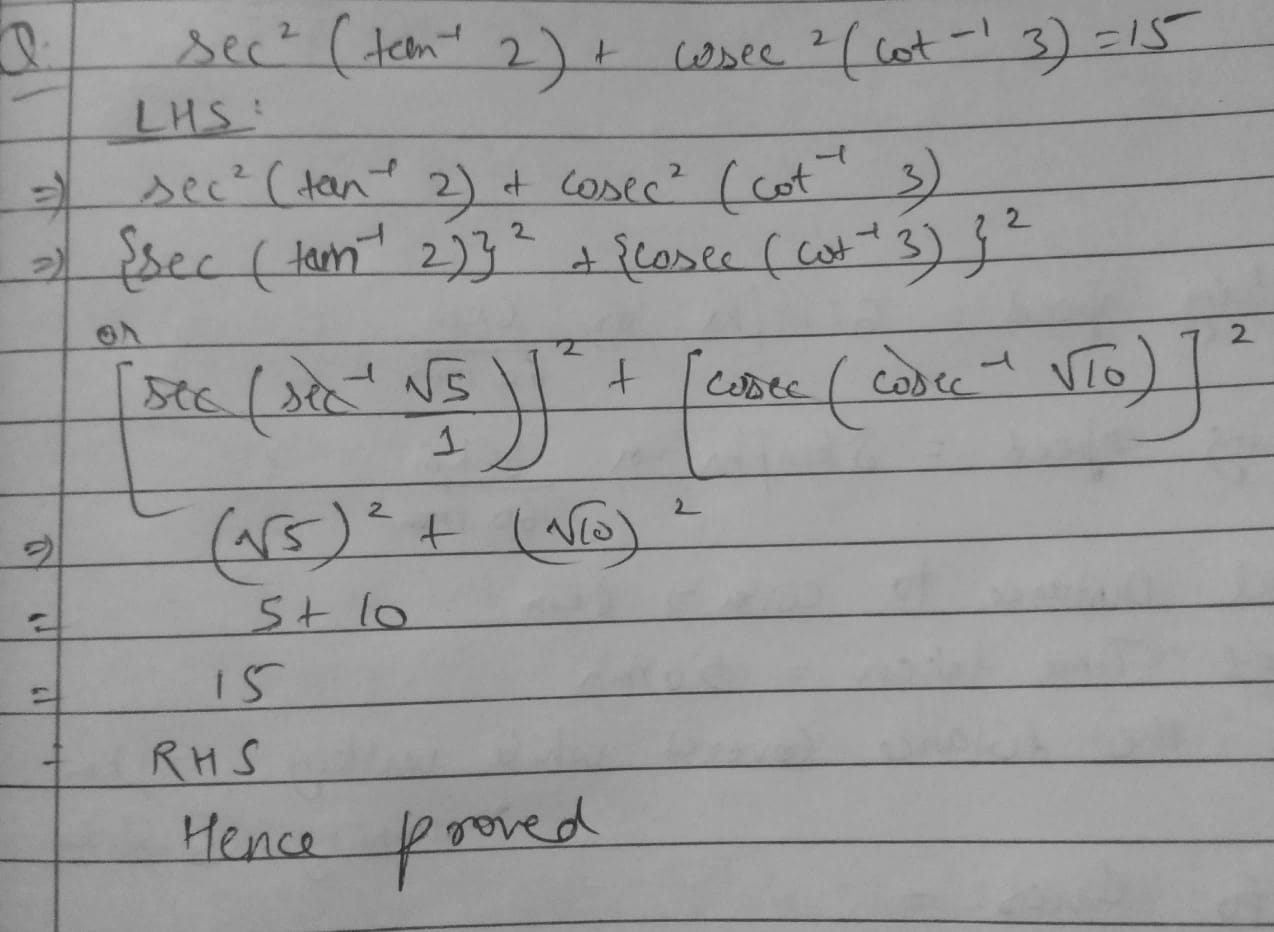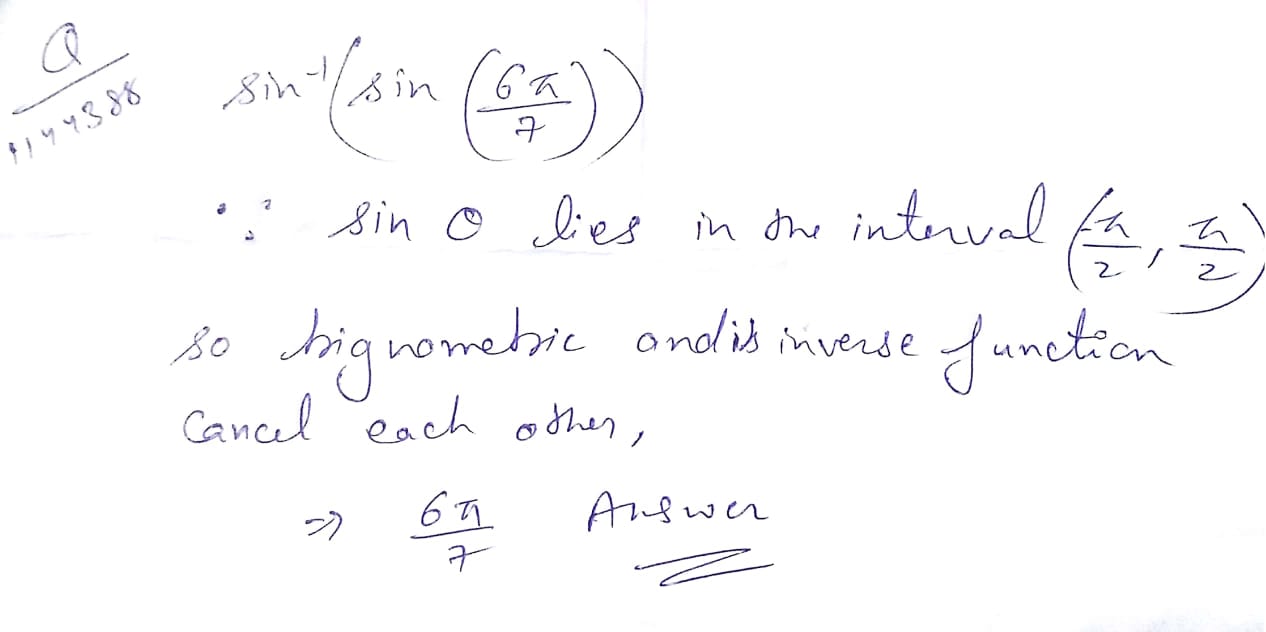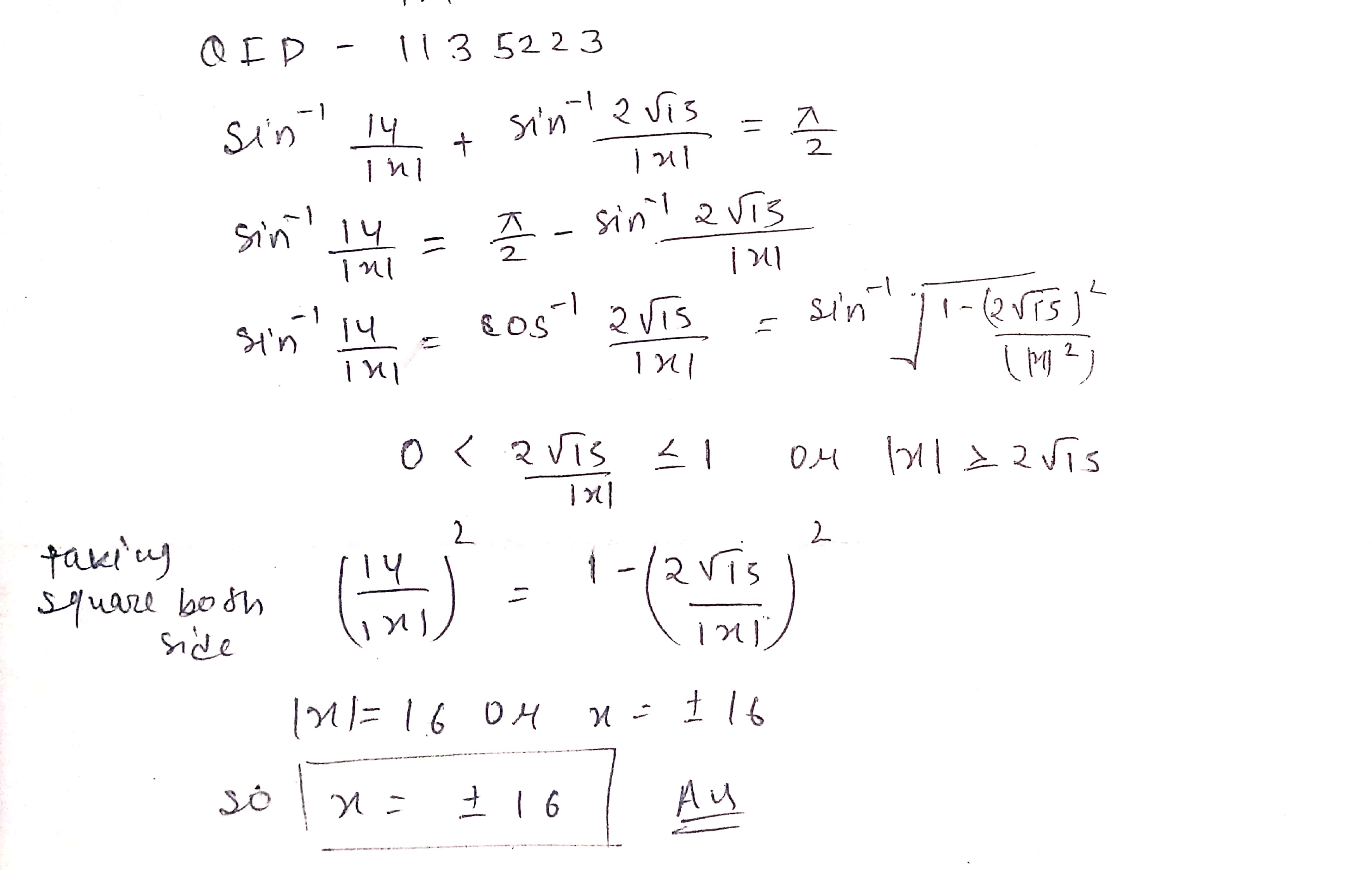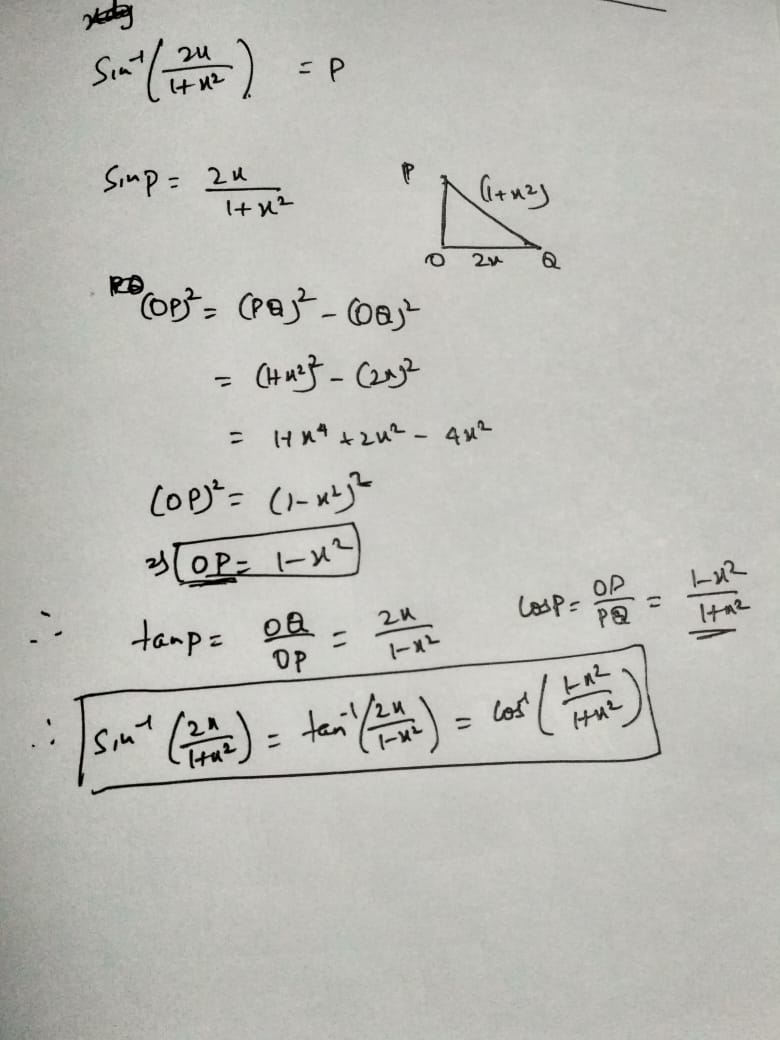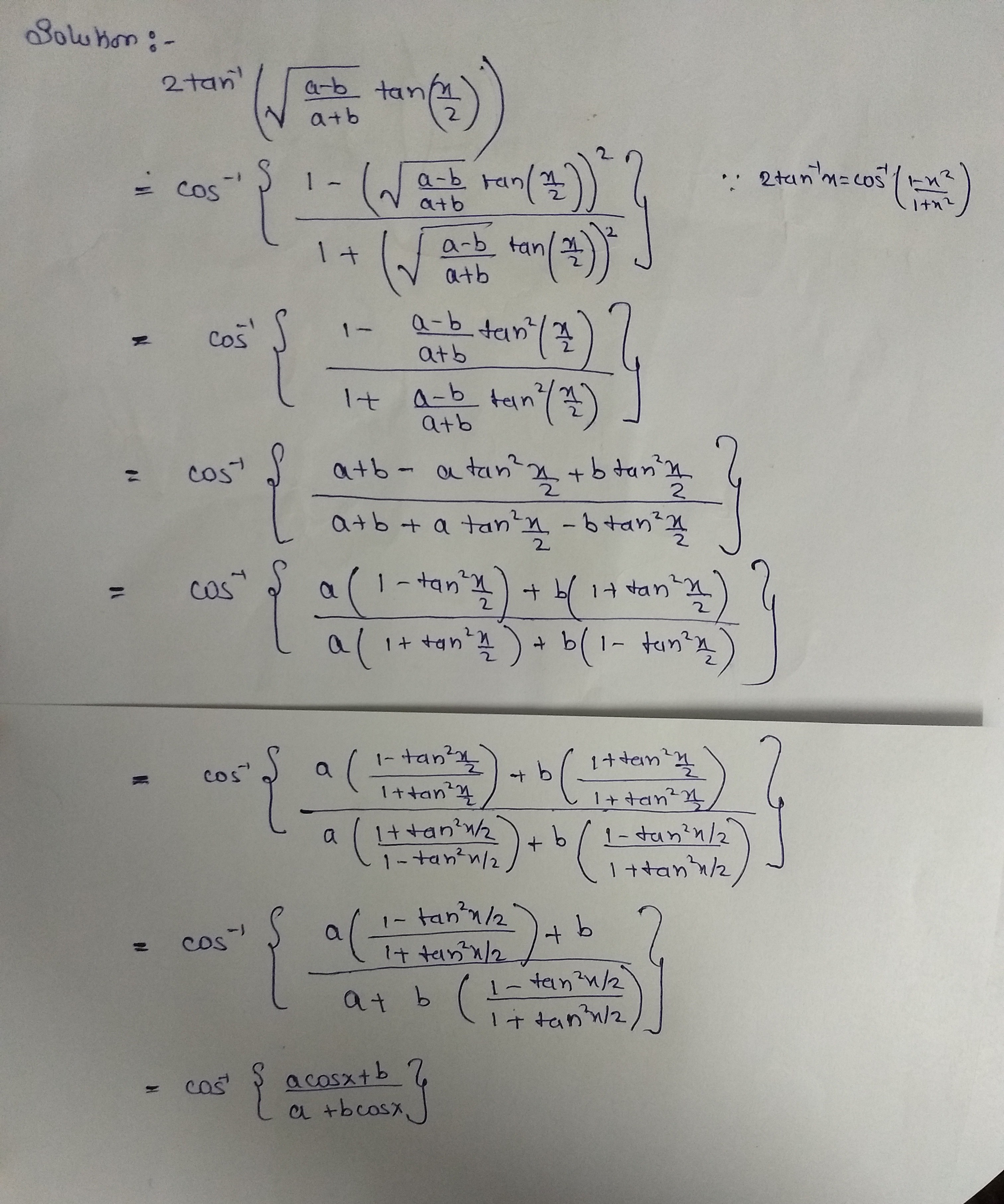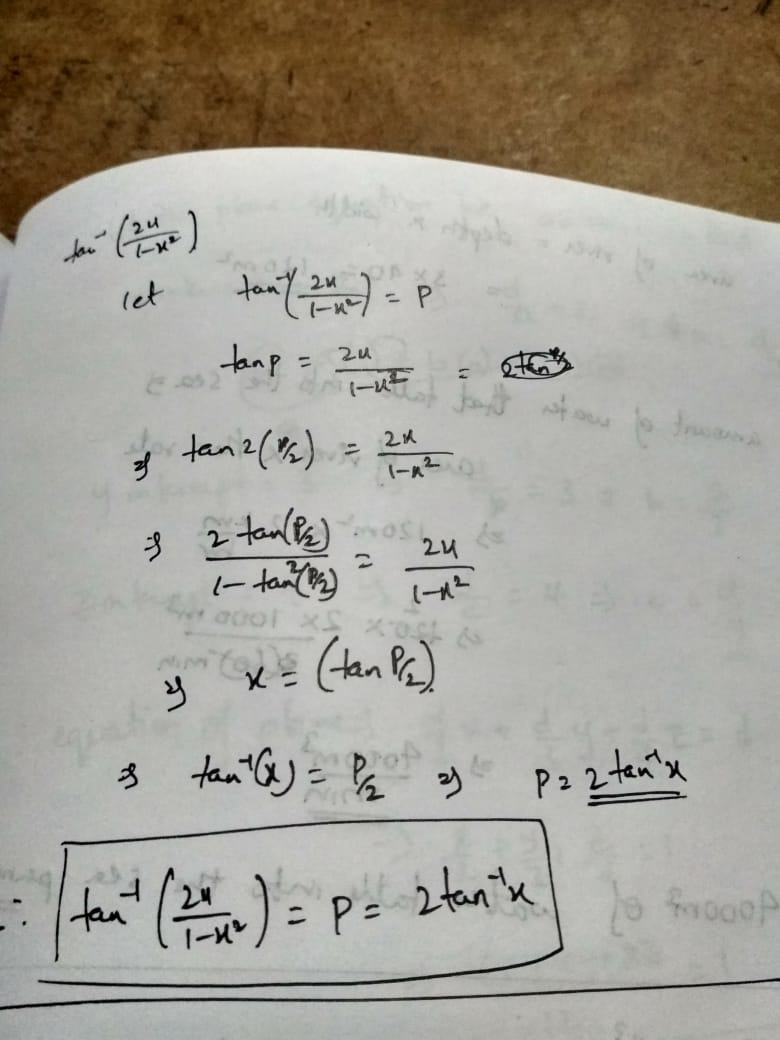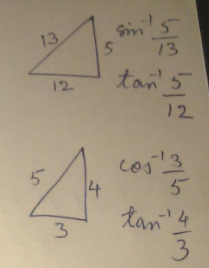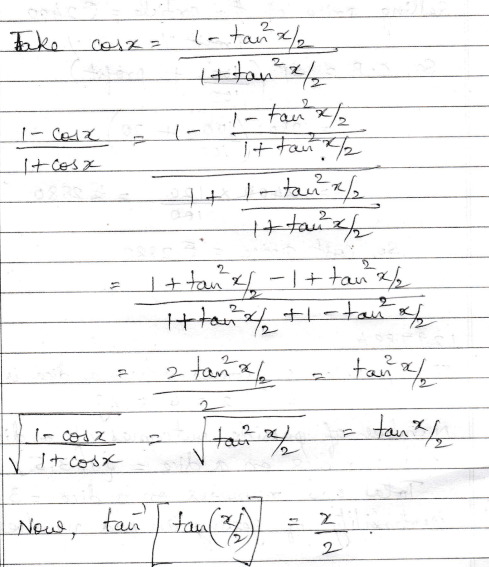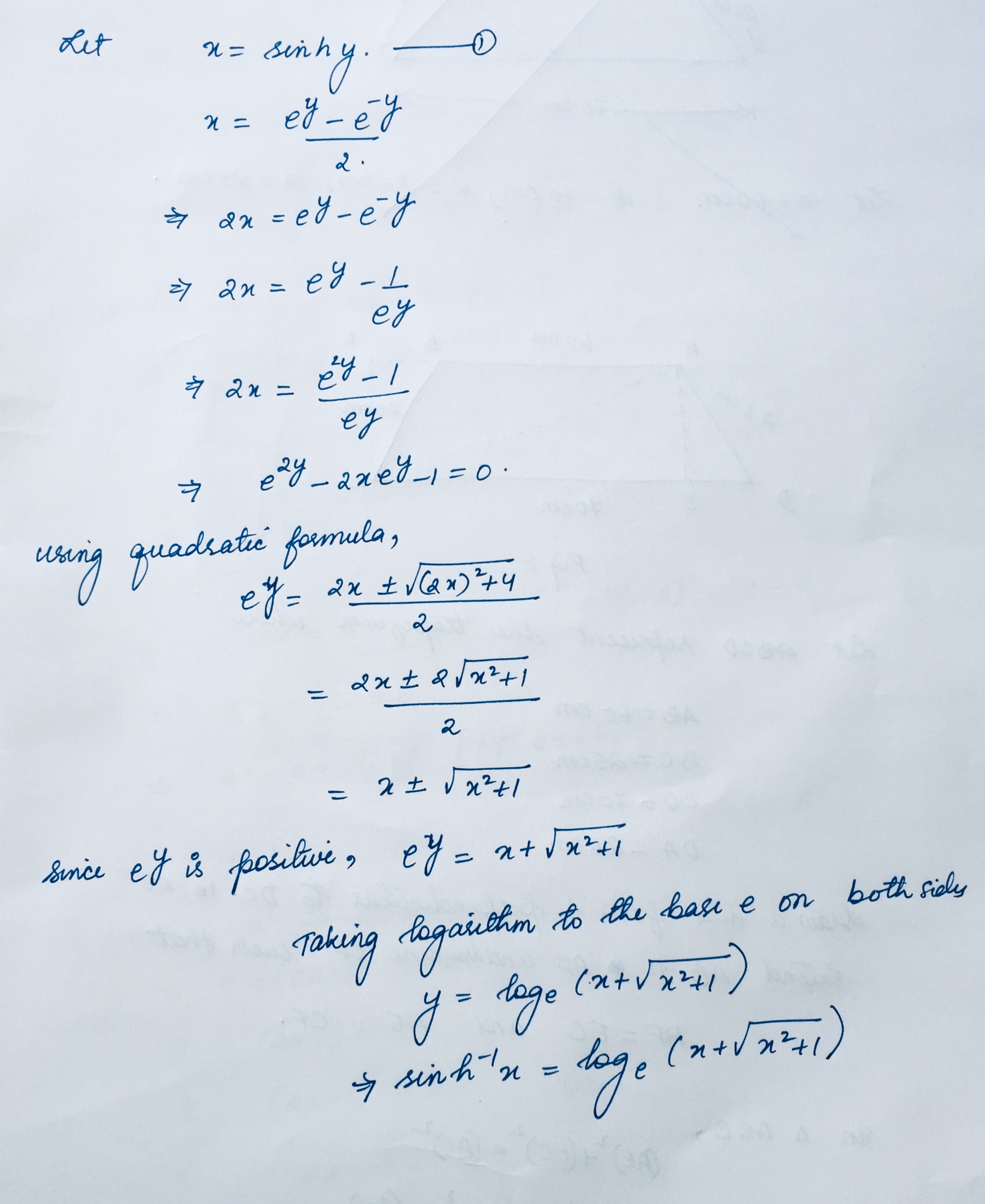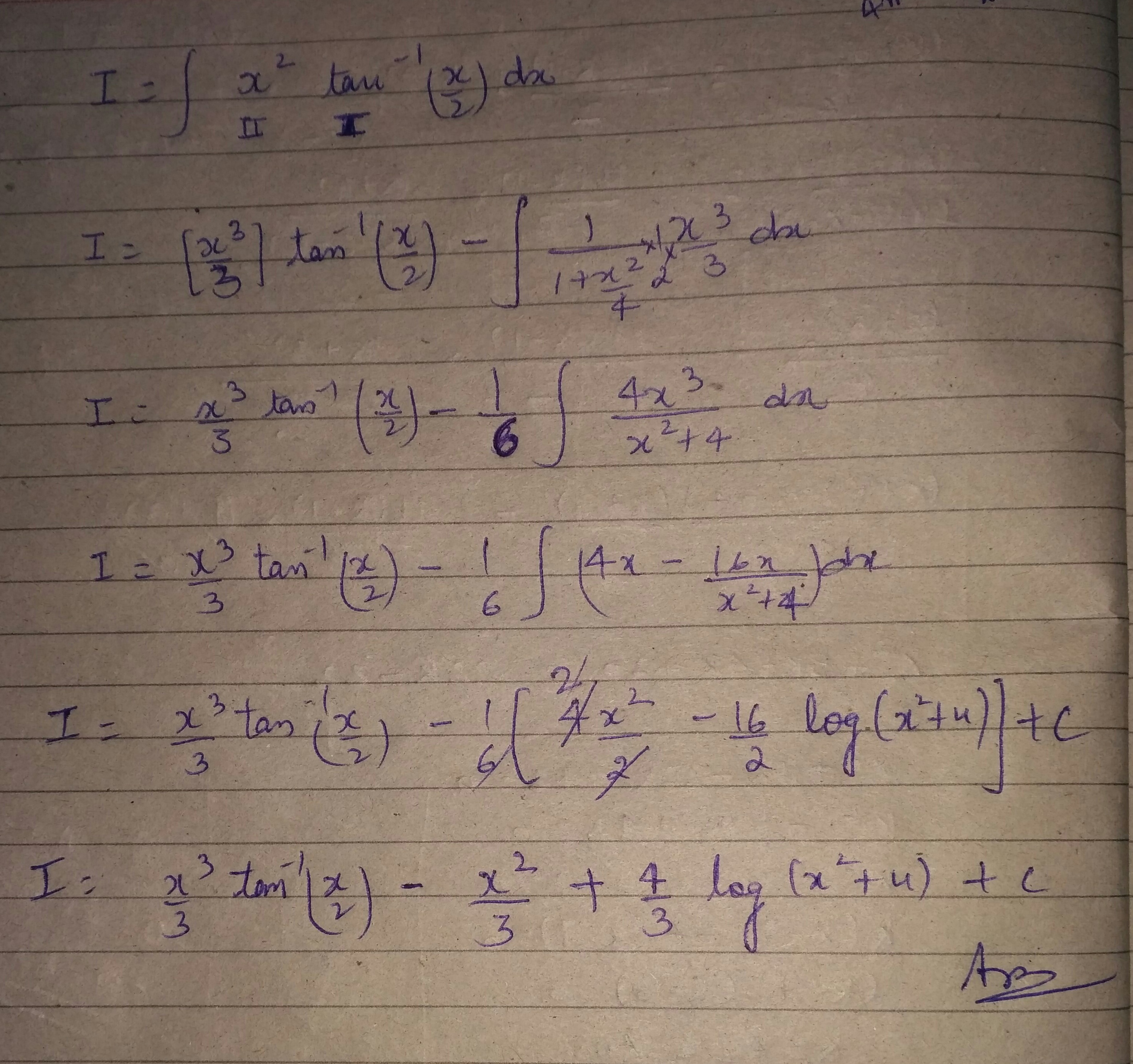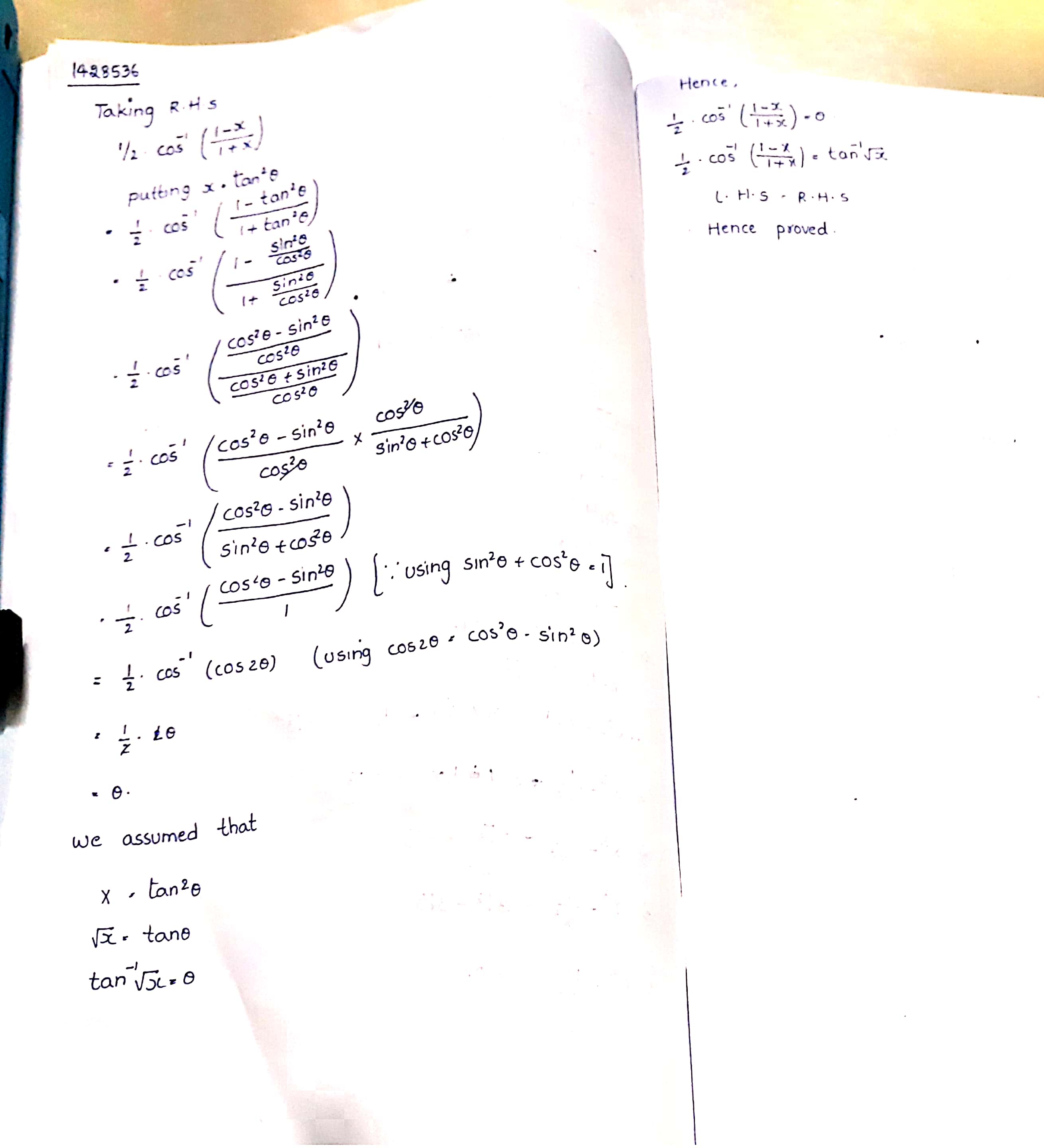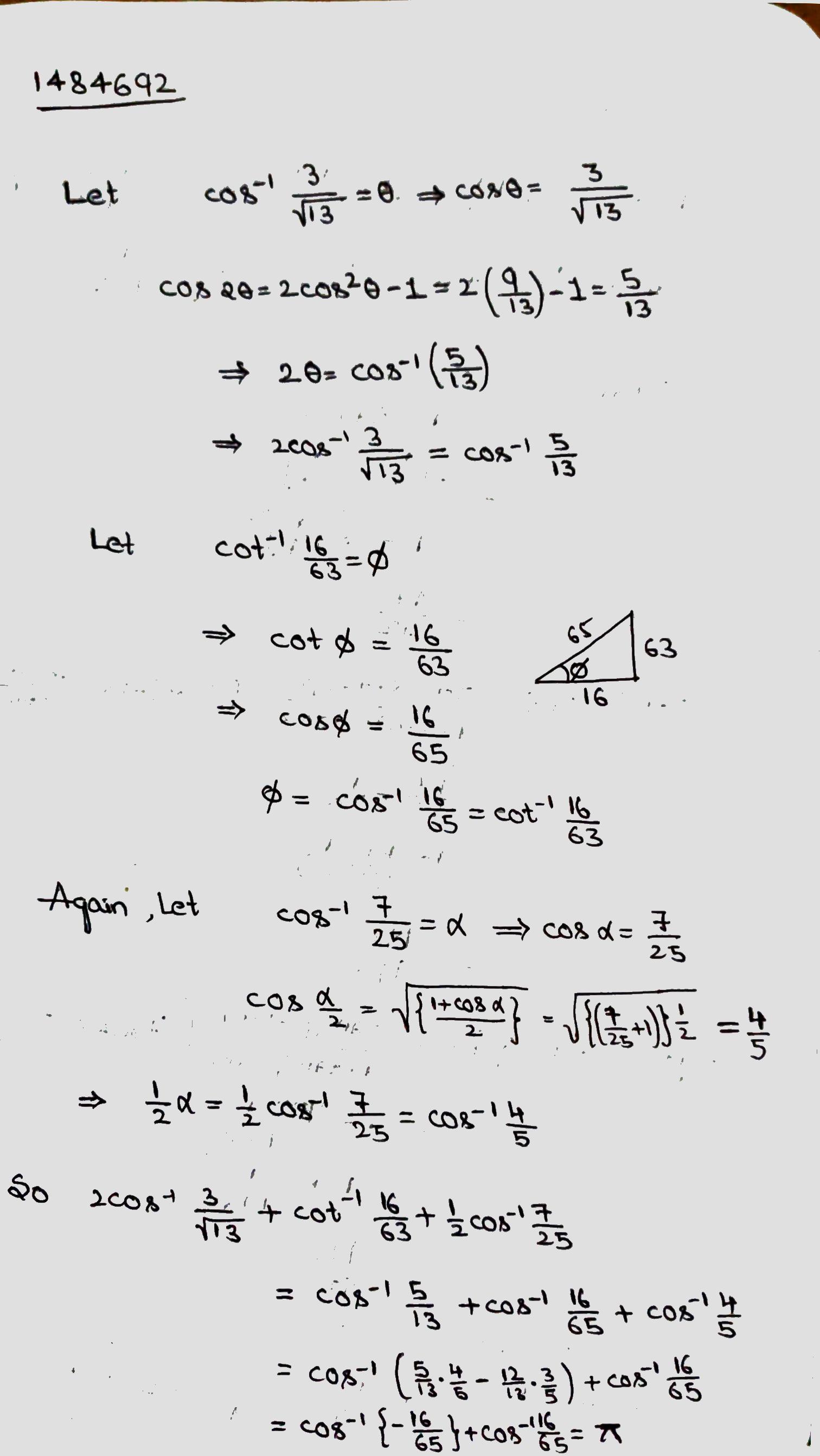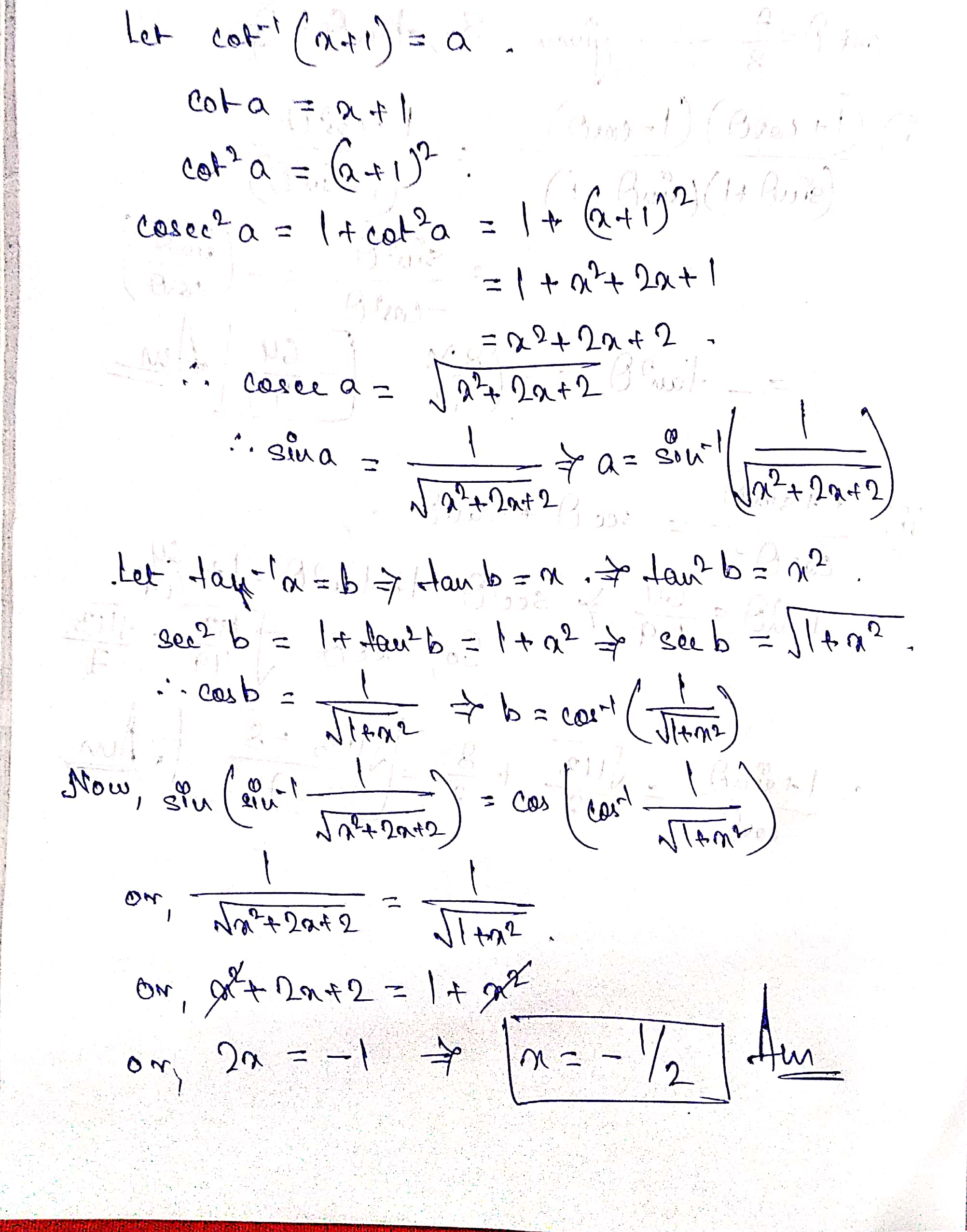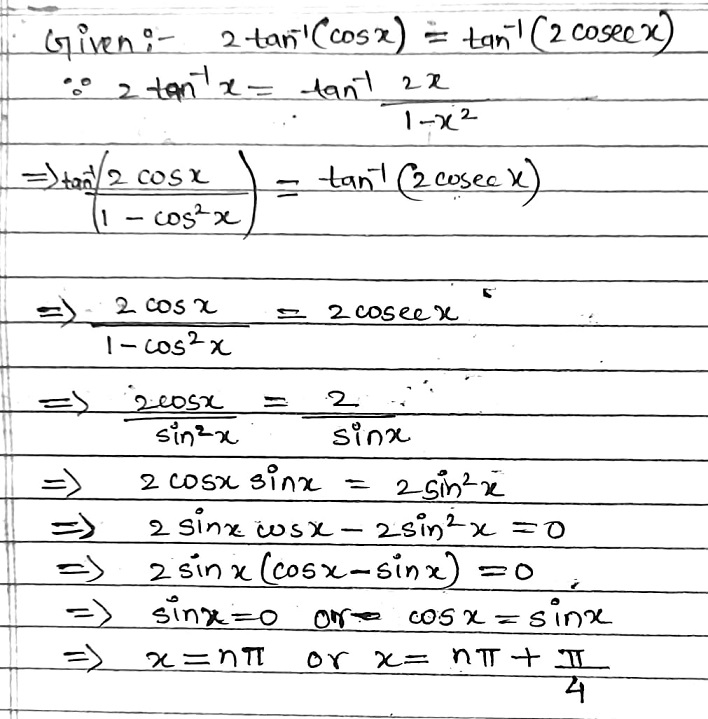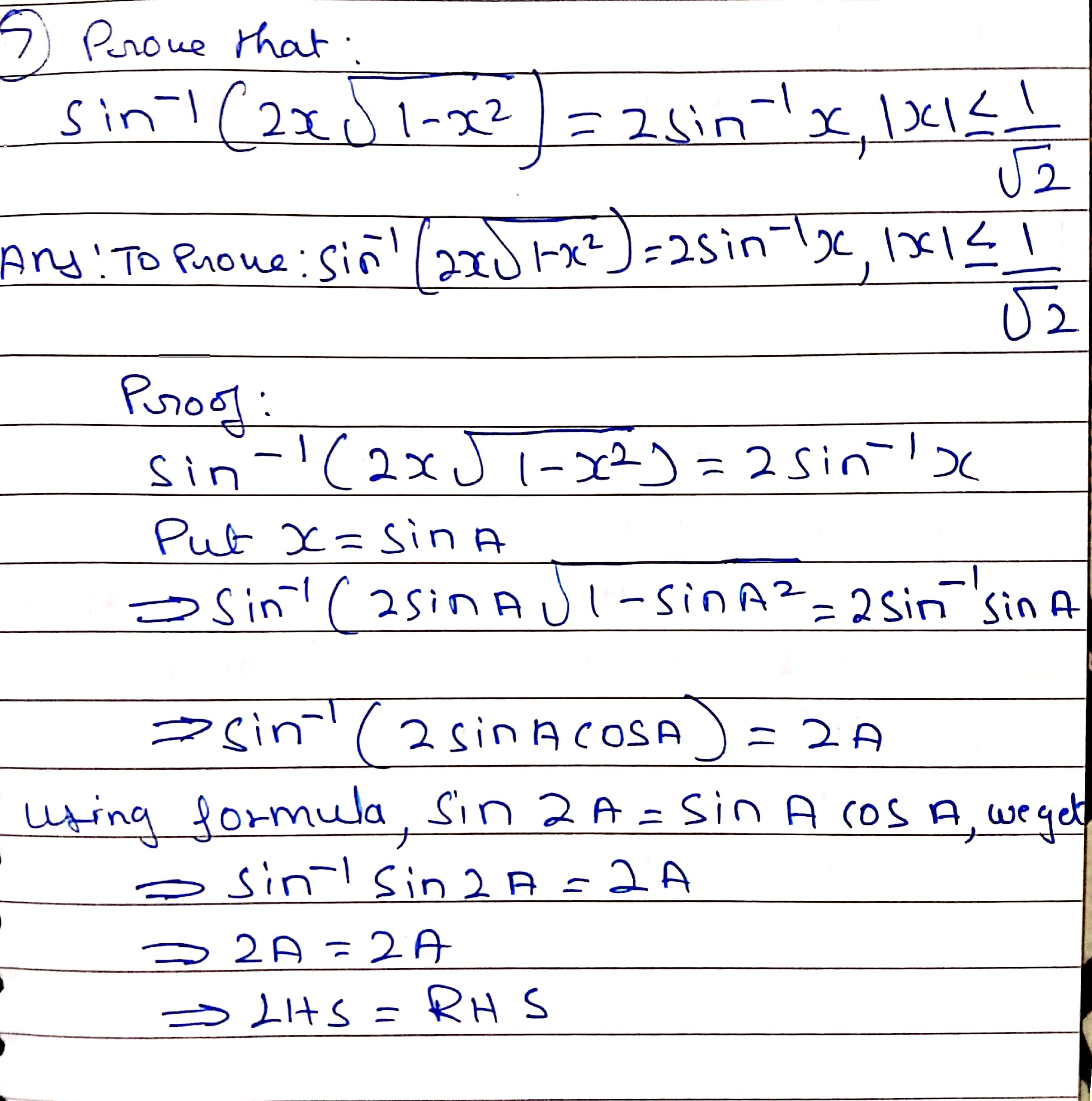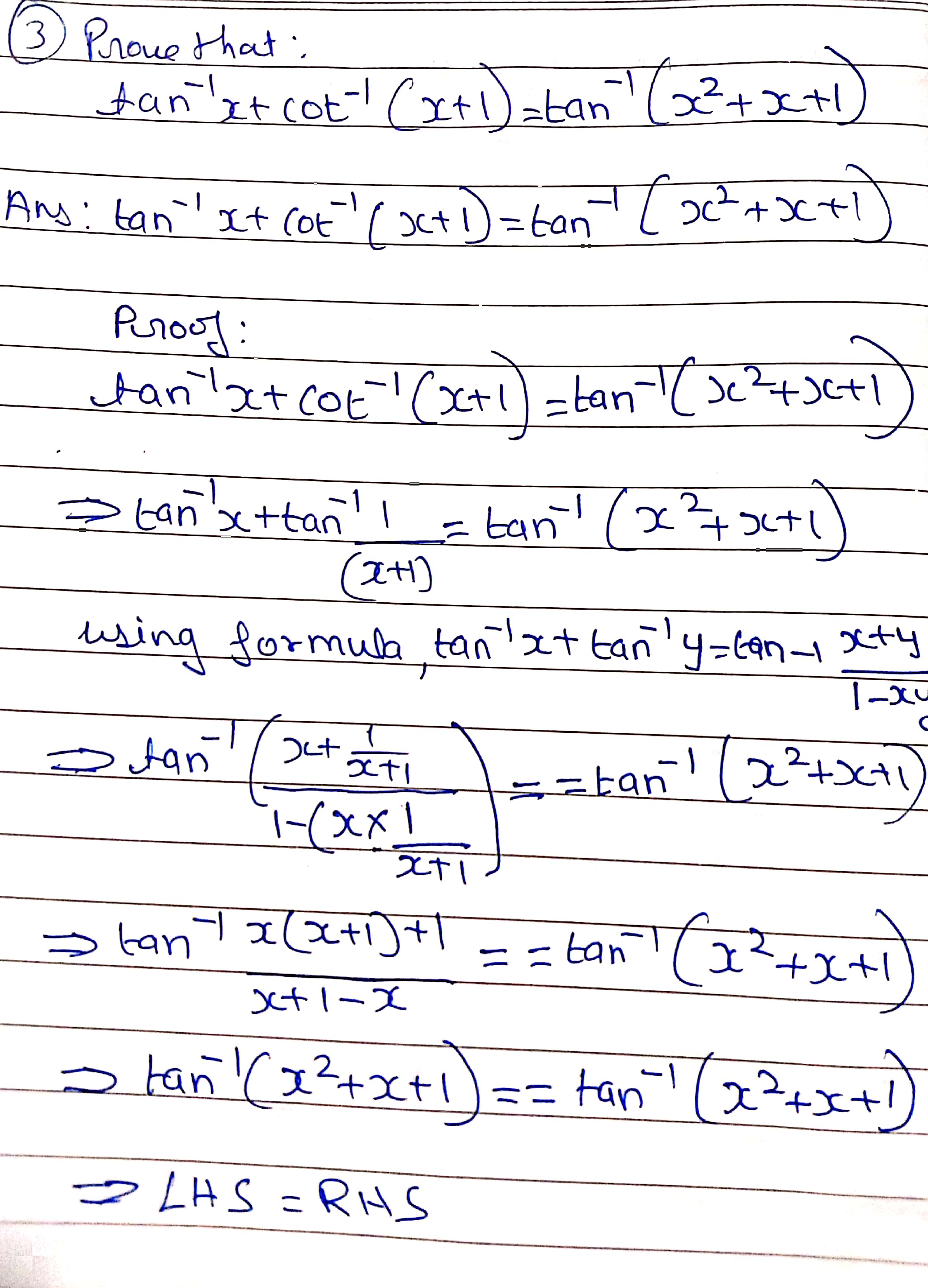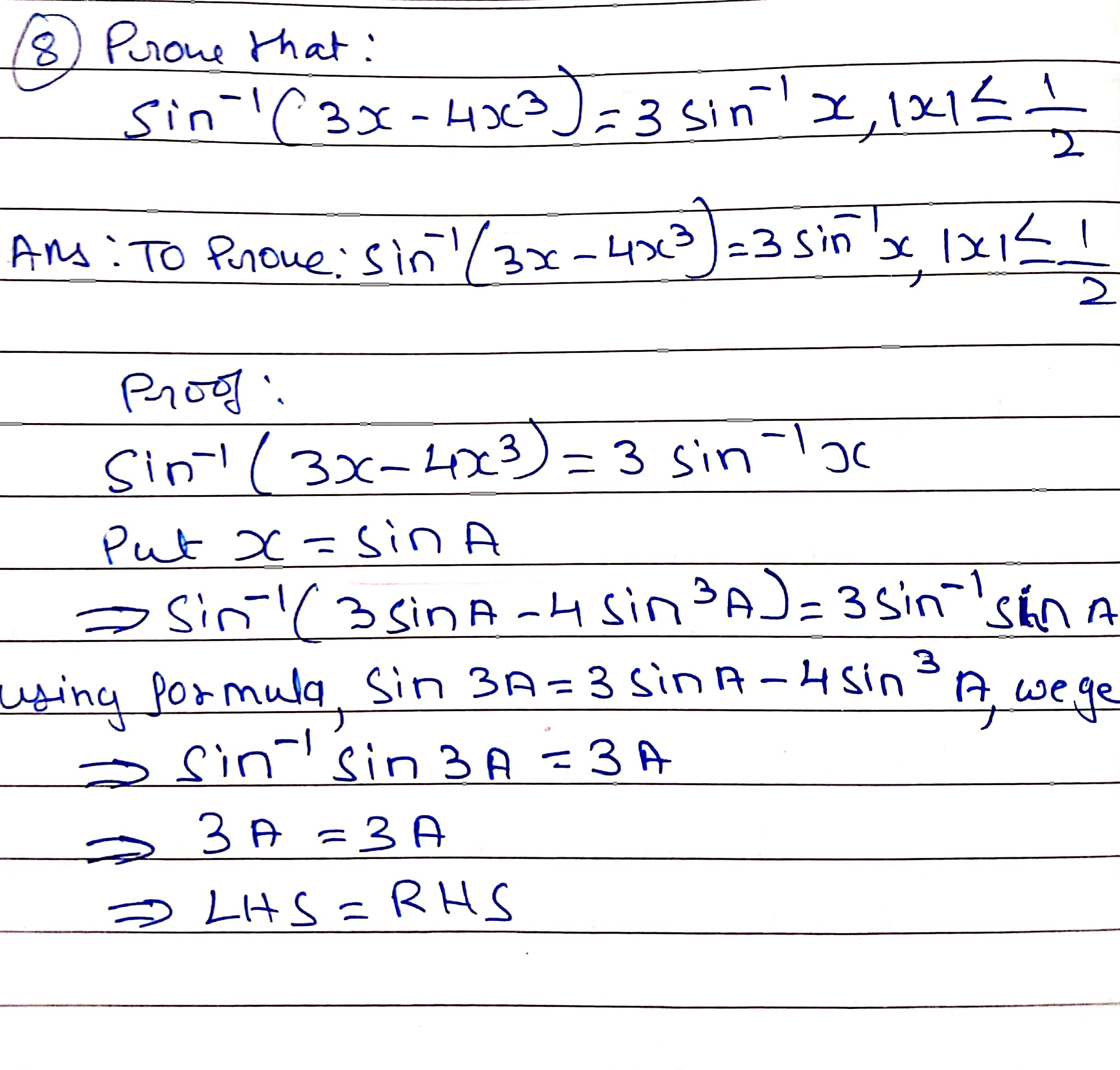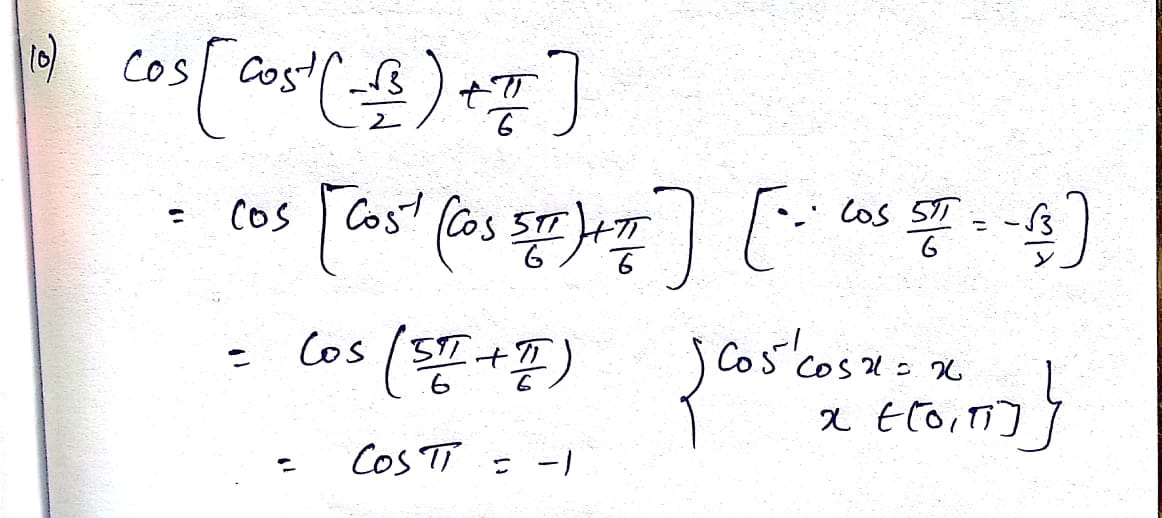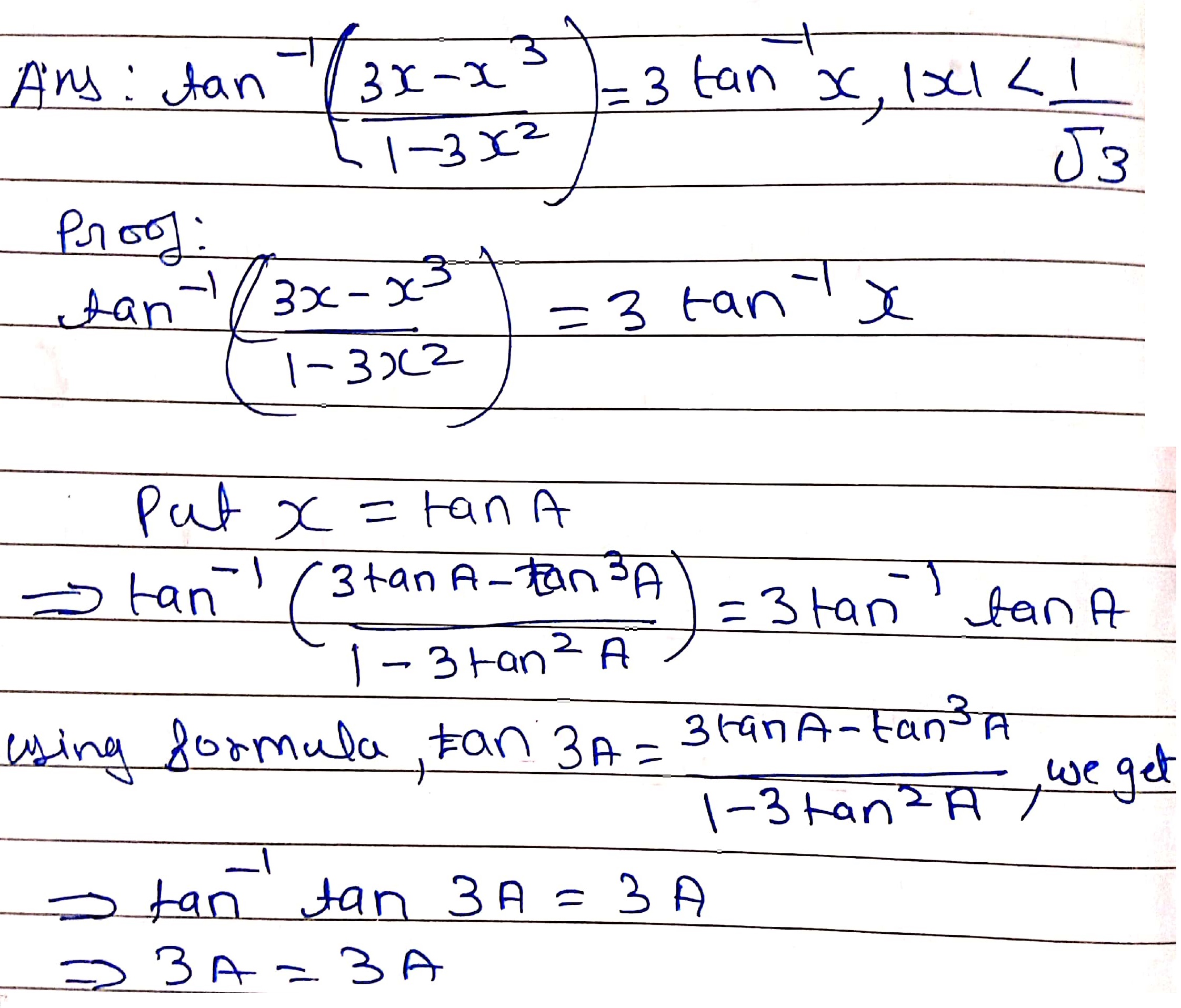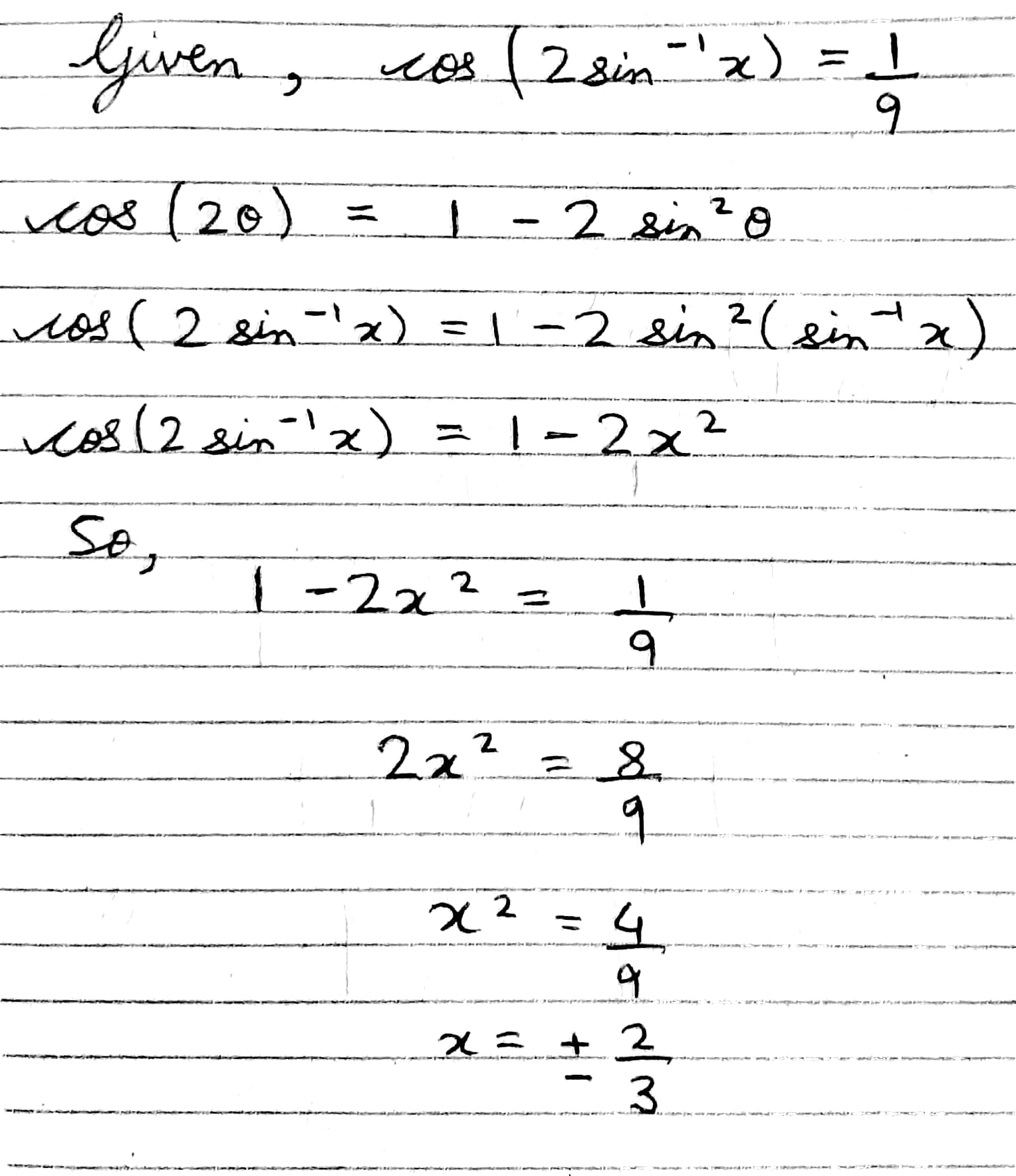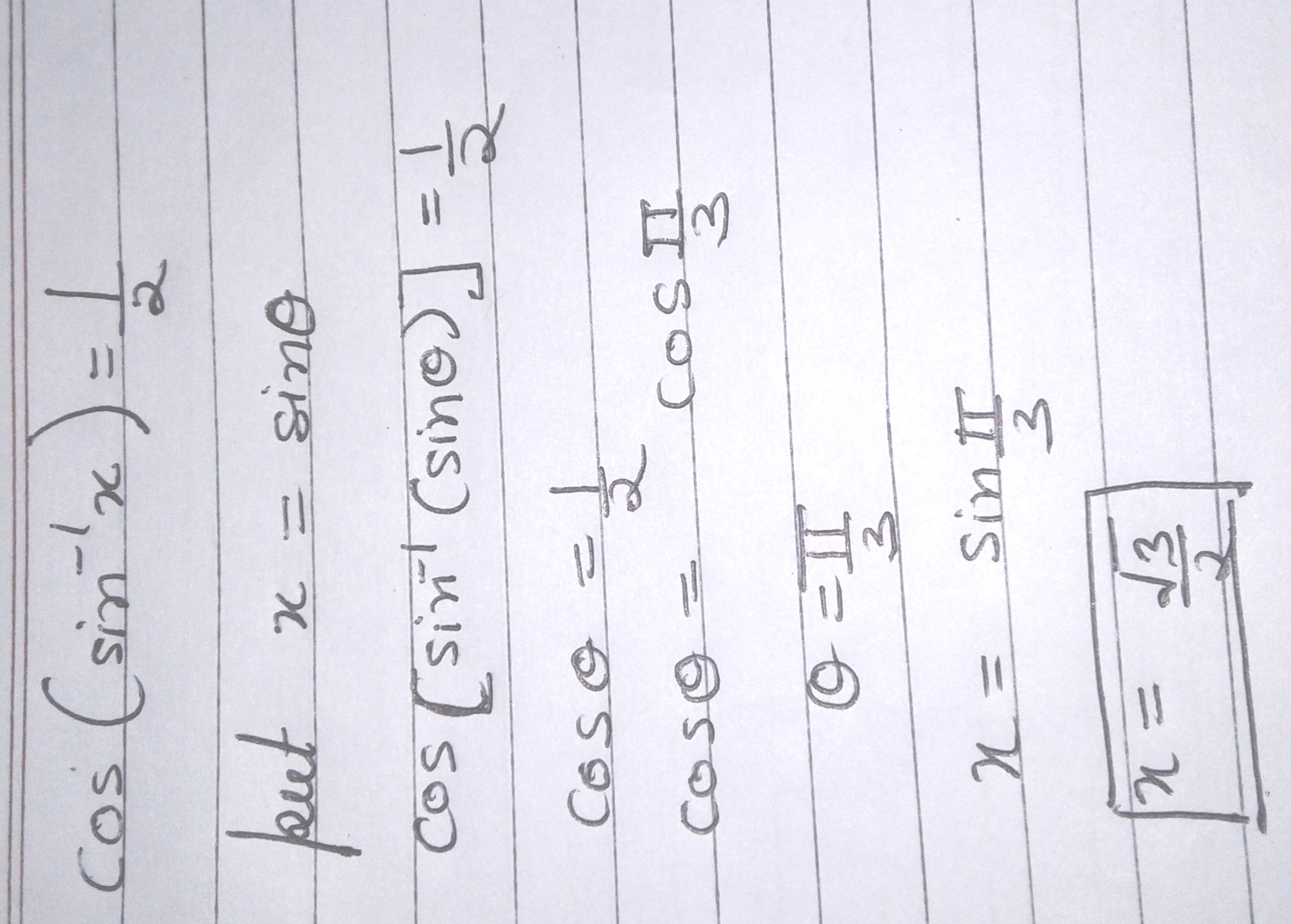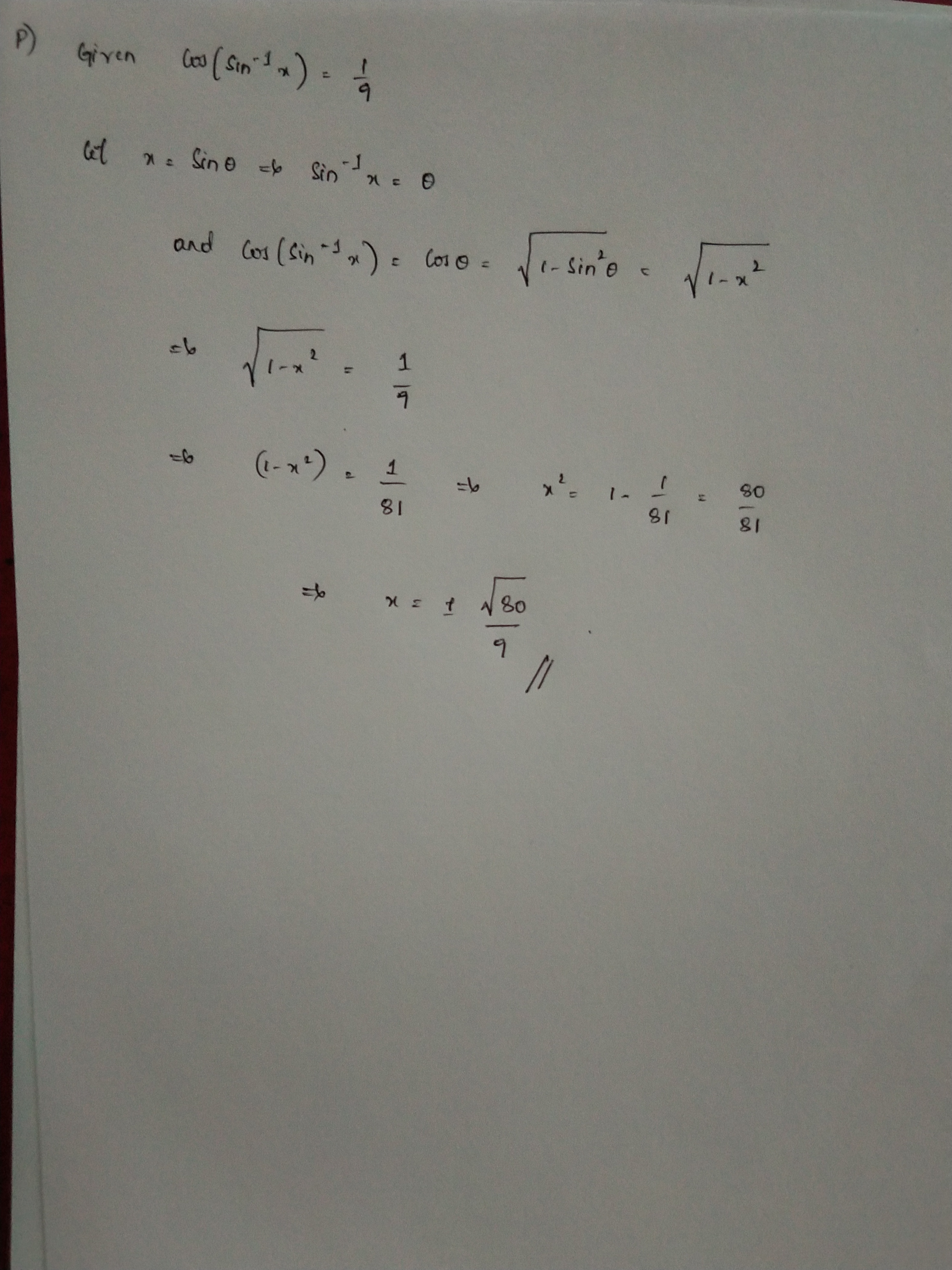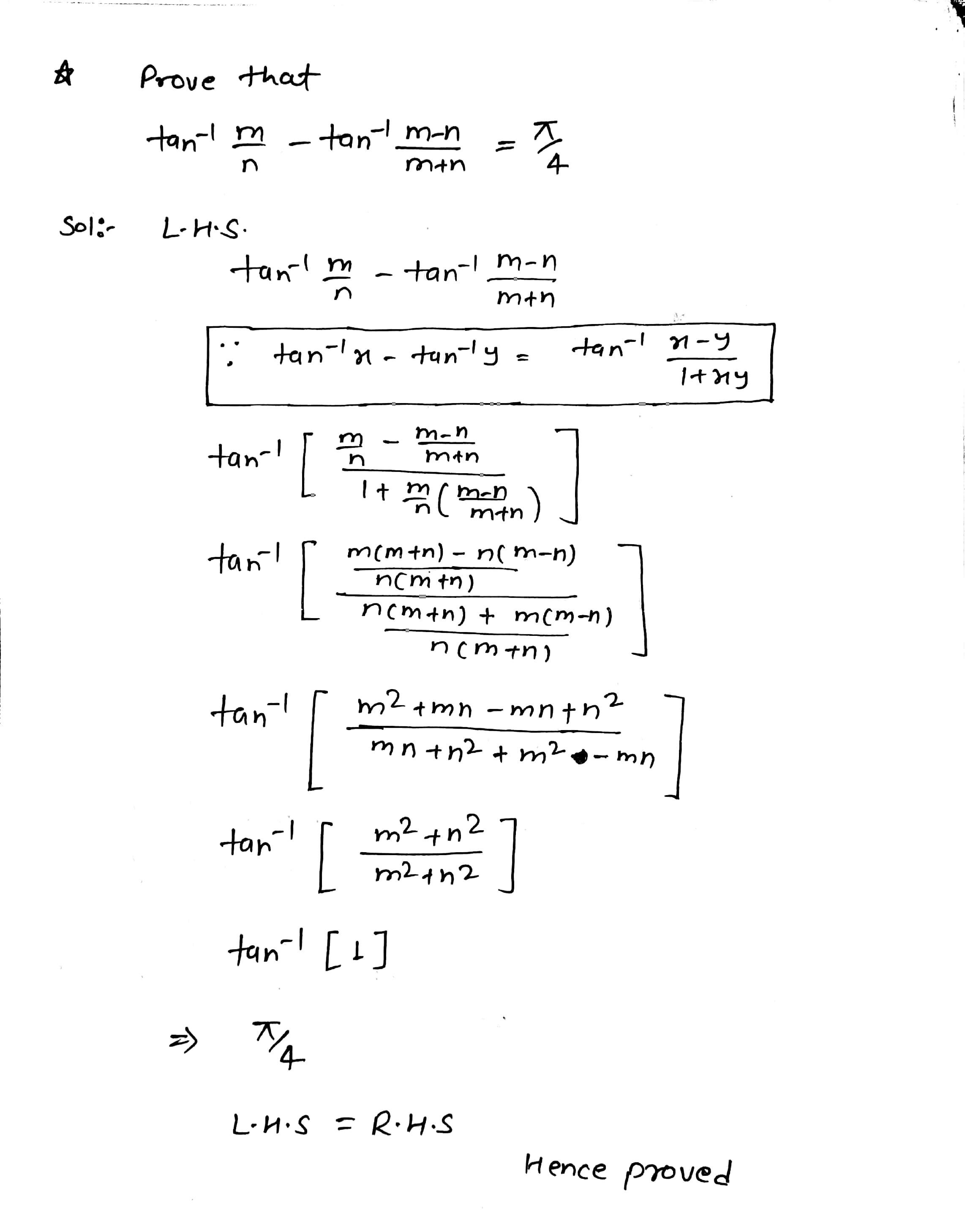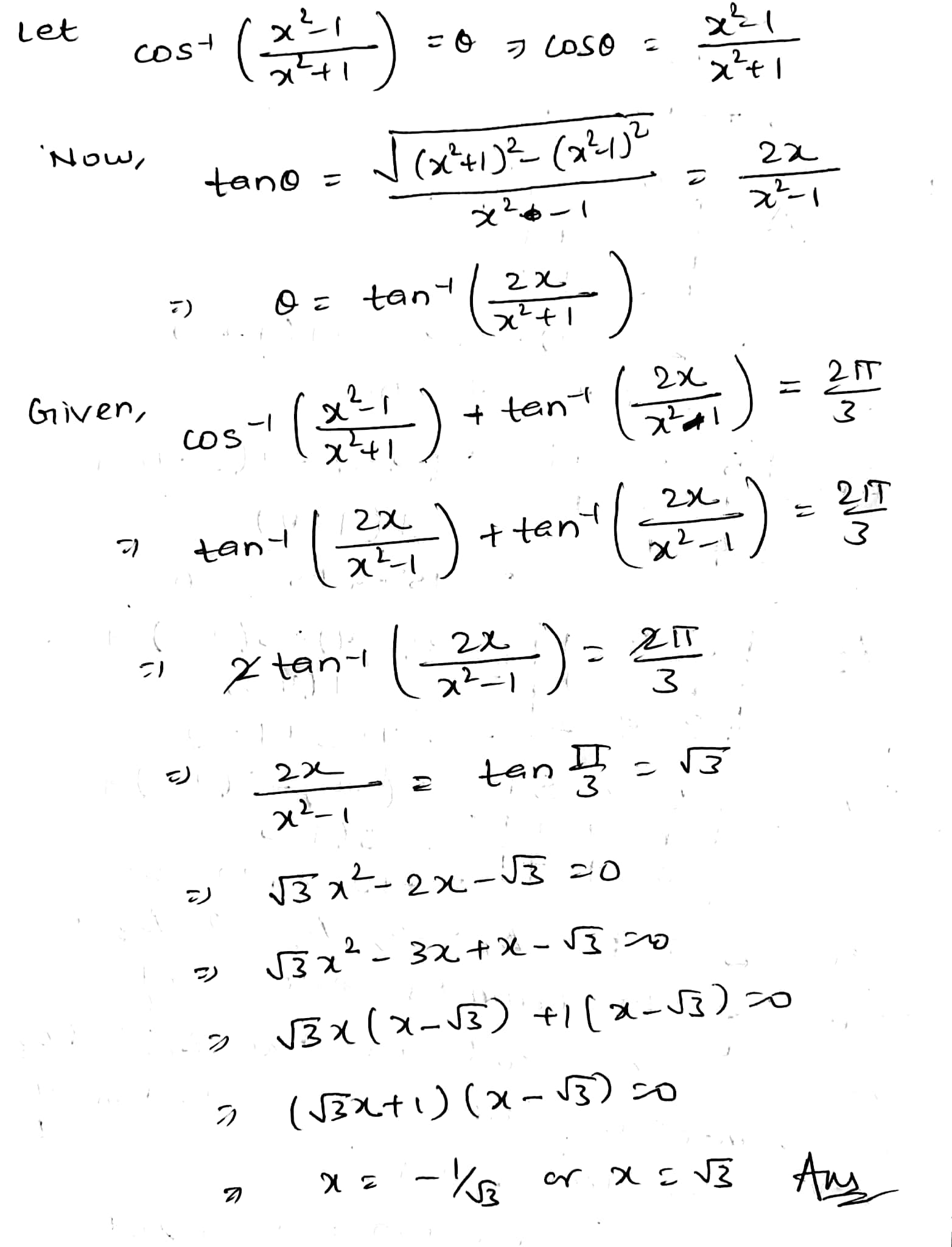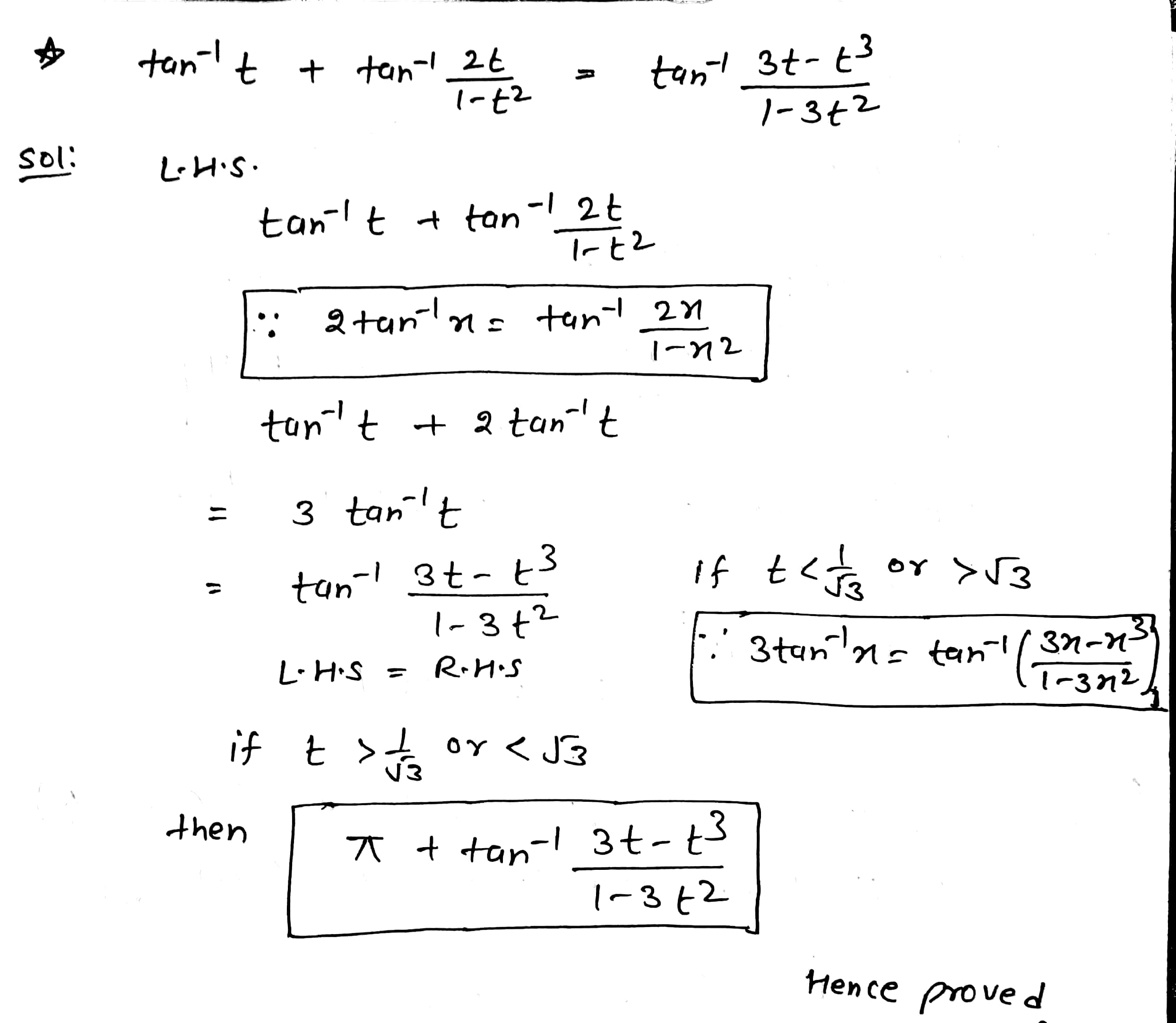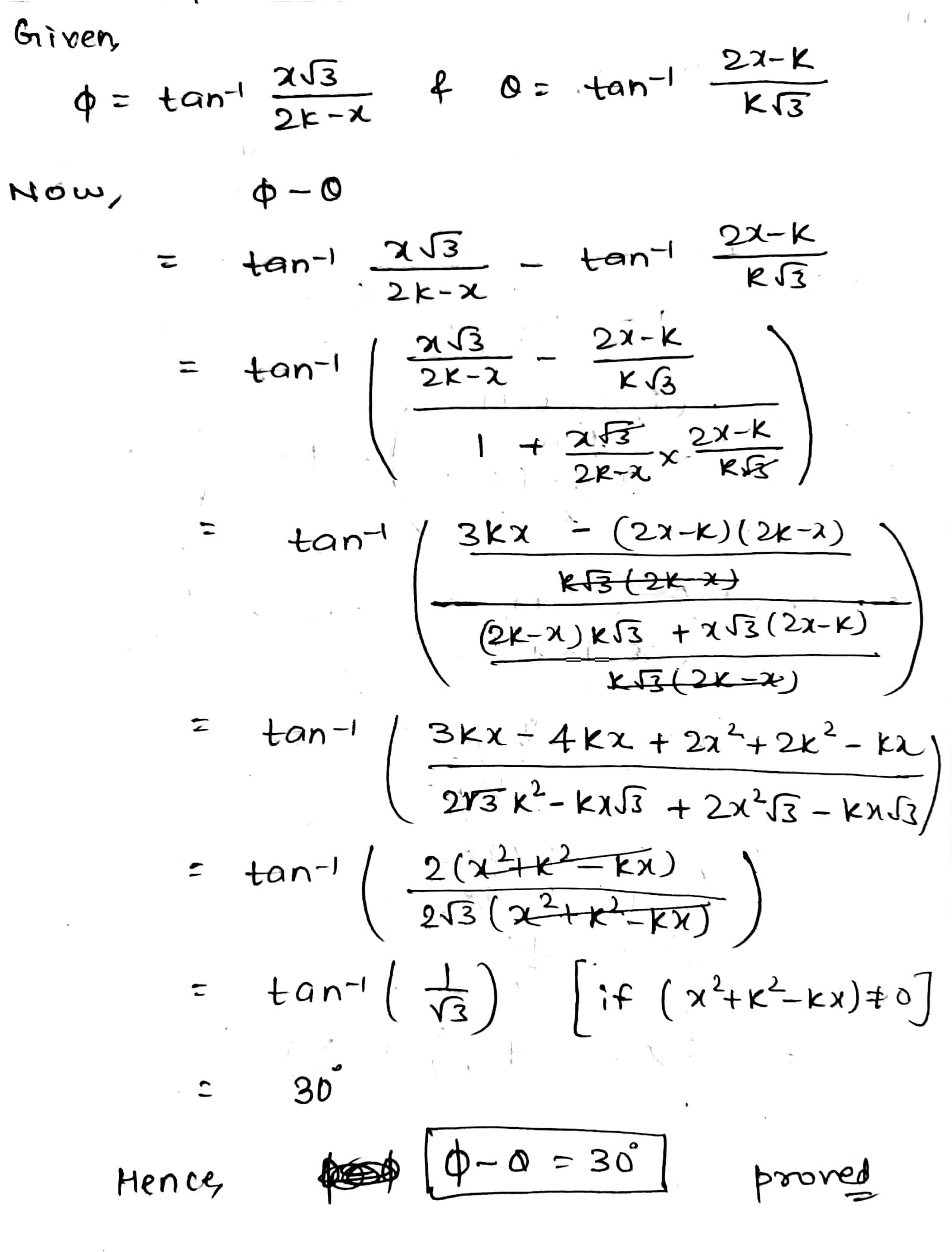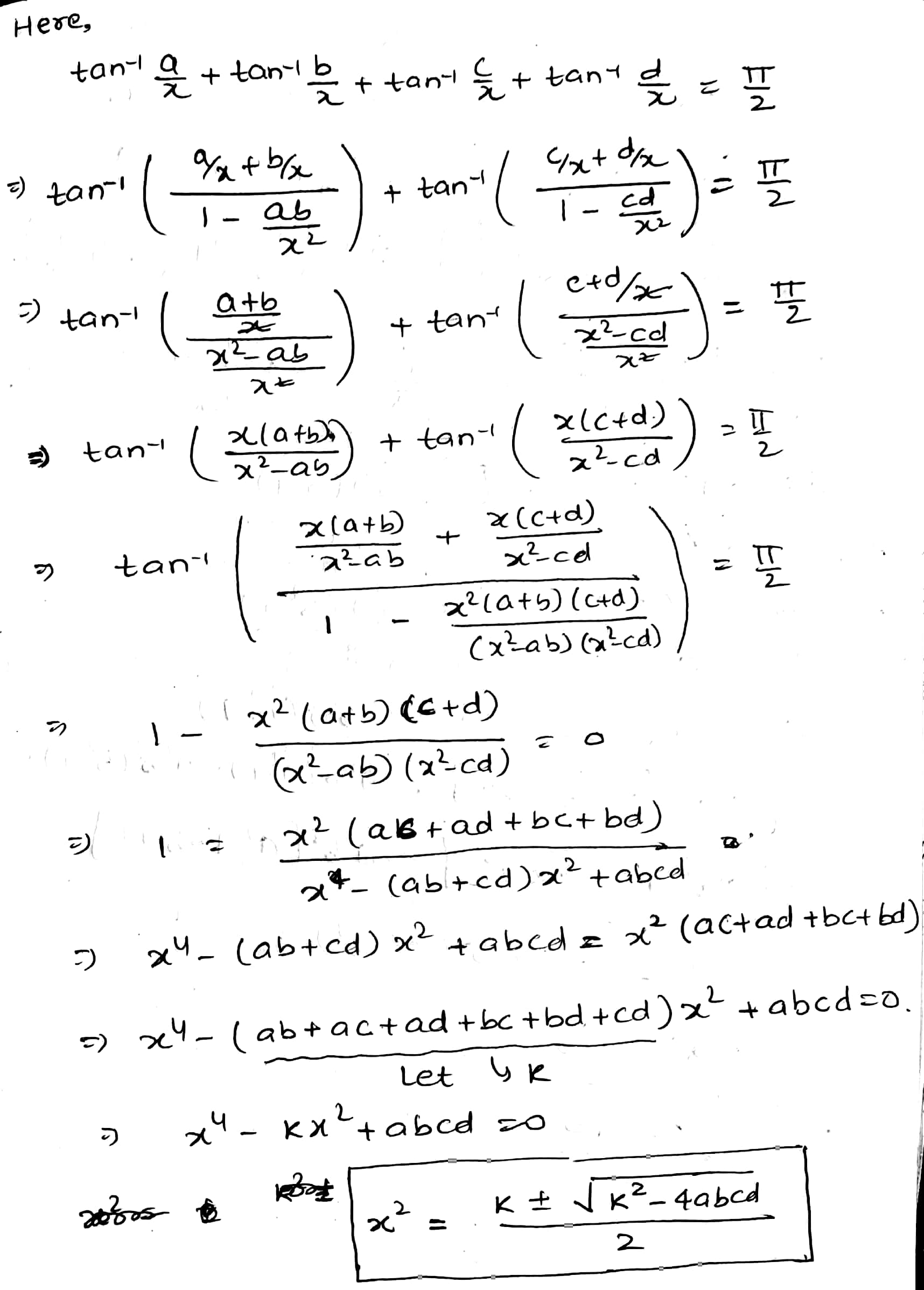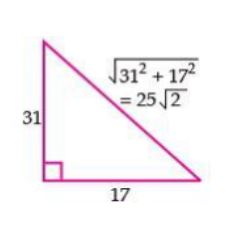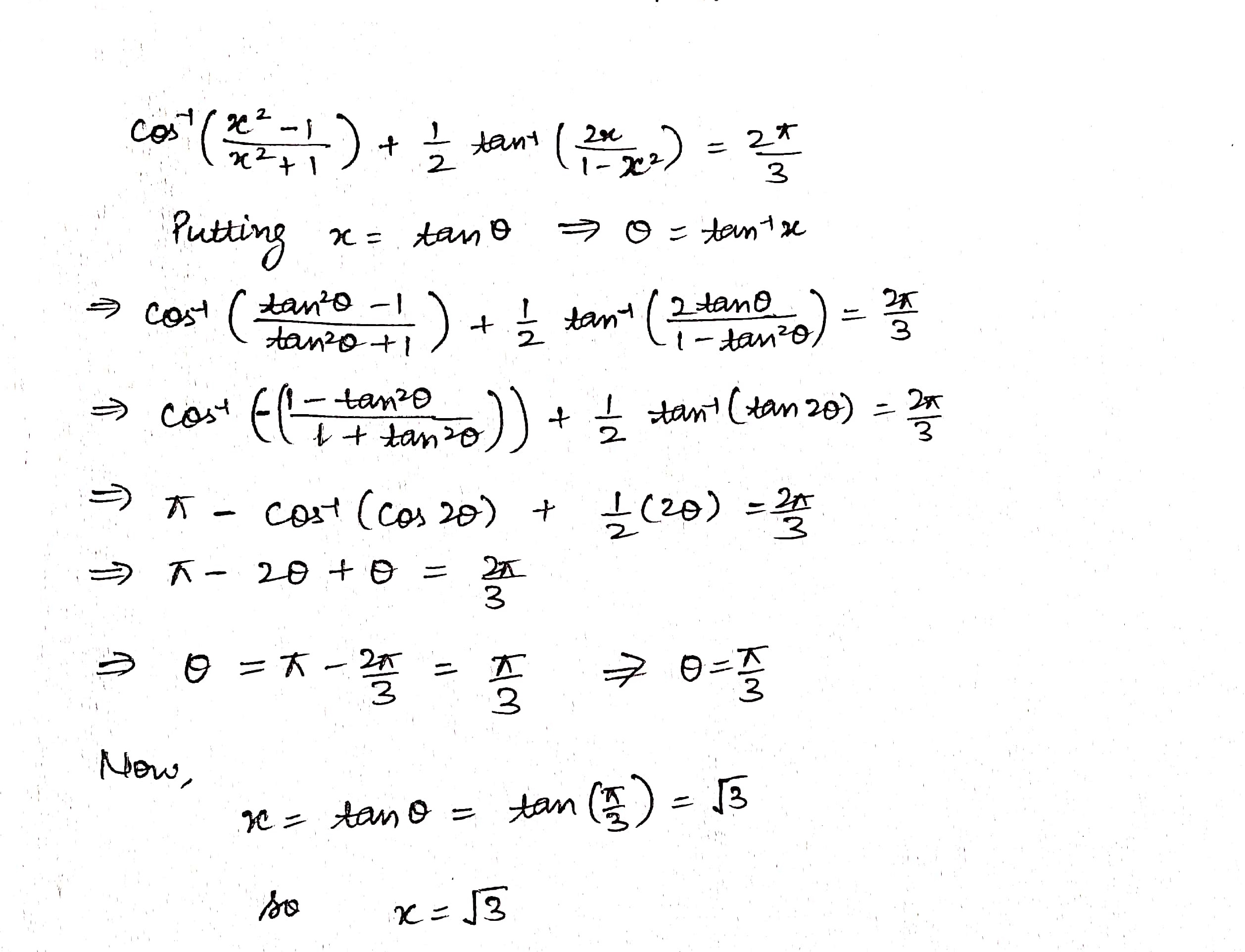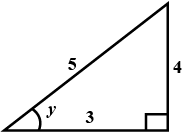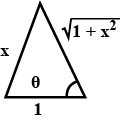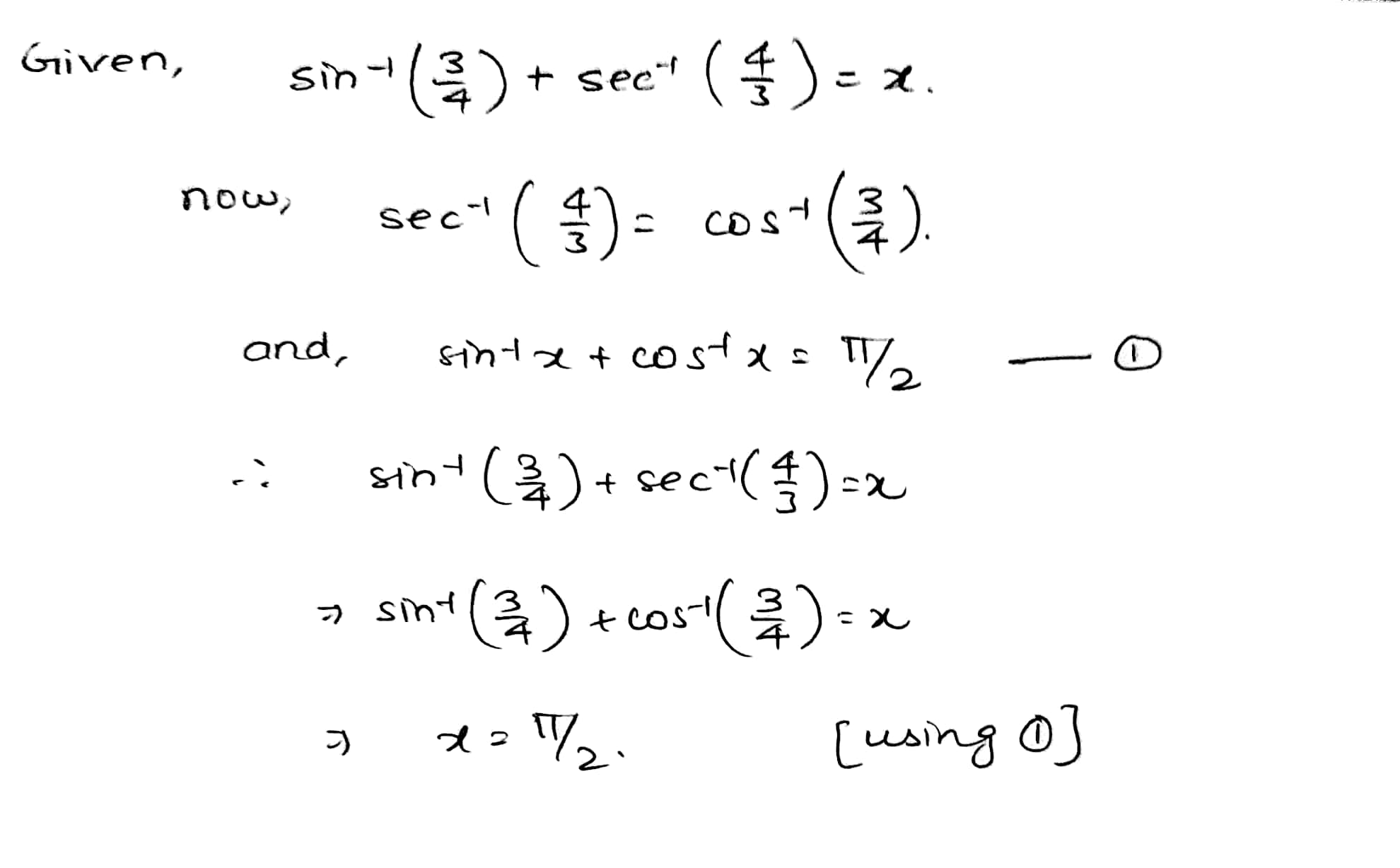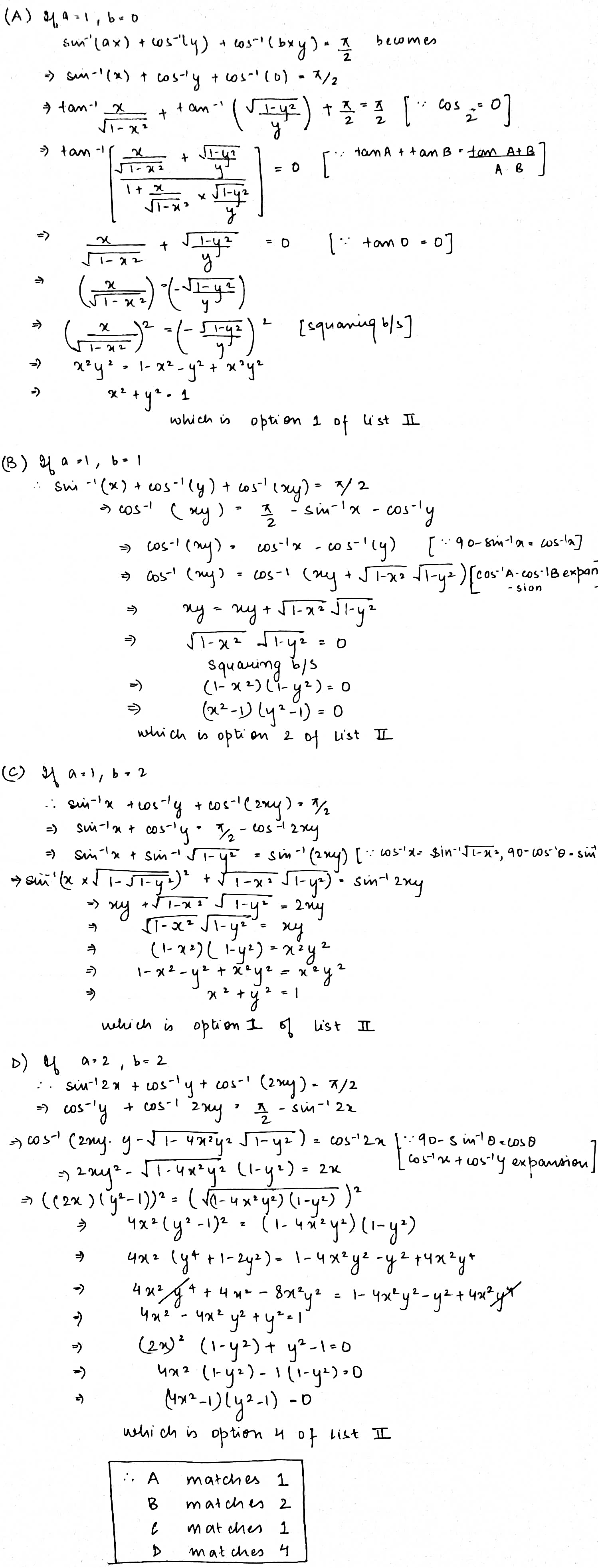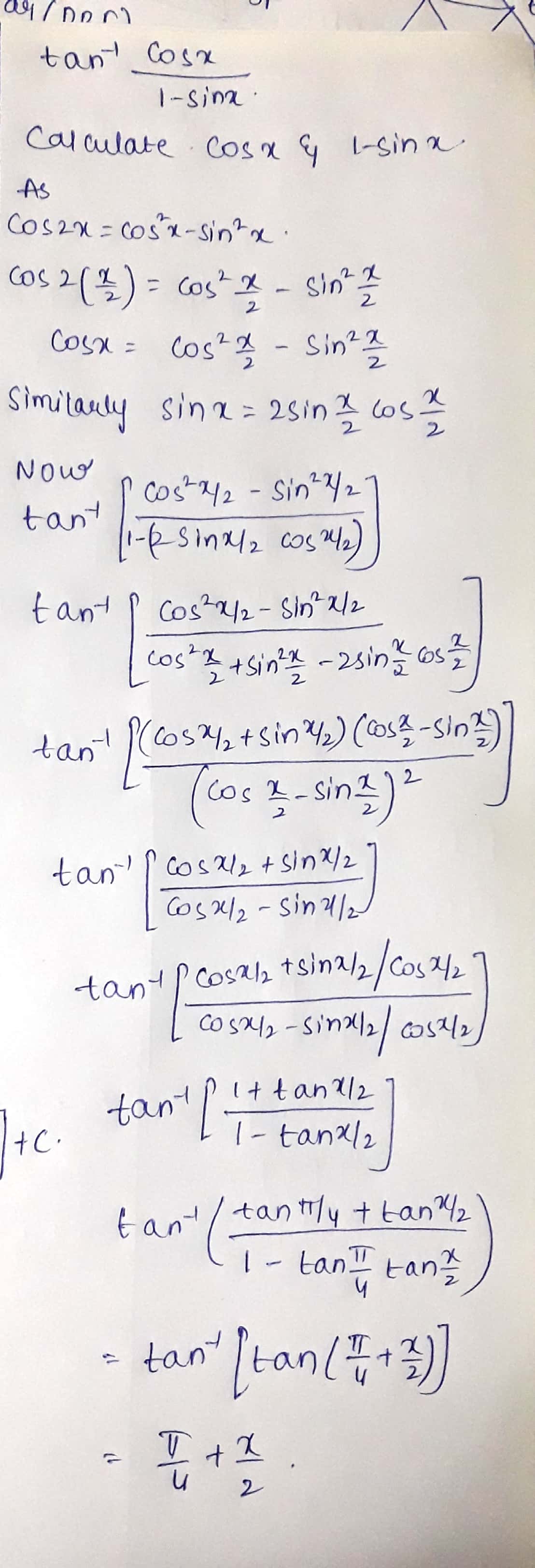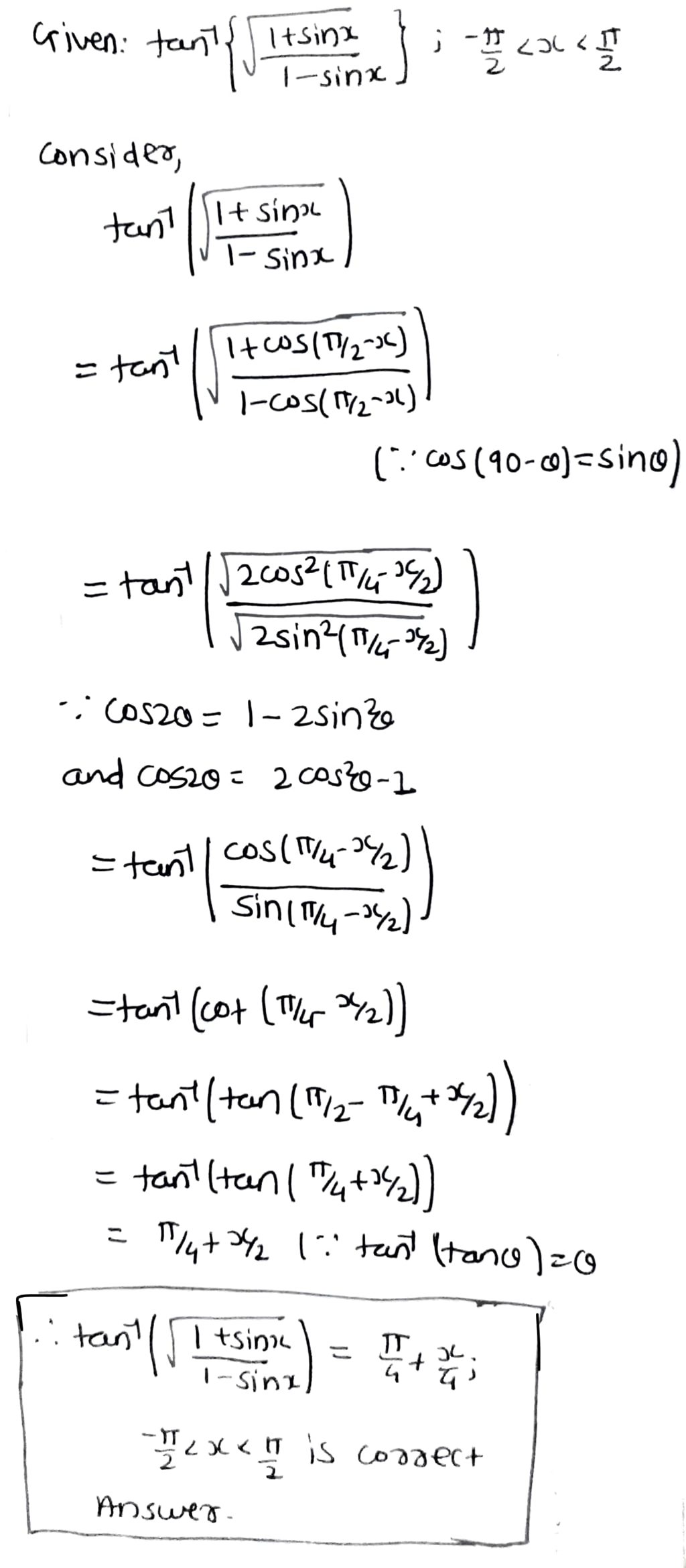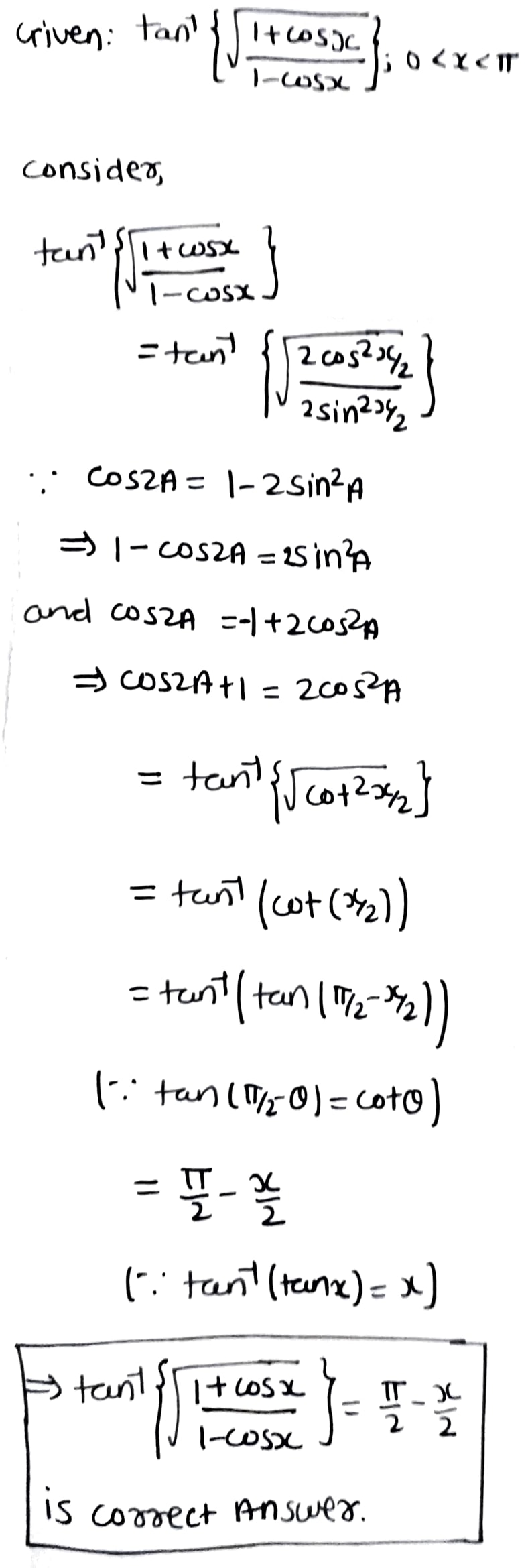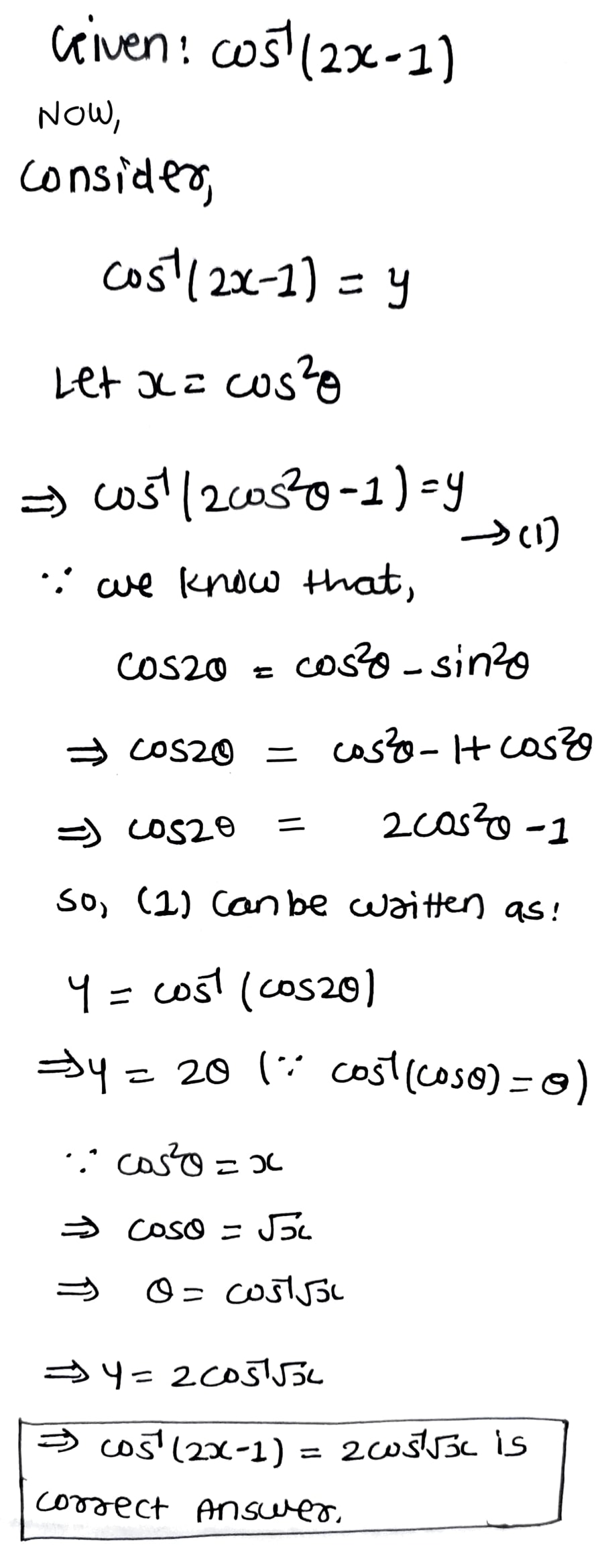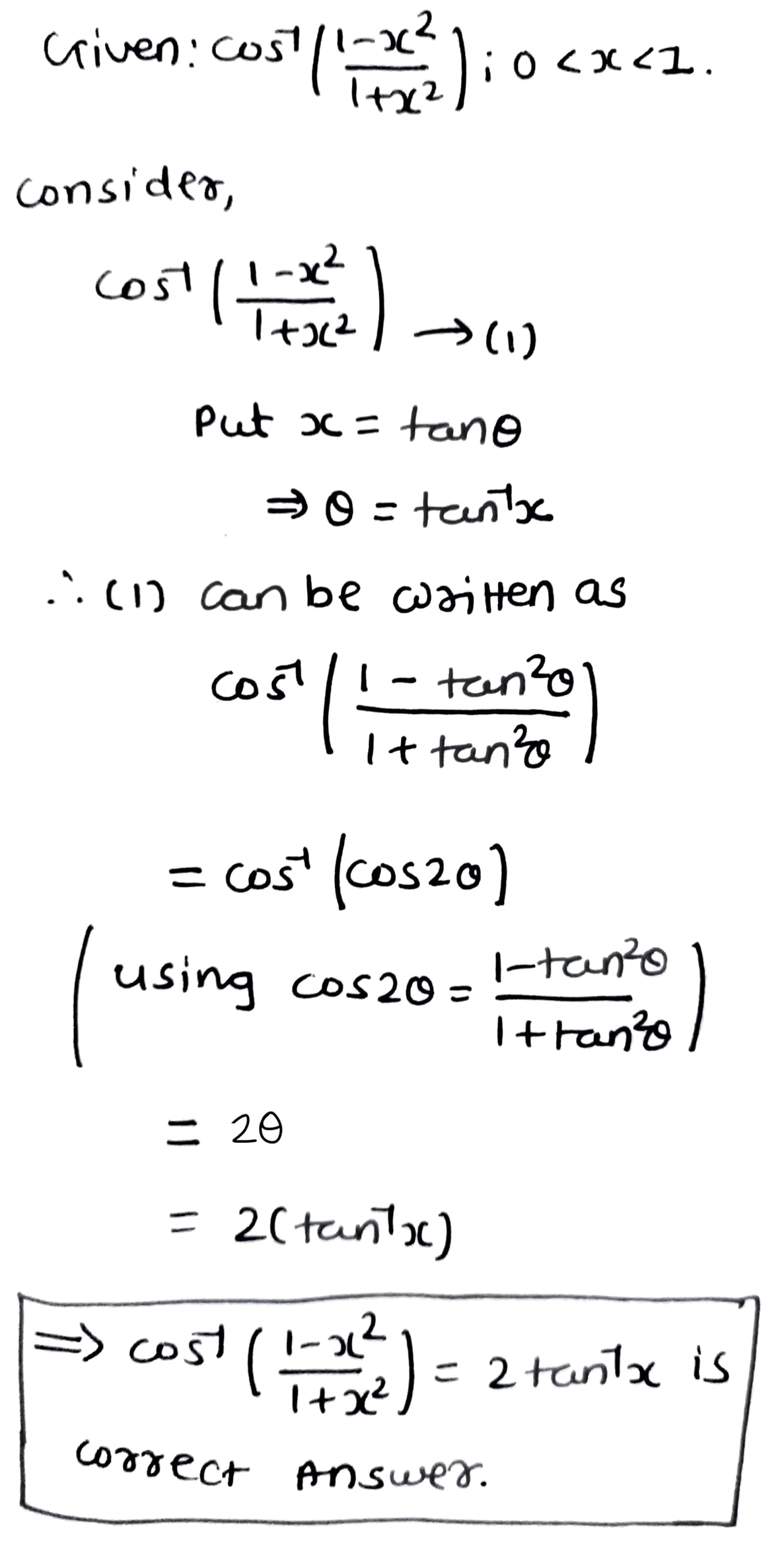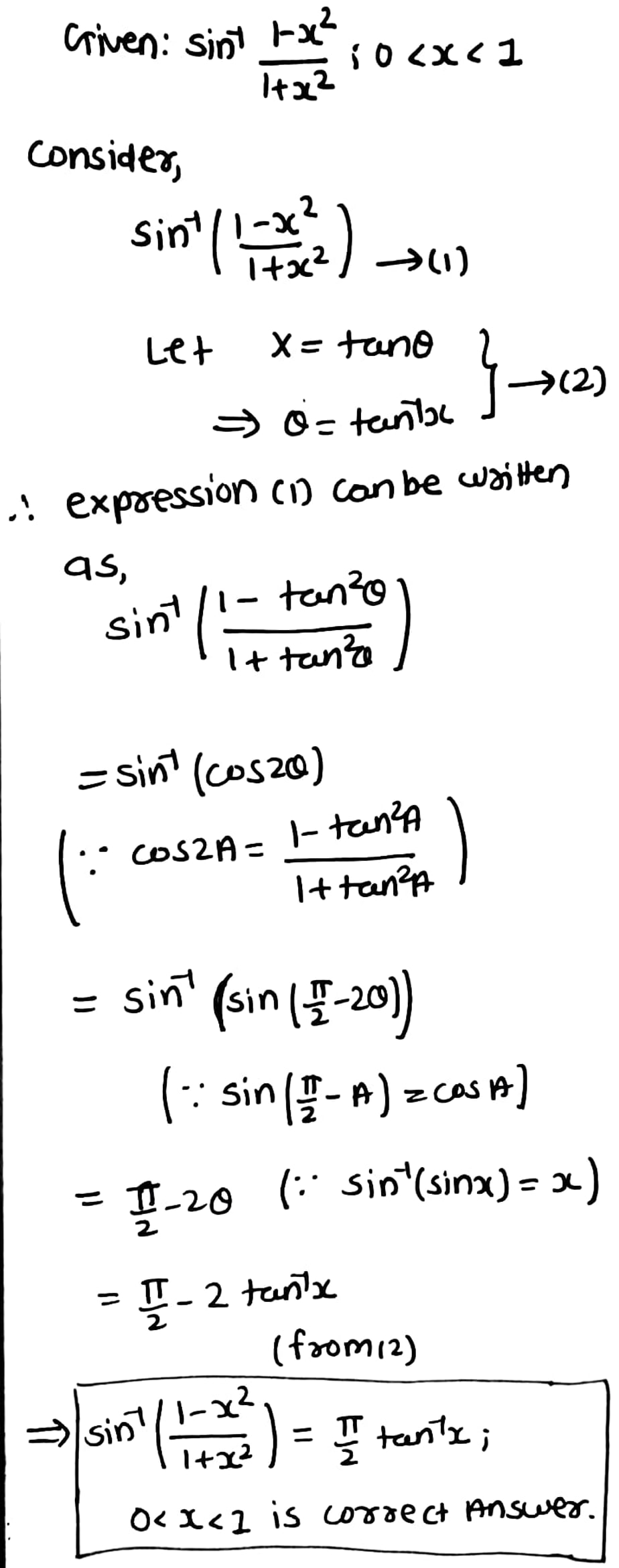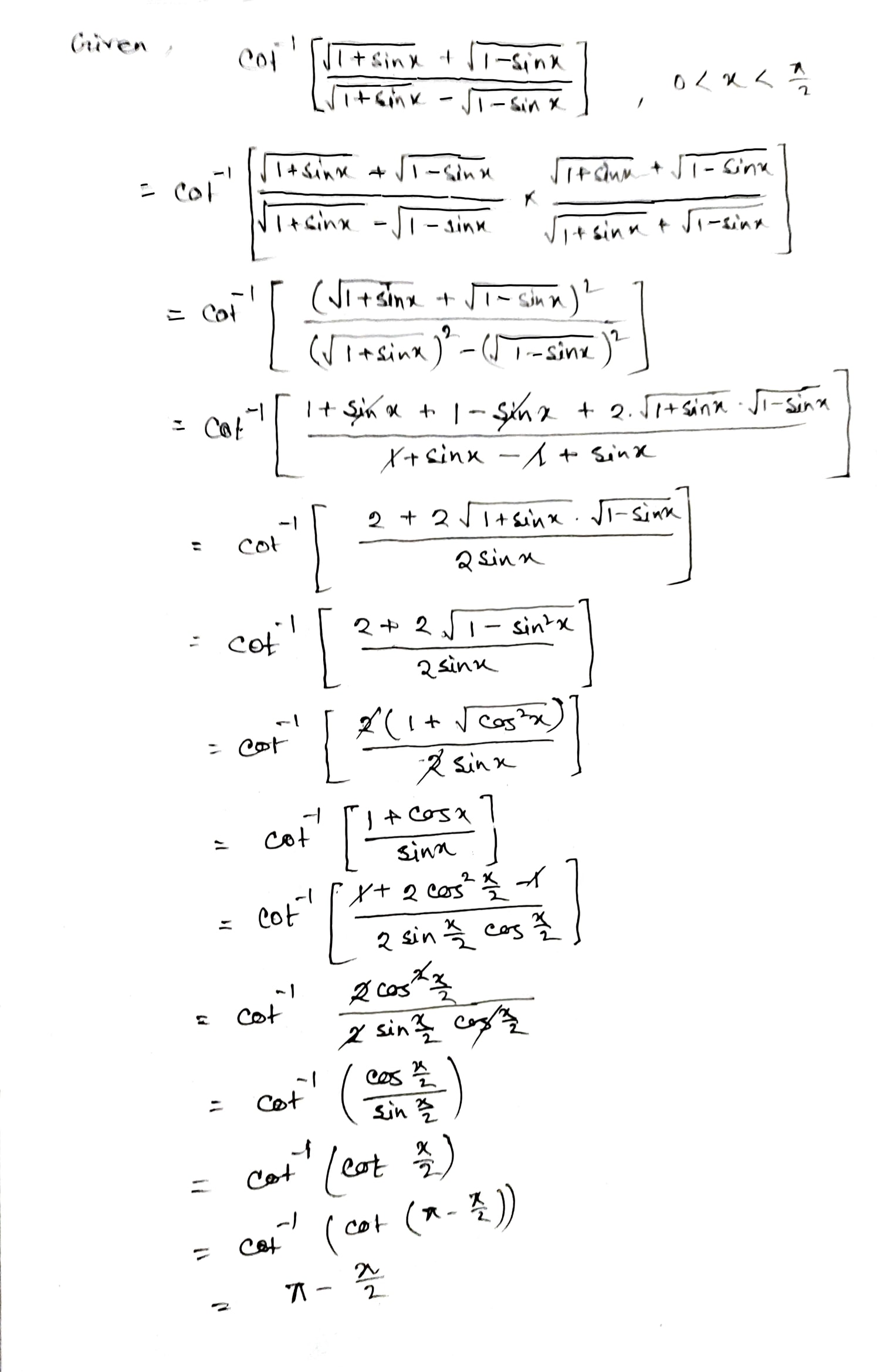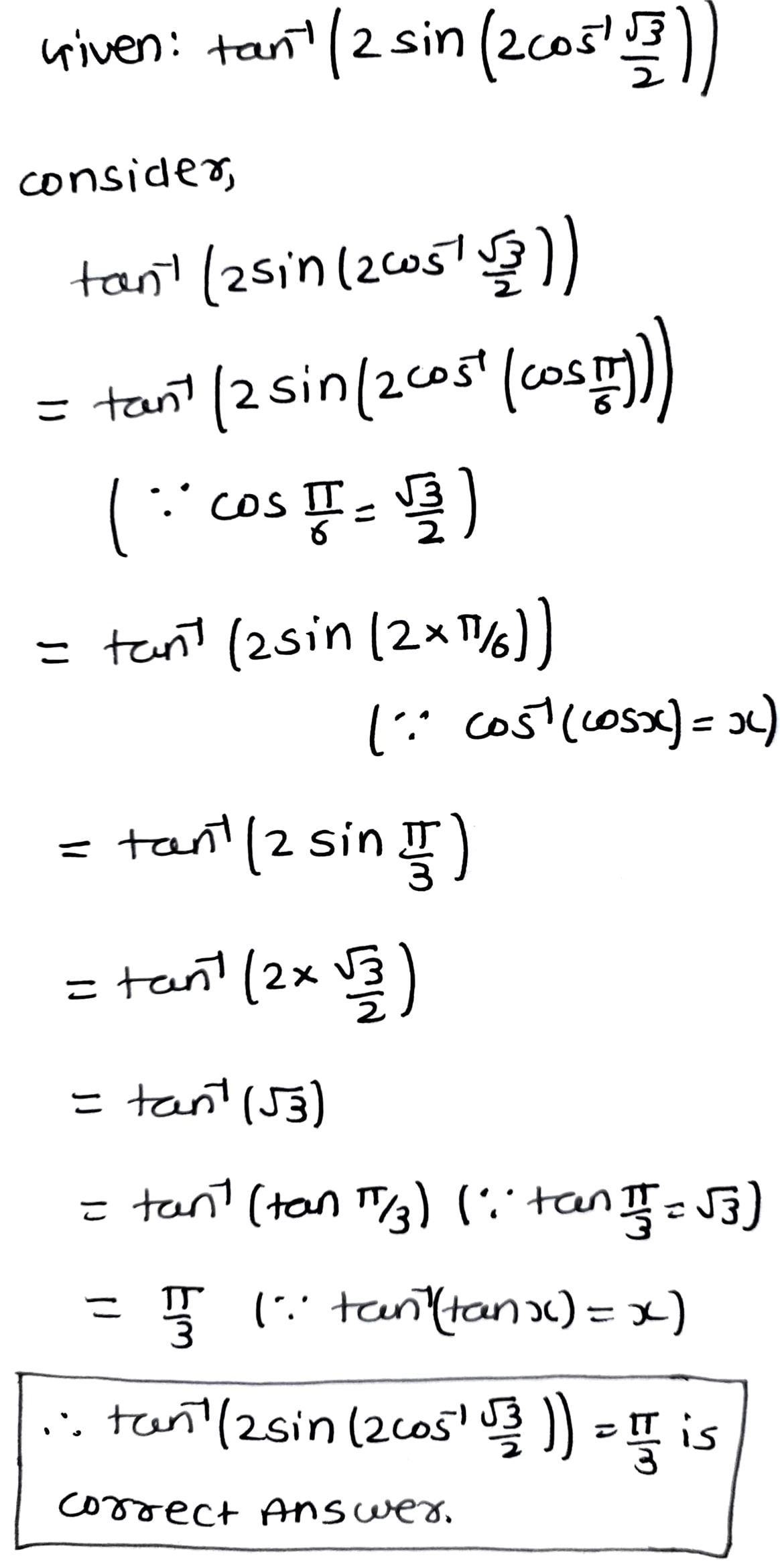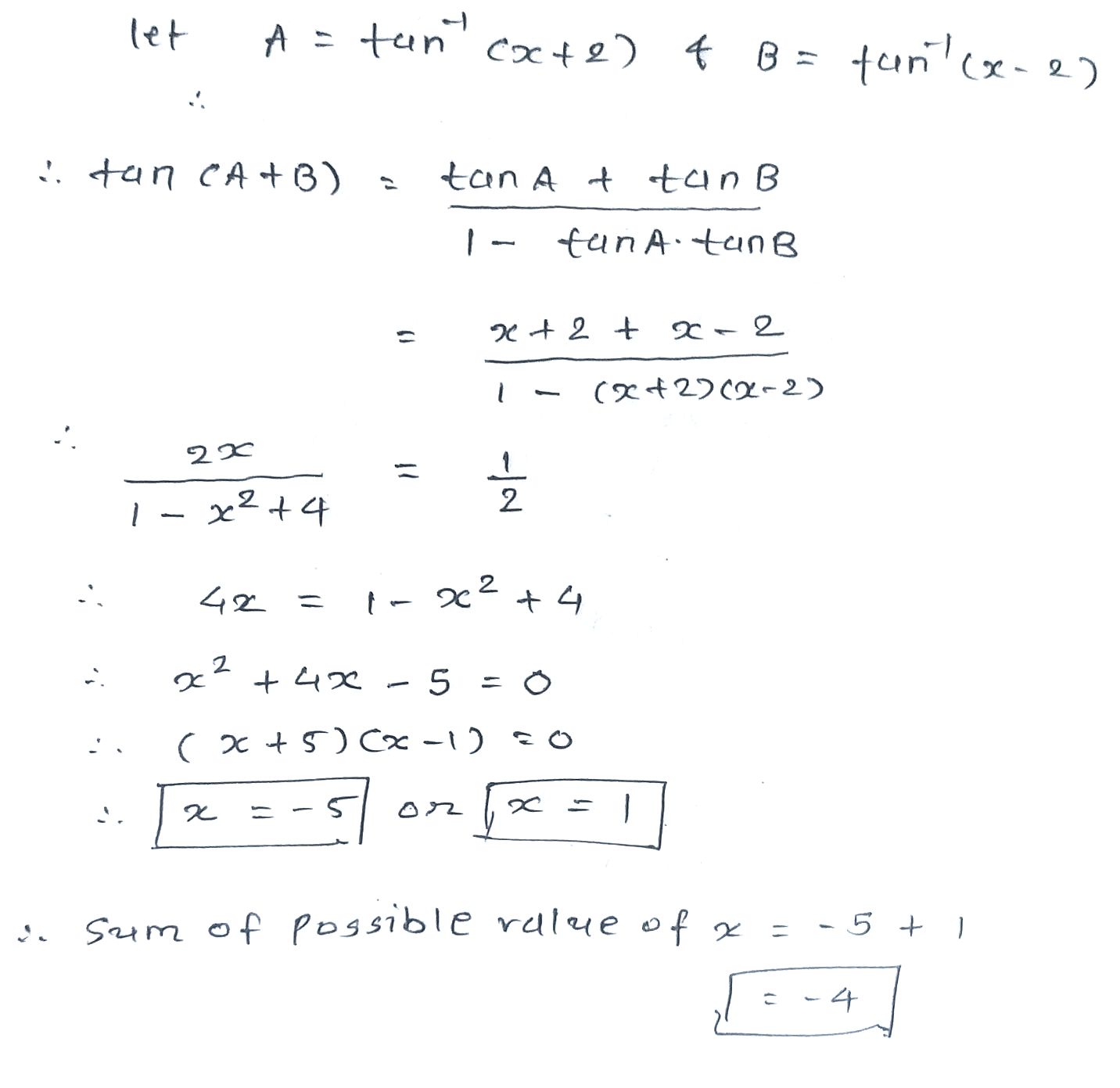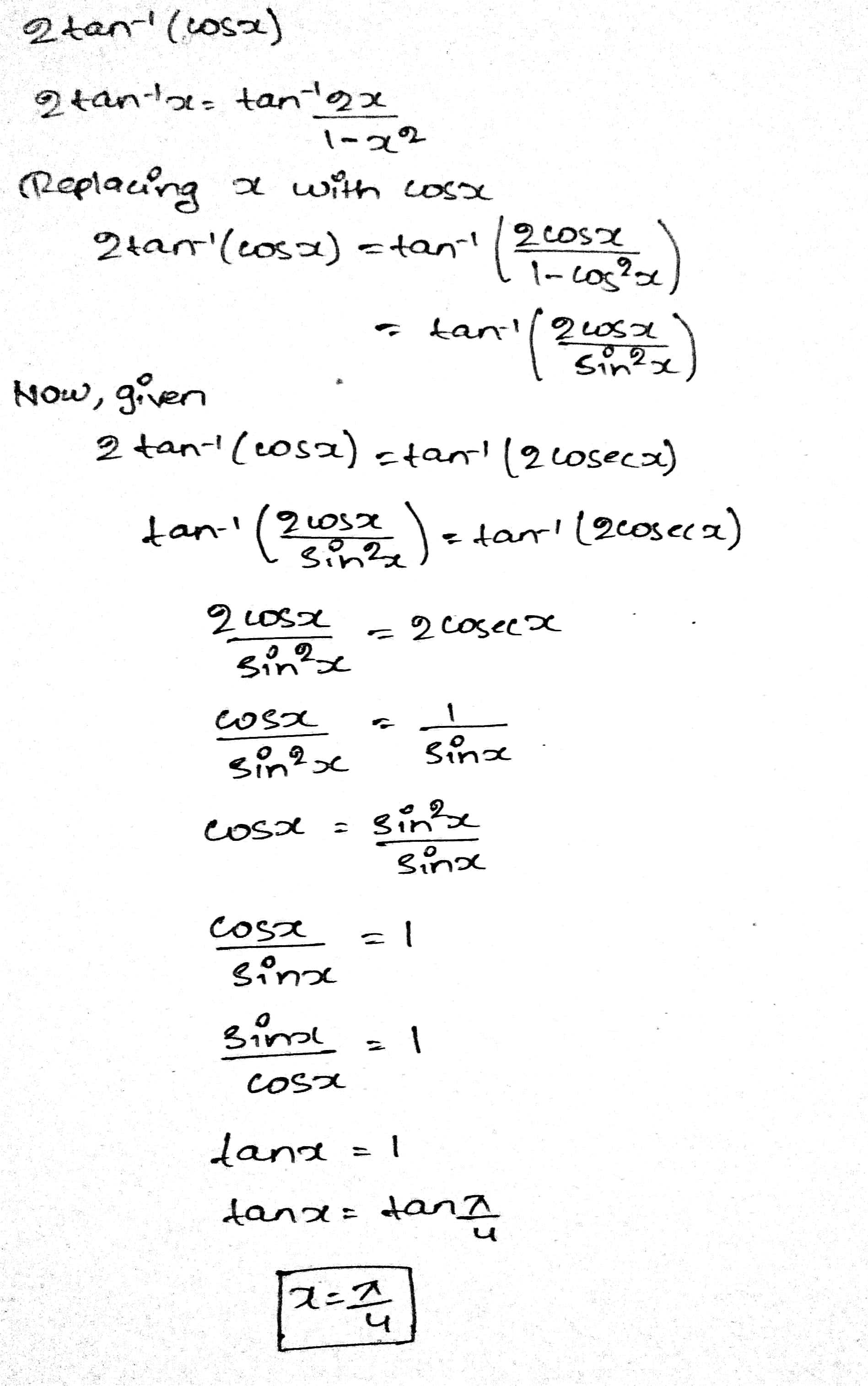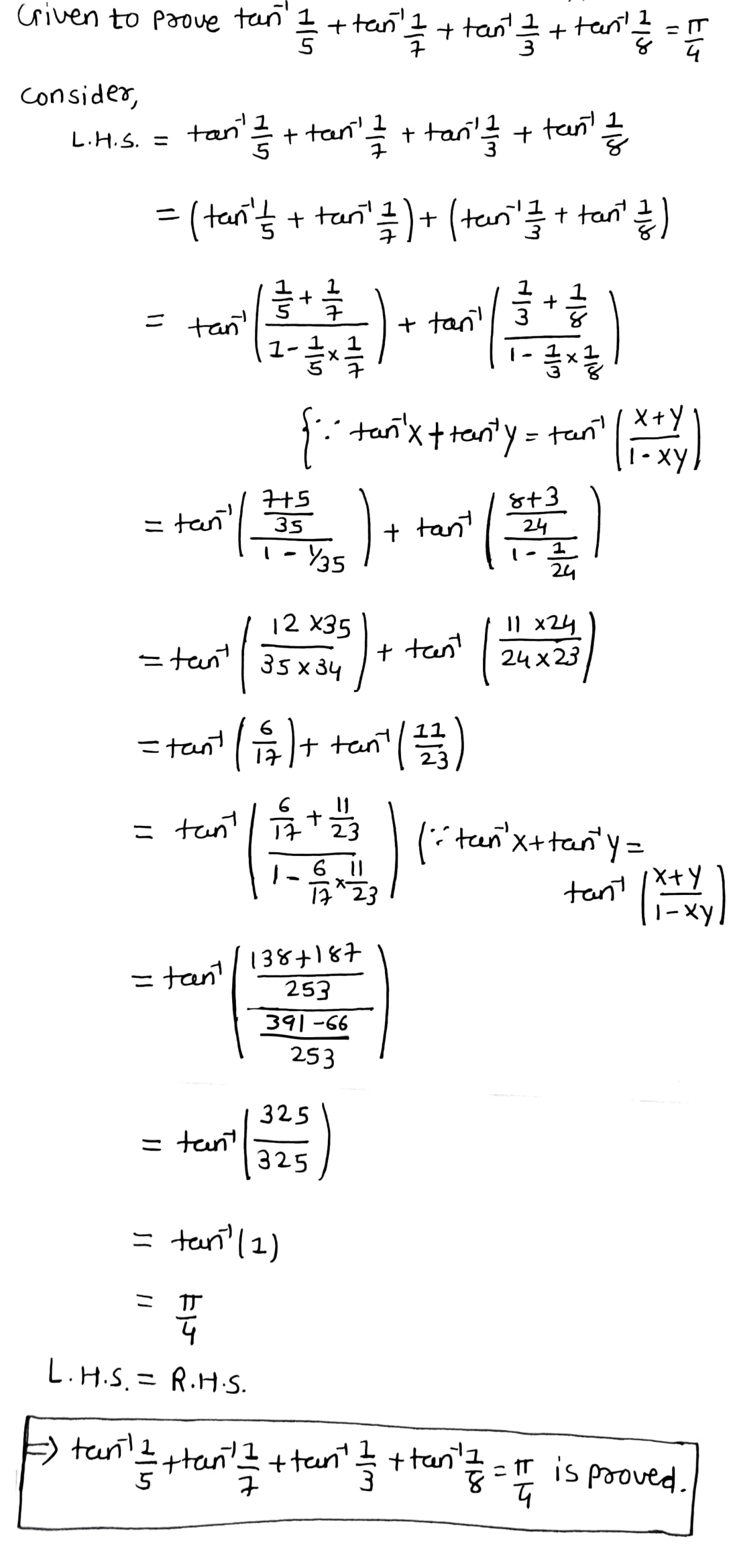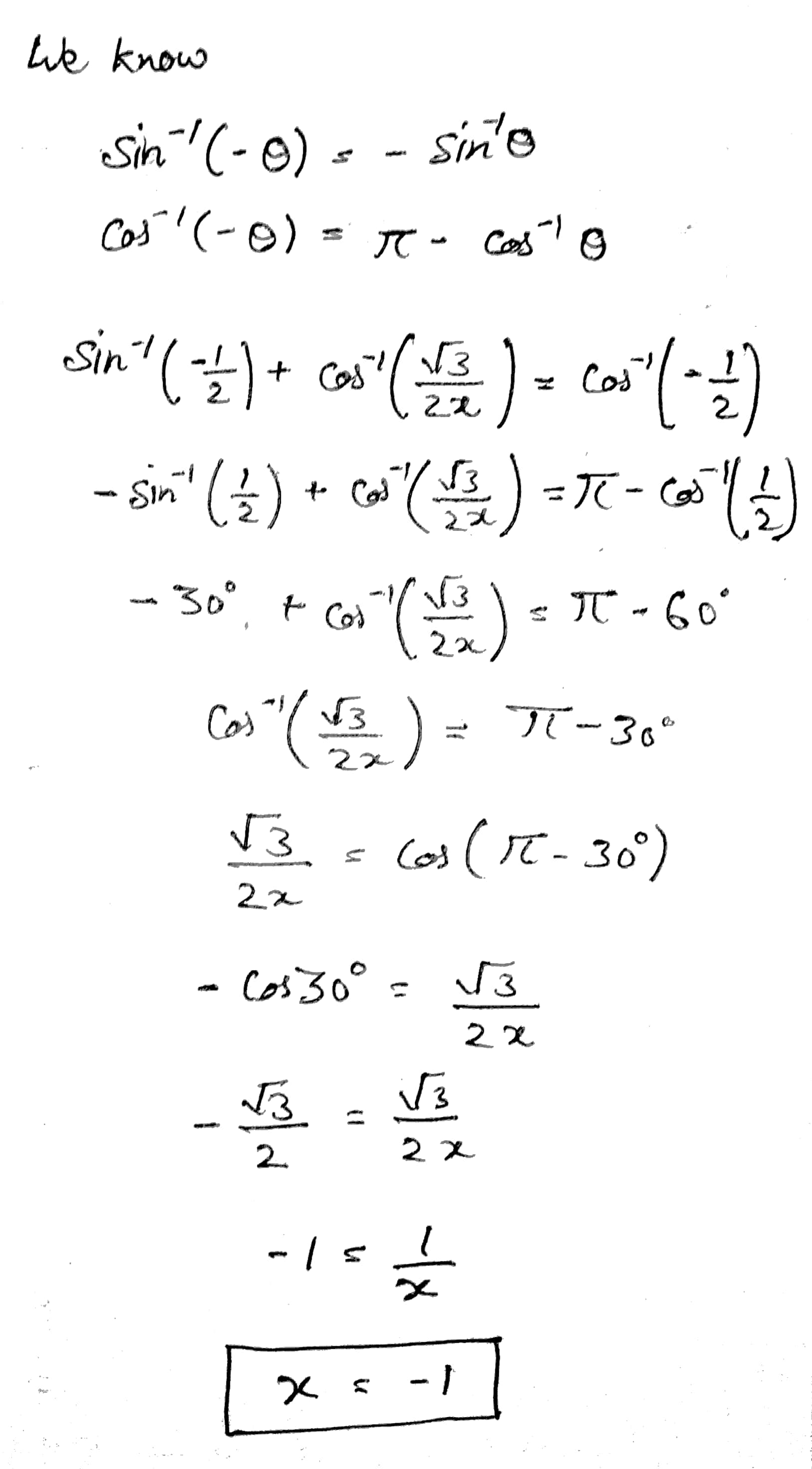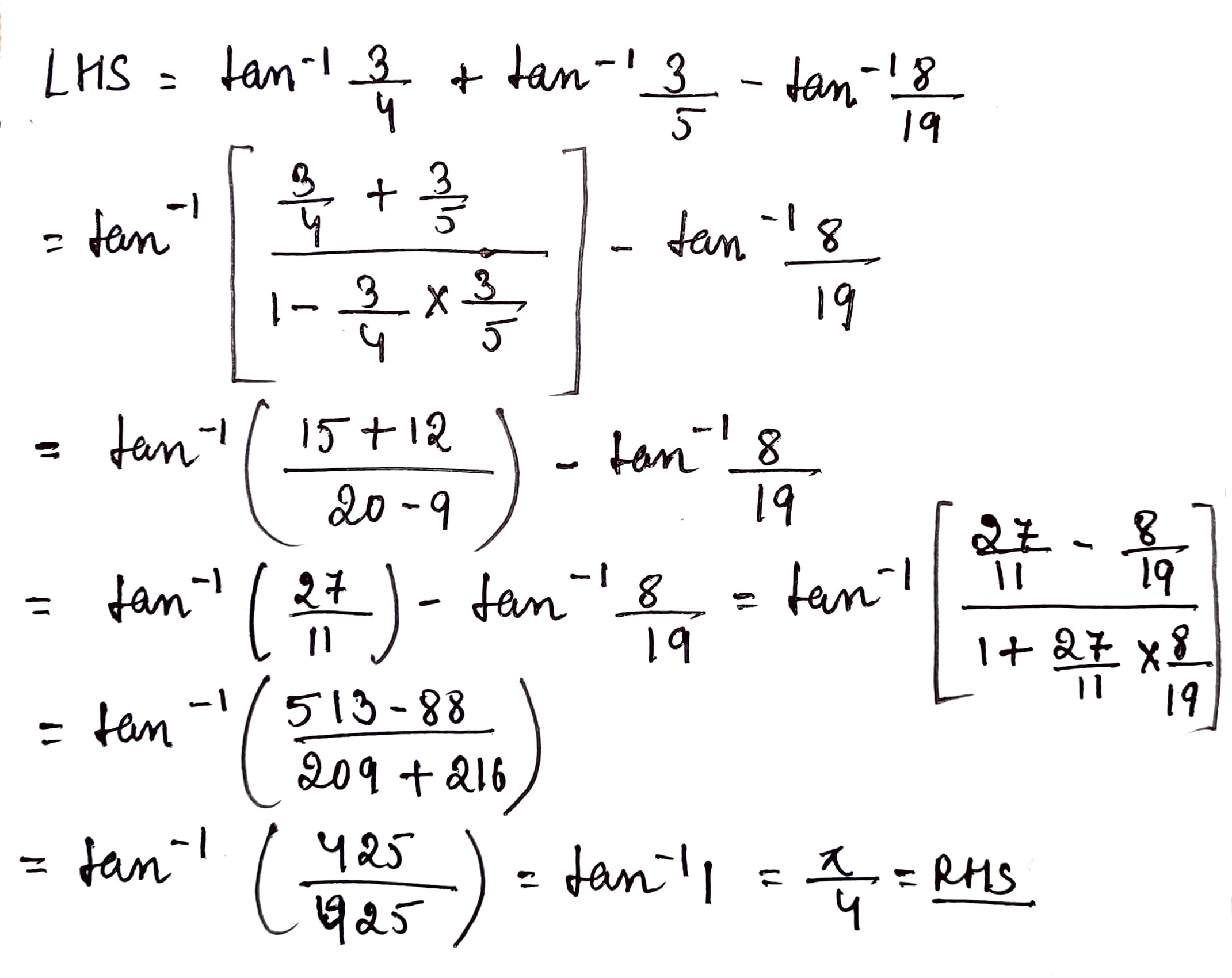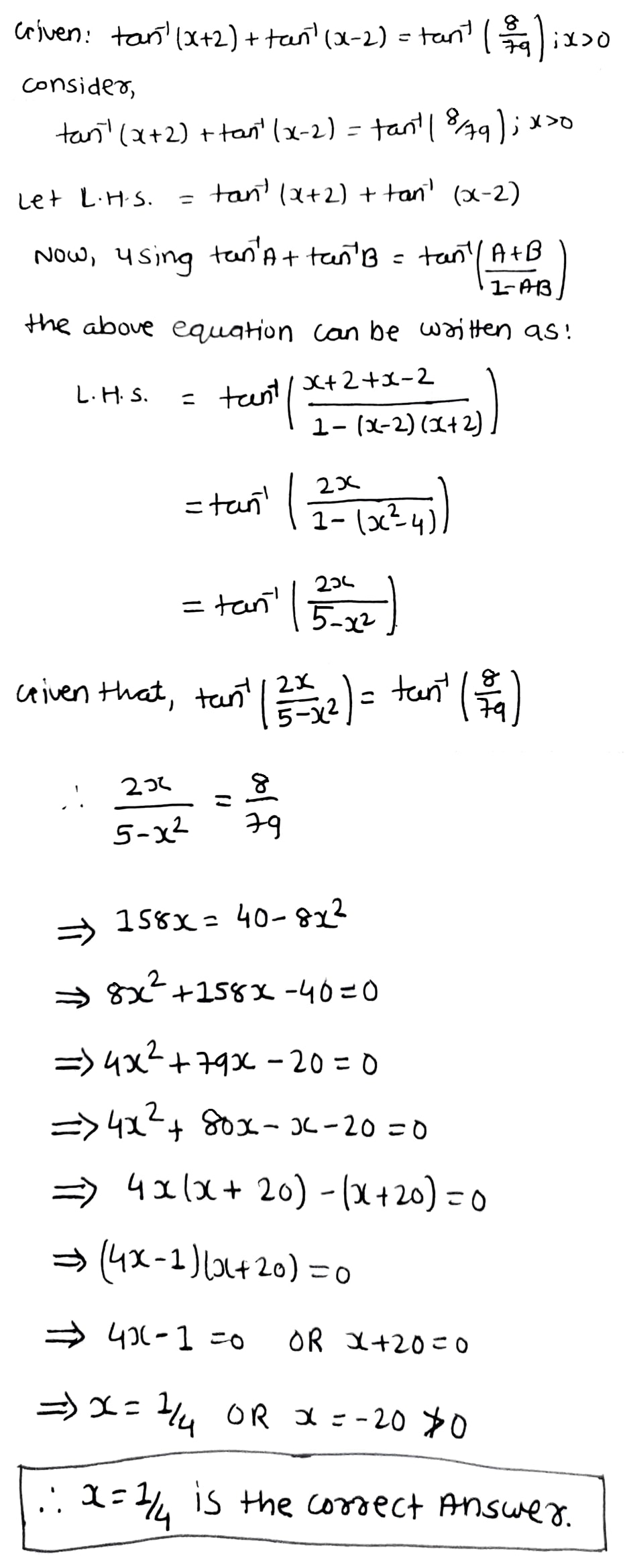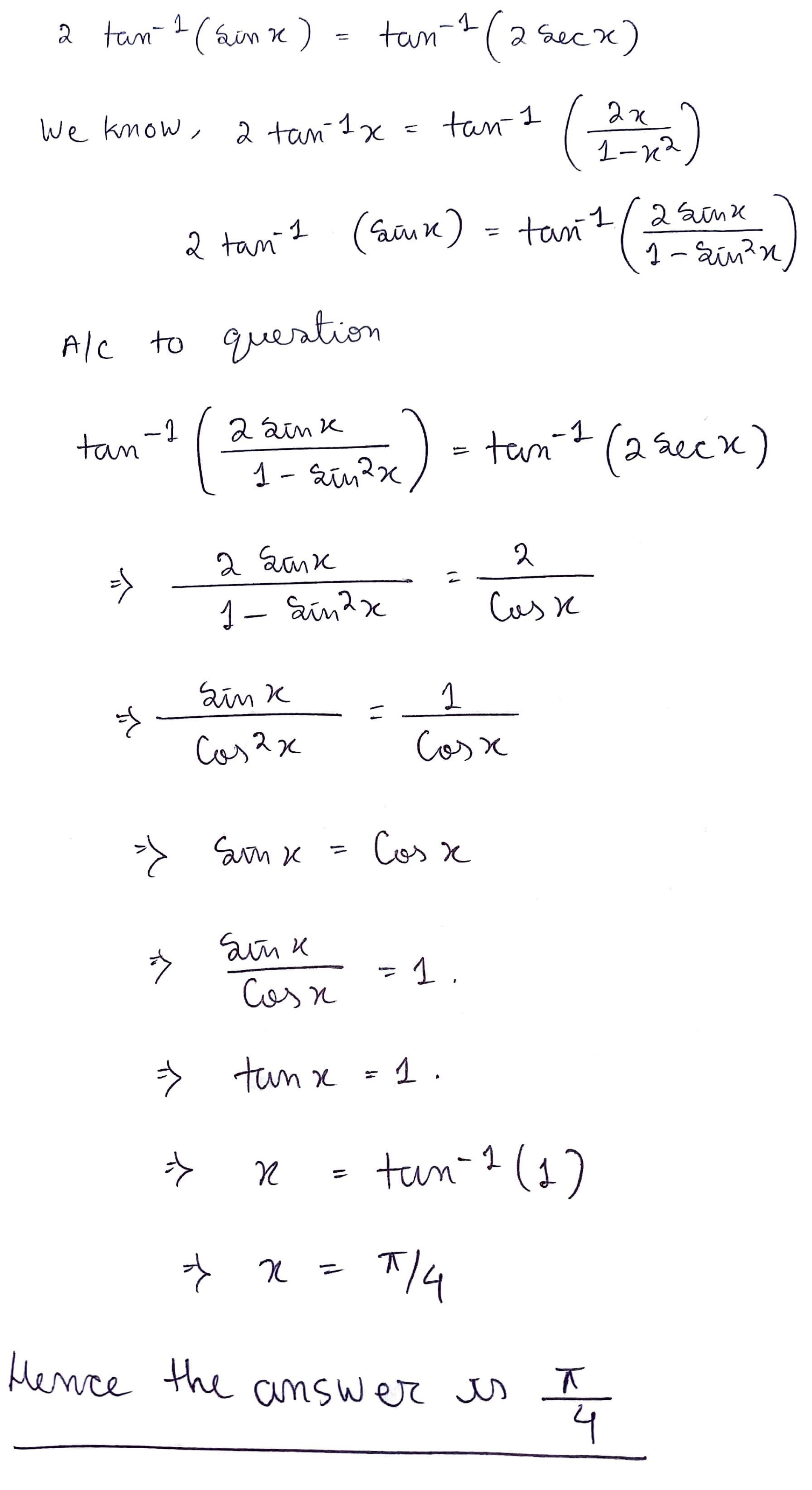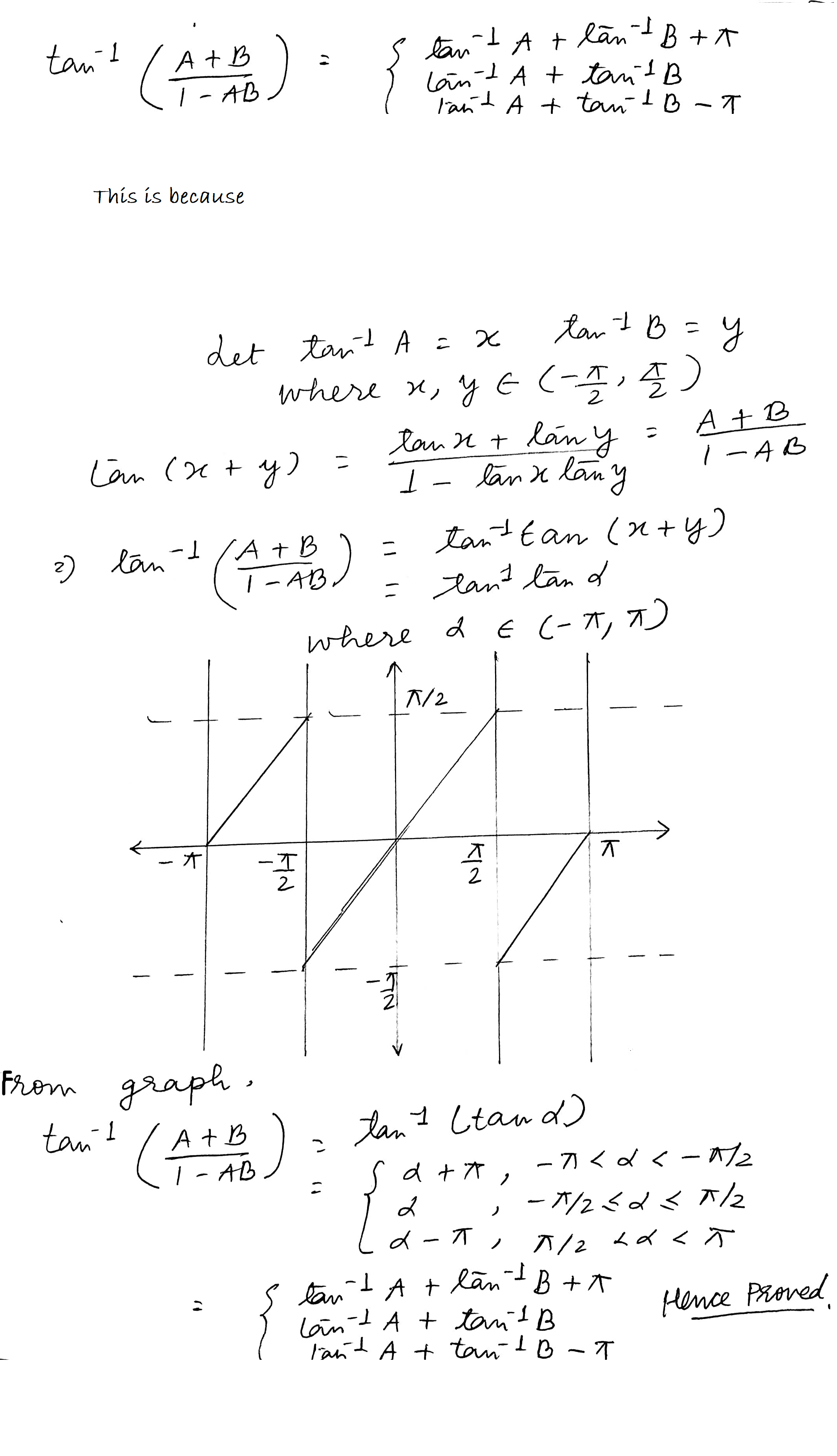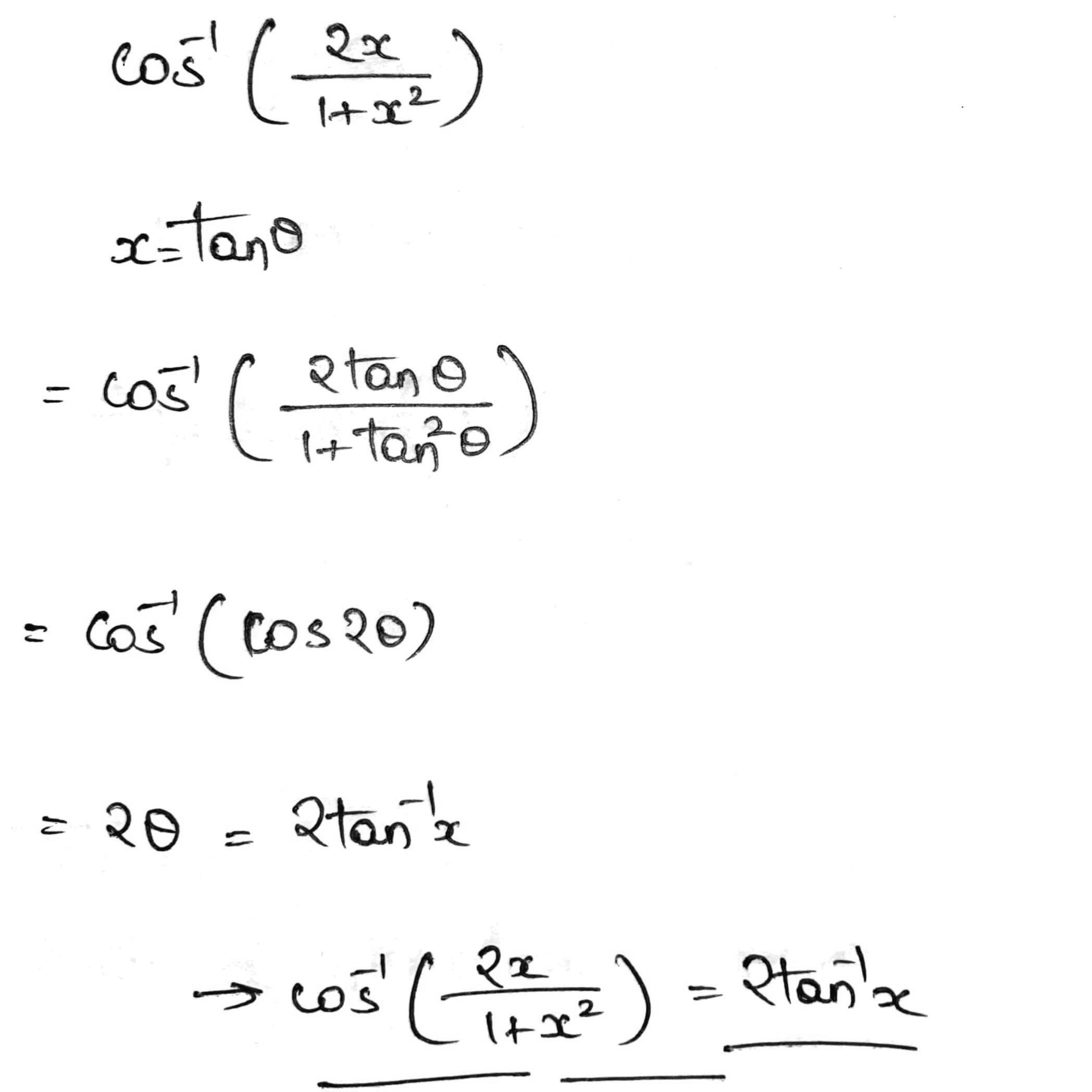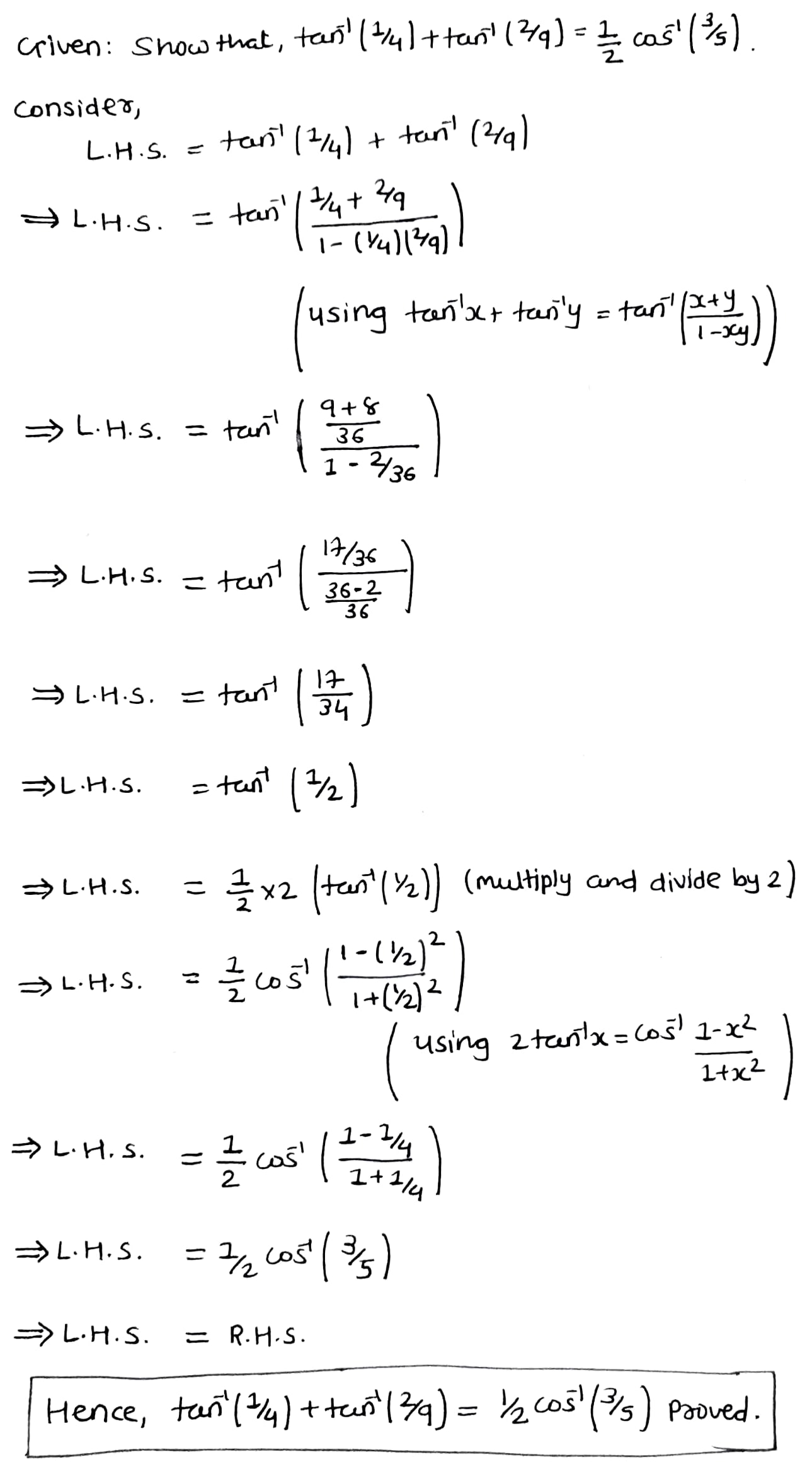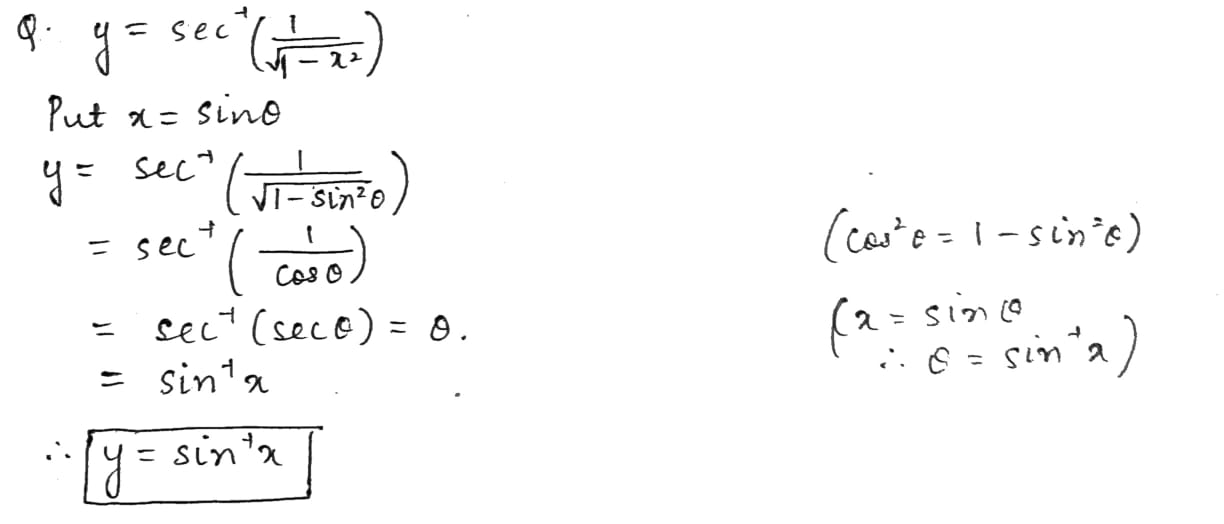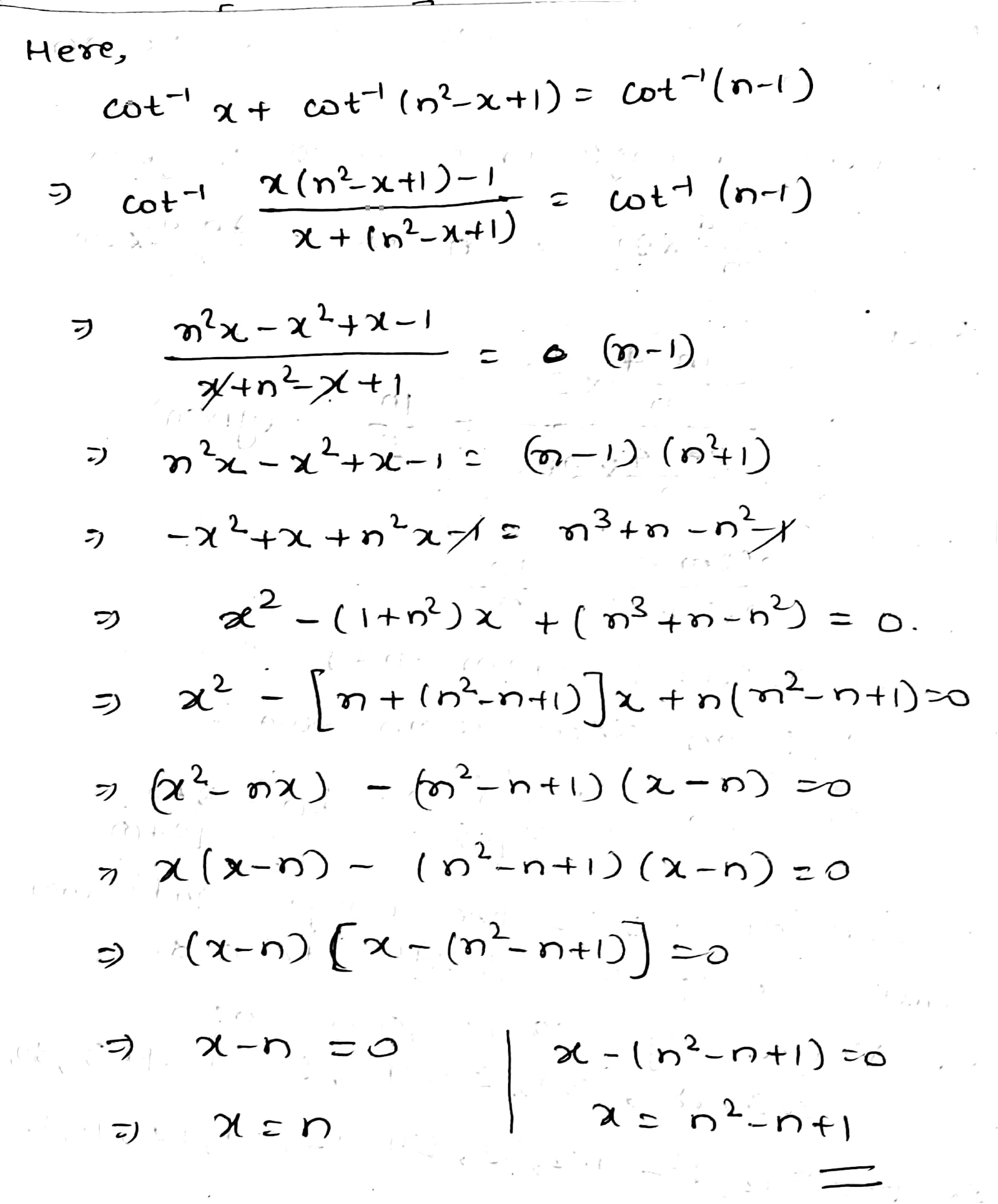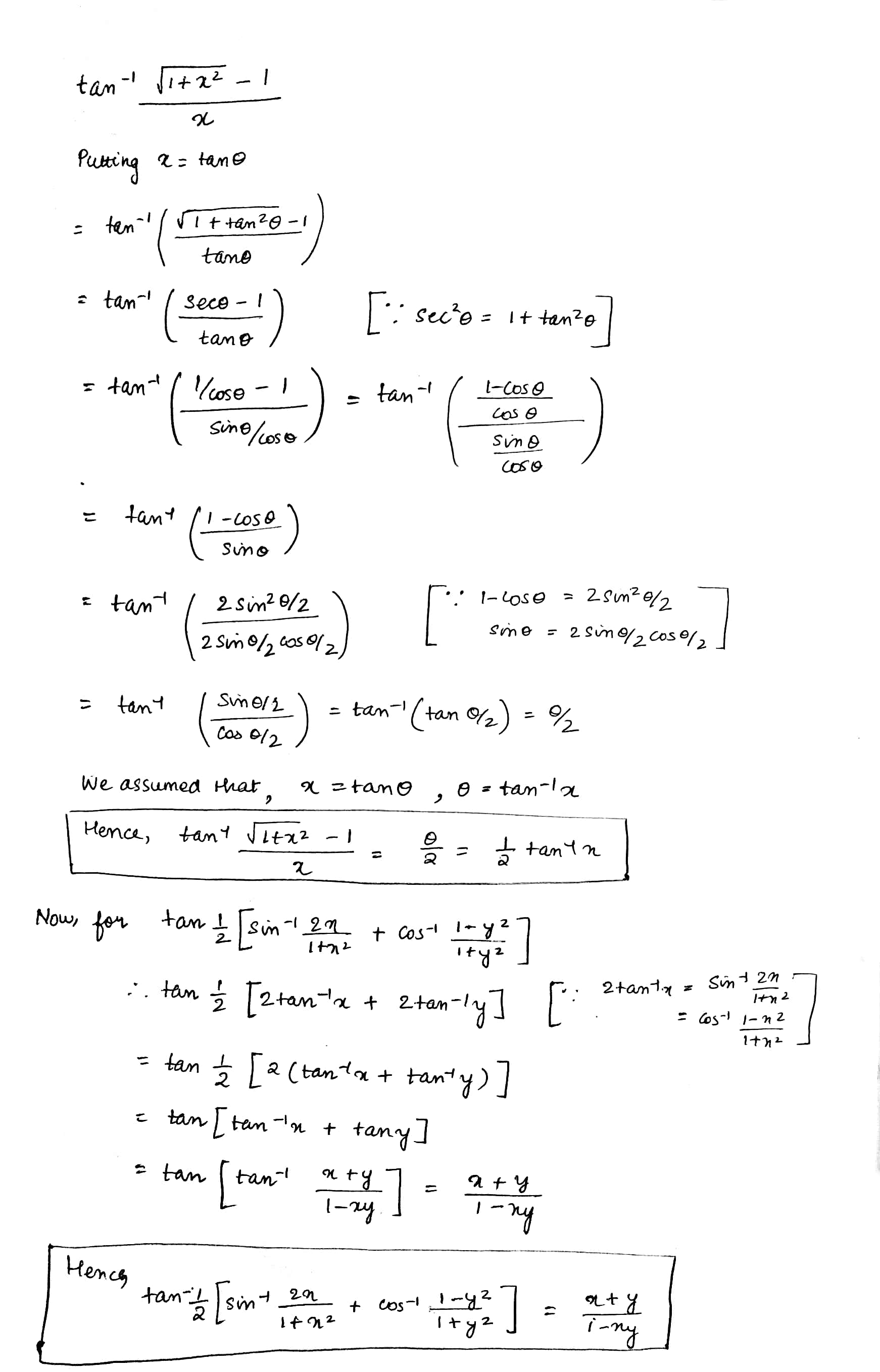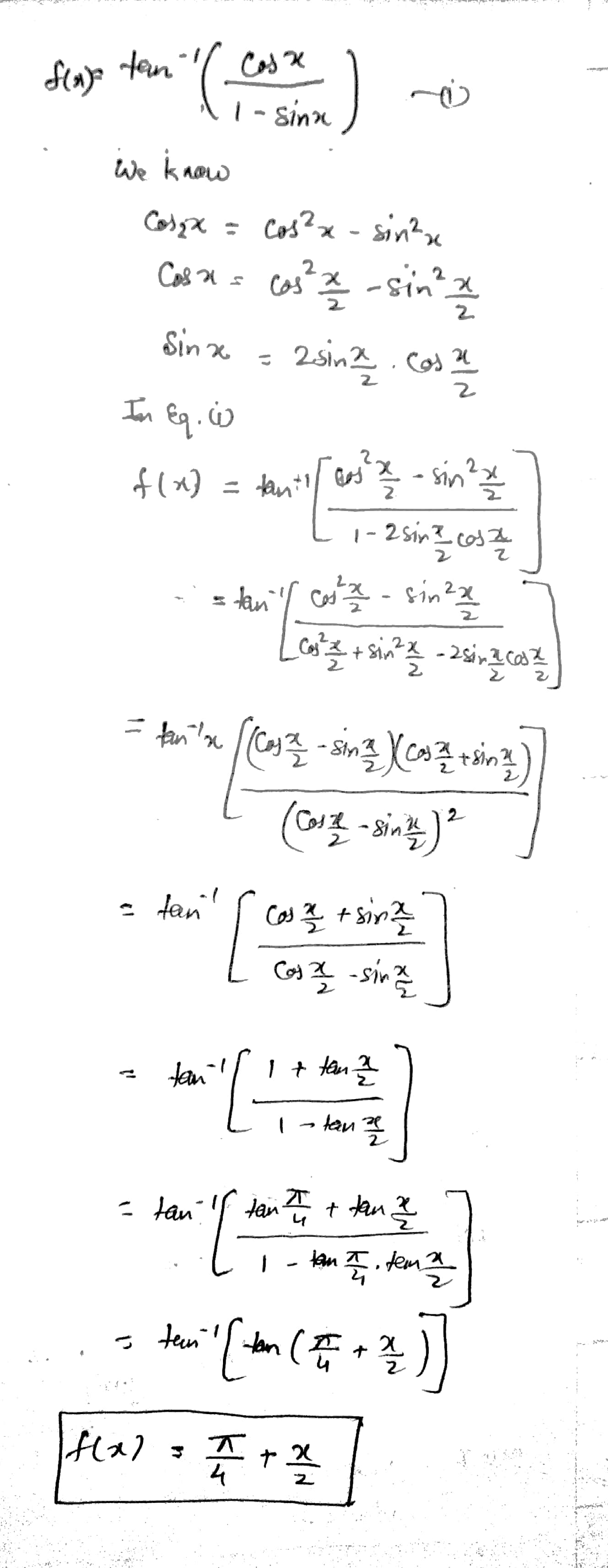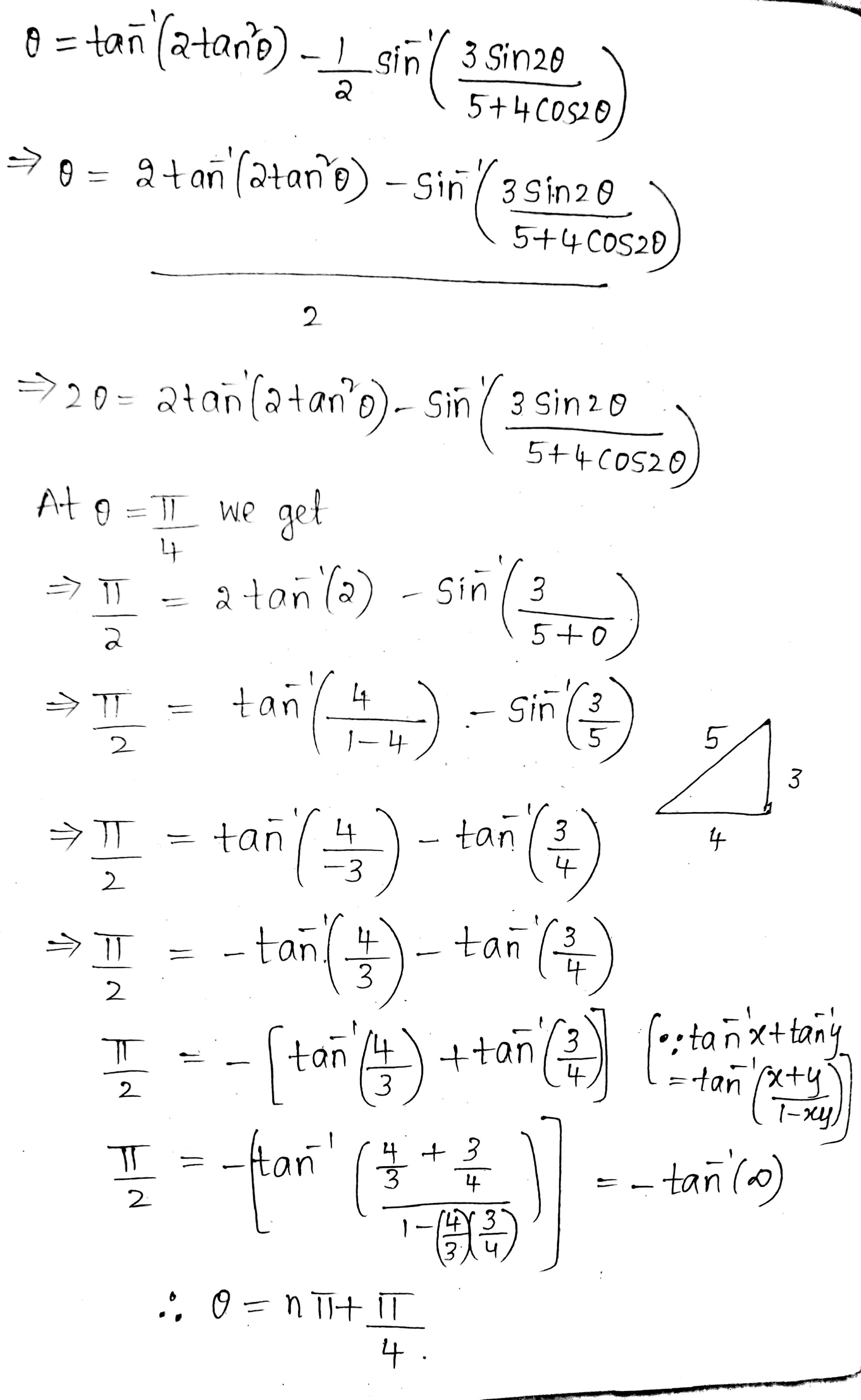Inverse Trigonometric Functions - Class 12 Commerce Maths - Extra Questions
Solve $$\displaystyle \tan^{-1} \left ( \frac{1-x}{1+x} \right ) = \frac{1}{2} \tan^{-1} x, \: \: \left( 0<x<1 \right) $$
Solve for $$\displaystyle x$$ and $$\displaystyle y$$; $$\displaystyle \sin^{-1} x + \sin^{-1} y = \frac{2 \pi}{3}$$ and $$\displaystyle \cos^{-1} x - \cos^{-1} y = \frac{\pi}{3}$$
Solve $$\displaystyle \tan x< 2$$
Find the inverse of the following functions:$$\displaystyle f(x)=\sin ^{-1}\left(\frac{x}{3}\right),x\in [-3,3]$$
then $$f^{-1}(\pi/2)$$
then $$f^{-1}(\pi/2)$$
Prove: $$\displaystyle { \cos }^{ -1 }\frac { 4 }{ 5 } +{ \cos }^{ -1 }\frac { 12 }{ 13 } ={ \cos }^{ -1 }\frac { 33 }{ 65 } $$
$$\dfrac {1}{2}\tan^{-1} x = \cos^{1} \left \{\dfrac {1 + \sqrt {1 + x^{2}}}{2\sqrt {1 + x^{2}}} \right \}^{\dfrac {1}{2}}$$.
$$\displaystyle\, \tan^{-1}\frac{2}{11} + \tan^{-1}\frac{7}{24} = \tan^{-1}\frac{1}{2}$$
Find the value of $$\sin\left\{2\sin^{-1}\dfrac{3}{5}\right\}$$
The range of $$arc\sin { x } +arc\cos { x } +arc\tan { x }$$ is
Prove that $$\displaystyle\, \tan^{-1}\frac{\sqrt{1 + x^2} - 1}{x}=\dfrac{1}{2}\tan^{-1}x, x \neq 0$$
Evaluate $$ \sin ^{ -1 }{ \left( \cos { x } \right) }$$
Write the range of $$\sin^{-1}x$$.
Solve for x :
$${\left( {{{\tan }^{ - 1}}x} \right)^2} + {\left( {{{\cos }^{ - 1}}x} \right)^2} = \dfrac{{5{\pi ^2}}}{8}$$
If $$y=$$ $${\cot ^{ - 1}}\,\left( {\sqrt {\cos x} } \right) - {\tan ^{ - 1}}\,\left( {\sqrt {\cos x} } \right)$$, then prove that $$\sin y = {\tan ^2}\dfrac{x}{2}.$$
Simplify: $$\tan^{-1}\left(\dfrac{a - x}{1 + ax}\right)$$
Write the function in simplest form : $$\tan^{-1} \left ( \dfrac{x}{\sqrt{a^2-x^2}} \right ) where, |x|<a$$.
Calculating the principal value, find the value of $$\cos\left[\sin^{-1}\left(\dfrac{3}{5}\right)\right]$$.
Solve for x : $$\cos^{-1} x + \sin^{-1} \left(\dfrac{x}{2} \right) = \dfrac{\pi}{6}$$
Prove that: $$\cot \left(\dfrac {\pi}{2}-2\ \cot^{-1}3\right)=\dfrac{3}{4}$$
Evaluate: $$sec^{-1}(-2)$$
Solve $${\tan ^{ - 1}}\left( {\tan \frac{{2\pi }}{3}} \right)$$
Evaluate
$${\cos ^{ - 1}}\dfrac{1}{2} + 2{\sin ^{ - 1}}\dfrac{1}{2}$$
Solve:$${\sin ^{ - 1}}\left( {\frac{{1 - {x^2}}}{{1 + {x^2}}}} \right)$$
Solve:-
$${\cos ^{ - 1}}\left( {\frac{1}{2}} \right) - 2{\sin ^{ - 1}}\left( { - \frac{1}{2}} \right)$$
Differentiate $$\tan^{-1}\left(\dfrac{a\cos x-b\sin x}{b\cos x+a\sin x}\right)$$.
$$\sin\left(2\tan^{-1}\sqrt{\dfrac{1-x}{1+x}}\right)$$.
Solve:
$${\sin ^{ - 1}}(\cos x)$$
$$sin^{-1}(cosx)$$
Solve:
$${\sin ^{ - 1}}(\cos x)$$
$$sin^{-1}sin15+cos^{-1}cos20+tan^{-1}tan 25=$$
Prove $$\tan ^ { - 1 } \dfrac { 1 } { 2 } + \tan ^ { - 1 } \dfrac { 2 } { 11 } = \tan ^ { - 1 } \dfrac { 3 } { 4 }$$
$$\sin ^ { - 1 } \left( \dfrac { 2 x } { 1 + x ^ { 2 } } \right)$$
Find the value of $$\cot ^ { - 1 } ( - \sqrt { 3 } )$$
$${\tan ^{ - 1}}\left( 2 \right) + {\tan ^{ - 1}}\left( 3 \right) = $$
Solve:
$$\dfrac { \sin ^{ -1 }{ \sqrt { x } - } \cos ^{ -1 }{ \sqrt { x } } }{ \sin ^{ -1 }{ \sqrt { x } - } \cos ^{ -1 }{ \sqrt { x } } } ,x\epsilon \left[ 0,1 \right] $$
Solve:
$${\sin ^{ - 1}}x + {\sin ^{ - 1}}\sqrt {1 - {x^2}} $$
Prove:$$\tan^{-1}\sqrt{x}=\dfrac{1}{2}\cos^{-1}\left (\dfrac{1-x}{1+x}\right),x\epsilon [0,1]$$
$$tan^{-1}(tan\,5)$$
Solve:$${ \cos }^{ -1 }\left( \dfrac { 3\cos x-4\sin x }{ 5 } \right) $$
Evaluate :$$\cos(2\cos^{-1}x+\sin^{-1}x)$$ at $$x=\dfrac{1}{5}$$.
Simplify $${\sin ^{ - 1}}\left( {\sin \dfrac{{2\pi }}{3}} \right)$$
Prove that : $${ cos }^{ -1 }\left( \dfrac { 3 }{ 5 } \right) +{ cos }^{ -1 }\left( \dfrac { 4 }{ 5 } \right) =\dfrac { \pi }{ 2 } $$
$${\cos ^{ - 1}}\left( { - \cfrac{{\sqrt 3 }}{2}} \right)$$
Simplify: $$\sin.{ \cot }^{ -1 }{ \cot x }$$
Solve for $$x$$:$$4\sin^{-1}x+\cos^{-1}x=\pi$$.
If $$\sin^{-1}x=\tan^{-1}y$$ then prove that $$\dfrac{1}{x^2}-\dfrac{1}{y^2}=1$$.
Prove that 3$$sin^{-1}=sin^{-1} (3x-4x^{3}),x\epsilon[\frac{-1}{2},\frac{1}{2}]$$
Find the value of $$\tan^{-1}{\left(\tan{\dfrac{2\pi}{3}}\right)}$$
Solve:
$$3\tan ^{ -1 }{ x } =\tan ^{ -1 }{ \left( \dfrac { 3x-{ x }^{ 3 } }{ 1-3{ x }^{ 2 } } \right) } $$
Evaluate the following :
$$\sin^{-1} (\sin 10)$$
if $$\sin x=1$$ then find $$\sin 2x$$
$$y = \sin ^ { - 1 } \left( \frac { 2 n } { 1 + n ^ { 2 } } \right) + \sec ^ { - 1 } \left( \frac { 1 + n ^ { 2 } } { 2 n } \right)$$
If $${\left( {{{\tan }^{ - 1}}x} \right)^2} + {\left( {{{\cot }^{ - 1}}x} \right)^2} = \dfrac{{5{\pi ^2}}}{8}$$, then find $$x.$$
Prove that :
$$\cos^{-1}\left(\dfrac{12}{13}\right)+\sin^{-1}\left(\dfrac{3}{5}\right)=\sin^{-1}\left(\dfrac{56}{65}\right)$$.
Find the value of $$\sin^{-1}\left (\sin \dfrac{3\pi}{5}\right)$$.
Write the value of $$\cos^{-1} (\cos 6)$$.
Prove that :$$\tan^{-1} 1 +\tan^{-1} 2 +\tan^{-1} 3=\pi$$
If $$\tan^{-1} 2 +\tan^{-1} 3 +\theta =\pi$$, find the value of $$\theta$$.
Prove that :$$\tan^{-1} 2 +\tan^{-1}3=\dfrac{3\pi}{4}$$
Solve
$${\sin }^{ -1 }(\cos x)$$.
Evaluate
$$\tan (\tan^{-1}(-4))$$
Evaluate $$\cos \left[\cos^{-1}\left (\dfrac {-\sqrt 3}{2}\right) +\dfrac {\pi}{6}\right]$$
Find the value of $$\tan^{-1}\left(\tan \dfrac {5\pi}{6}\right)+ \cos^{-1} \left(\cos \dfrac {13\pi}{6}\right)$$.
Prove that $$\cos \left(\dfrac {\pi}{4}-2\cot^{-1} 3\right)=7$$.
If $$\displaystyle x > y > 0$$ then find the value of $$\displaystyle \tan^{-1} \frac{x}{y} + \tan^{-1} \left [ \frac{x + y}{x - y} \right ]$$,
If $$\displaystyle x + y + z = xyz$$, and $$\displaystyle x, \: y, \: z > 0$$, then find the value of $$\displaystyle \tan^{-1}x + \tan^{-1} y + \tan^{-1} z$$
Prove: $$\displaystyle { \tan }^{ -1 }\sqrt { x } =\frac { 1 }{ 2 } { \cos }^{ -1 }\left( \frac { 1-x }{ 1+x } \right) ,x\in \left[ 0,1 \right] $$
Write the function in the simplest form:
$$\displaystyle { \tan }^{ -1 }\frac { \sqrt { 1+{ x }^{ 2 } } -1 }{ x } ,x\neq 0$$
If $$y = \sin (\cos^{-1} x) $$ and $$x = 99$$, then $$1/y^2 $$ is equal to
Write the function in the simplest form:
$$\displaystyle { \tan }^{ -1 }\left( \sqrt { \frac { 1-\cos { x } }{ 1+\cos { x } } } \right) ,x<\pi $$
Prove that : $$\displaystyle { \sin }^{ -1 }\frac { 5 }{ 13 }+{ \cos }^{ -1 }\frac { 3 }{ 5 }={ \tan }^{ -1 }\frac { 63 }{ 16 } $$
Write the function in the simplest form:
$$\displaystyle { \tan }^{ -1 }\left( \frac { 3{ a }^{ 2 }x-{ x }^{ 3 } }{ { a }^{ 3 }-3{ ax }^{ 2 } } \right) ,a>0;\frac { -a }{ \sqrt { 3 } } \le x\le \frac { a }{ \sqrt { 3 } } $$
Prove the following:
$$\cos^{-1}\left (\dfrac {12}{13}\right )+ \sin^{-1}\left (\dfrac {3}{5}\right ) = \sin^{-1}\left (\dfrac {56}{65}\right )$$
If $$\tan^{-1}x + \tan^{-1} y = \dfrac {\pi}{4}, xy < 1$$, then write the value of $$x + y + xy.$$
Write the principal value of $$\cos^{-1}\left (\dfrac {1}{2}\right )-2 \sin^{-1} \left (-\dfrac {1}{2}\right ).$$
Prove that: $$\tan^{-1} \dfrac {1}{5} + \tan^{-1} \dfrac {1}{7} + \tan^{-1} \dfrac {1}{3} + \tan^{-1} \dfrac {1}{8} = \dfrac {\pi}{4}$$
If $$ \sin^{-1}x + \sin^{-1} y = \pi $$ and $$x = ky, $$ then find the value of $$ 39^{2k} + 5^k $$
Show that:$$\cos ^{ -1 }{ \left[ \dfrac { \cos { \alpha } +\cos { \beta } }{ 1+\cos { \alpha } \cos { \beta } } \right] } =2\tan ^{ -1 }{ \left( \tan { \dfrac { \alpha }{ 2 } } \tan { \dfrac { \beta }{ 2 } } \right) }$$
$$\sin ^{ -1 }{ \left( \dfrac { 2\sec { x } }{ 1+\sec ^{ 2 }{ x } } \right) =y }$$
Solve for $$x: \cos { \left( \sin ^{ -1 }{ x } \right) } =\dfrac{ 1 }{ 7 }$$.
Solve: $$\tan^{-1}2x+\tan^{-1}3x=\displaystyle\frac{\pi}{4}$$.
Solve: $$3\tan^{-1}x+\cot^{-1}x=\pi$$.
Prove that $$\cos ^{ -1 }{ \left( -x \right) } =\pi -\cos ^{ -1 }{ \left( x \right) }$$, $$-1\le x\le 1$$.
Solve : $$\cos^{-1}\sqrt{\dfrac{1+\cos x}{2}}$$
Prove that
$$\tan^{-1} \left (\dfrac {\cos x}{1 + \sin x}\right ) = \dfrac {\pi}{4} - \dfrac {x}{2}$$.
Inverse circular functions,Principal values of $${ sin }^{ -1 }x,{ cos }^{ -1 }x,{ tan }^{ -1 }x$$.$${ tan }^{ -1 }x+{ tan }^{ -1 }y={ tan }^{ -1 }\dfrac { x+y }{ 1-xy } $$, $$xy<1$$ $$\pi +{ tan }^{ -1 }\dfrac { x+y }{ 1-xy } $$, $$xy>1$$.Prove(a) $${ sin }^{ -1 }\dfrac { 4 }{ 5 } +{ sin }^{ -1 }\dfrac { 5 }{ 13 } +{ sin }^{ -1 }\dfrac { 16 }{ 65 } =\dfrac { \pi }{ 2 } $$(b) $${ sin }^{ -1 }\dfrac { 3 }{ 5 } +{ sin }^{ -1 }\dfrac { 8 }{ 17 } ={ cos }^{ -1 }\dfrac { 36 }{ 85 } $$(c) $${ sin }^{ -1 }\dfrac { 3 }{ 5 } +{ cos }^{ -1 }\dfrac { 12 }{ 13 } ={ cos }^{ -1 }\dfrac { 33 }{ 65 } $$
Solve the equation $$\tan ^{ -1 }{ \left( \cfrac { 1-x }{ 1+x } \right) } =\cfrac { 1 }{ 2 } \tan ^{ -1 }{ x } ,\,x > 0$$
Inverse circular
functions,Principal values of $${ \sin }^{ -1 }x,{ cos }^{ -1 }x,{ \tan }^{ -1
}x$$.
$${ \tan }^{ -1 }x+{ \tan }^{ -1 }y={ \tan }^{ -1 }\dfrac {
x+y }{ 1-xy } $$, $$xy<1$$
$$\pi +{ \tan }^{ -1 }\dfrac { x+y
}{ 1-xy } $$, $$xy>1$$.
Evaluate the following :
(a) $$\sin\left[ \dfrac { \pi }{ 3 } -{ \sin }^{ -1
}\left( -\dfrac { 1 }{ 2 } \right) \right] $$
(b) $$\sin\left[ \dfrac { \pi }{ 2 } -{ \sin }^{ -1
}\left( -\dfrac { \sqrt { 3 } }{ 2 } \right) \right] $$
Show that: $$\sin ^{ -1 }{ \left( 2x\sqrt { 1-{ x }^{ 2 } } \right) } =2\cos ^{ -1 }{ x },\, \cfrac { 1 }{ \sqrt { 2 } } \le x\le 1\quad $$
Find the set of values of $$'a'$$ for which the equation $$2\cos^{-1} x = a + a^{2}(\cos^{-1} x)^{-1}$$ posses a solution.
If $$\theta = \sin^{-1} x + \cos^{-1} x - \tan^{-1} x, 1 \le x < \infty$$, the smallest interval in which $$\theta$$ lies is
Inverse circular functions,Principal values of $${ sin }^{ -1 }x,{ cos }^{ -1 }x,{ tan }^{ -1 }x$$.
$${ tan }^{ -1 }x+{ tan }^{ -1 }y={ tan }^{ -1 }\frac { x+y }{ 1-xy } $$, $$xy<1$$
$$\pi +{ tan }^{ -1 }\frac { x+y }{ 1-xy } $$, $$xy>1$$.
Solve
(a) $$cos(2{ sin }^{ -1 }x)=1/9$$
(b) $${ cos }^{ -1 }(3/5)-{ sin }^{ -1 }(4/5)={ cos }^{ -1 }x$$
(c) If $$sin({ sin }^{ -1 }\frac { 1 }{ 5 } +{ cos }^{ -1 }x)=1$$, then prove that x is equal to $$1/5$$.
Find the value of $$\ \tan^2(\dfrac{1}{2} \ \sin^{-1} \dfrac 2 3)$$
If $$\tan \left( {\dfrac{\pi }{4} + \dfrac{1}{2}{{\cos }^{ - 1}}\dfrac{a}{b}} \right) + \tan \left( {\dfrac{\pi }{4} - \dfrac{1}{2}{{\cos }^{ - 1}}\dfrac{a}{b}} \right) = \dfrac{{mb}}{a}$$.Find $$m$$
Solve $$\sin^{-1}(\cos \dfrac {2\pi}{3})$$
Simplify : $$\tan^{-1} \left[\dfrac{\sqrt{1 + x^2} - 1}{x}\right]$$
Let $$\sin^{-1}x=\theta$$ then the value of $$cosec^{-1}\dfrac{1}{\sqrt{1-x^2}}$$.
Find the approximate value of $$\tan^{-1}{[1.001]}$$.
Find the value of $${\sin ^{ - 1}}\left\{ {\sin \left( { - {{600}^0}} \right)} \right\}$$.
If $$\sin^{-1} \left(\dfrac{x}{5}\right) + cosec^{-1} \left(\dfrac{5}{4}\right) = \dfrac{\pi}{2}$$ then a value of $$x$$ is
Solve the equation $$3{\sin ^{ - 1}}\left( {\frac{{2x}}{{1 + {x^2}}}} \right) - 4{\cos ^{ - 1}}\left( {\frac{{1 - {x^2}}}{{1 + {x^2}}}} \right) + 2{\tan ^{ - 1}}\left( {\frac{{2x}}{{1 - {x^2}}}} \right) = \dfrac{\pi }{3}$$
Prove that $$\cot^{-1} 9+cosec^{-1} \dfrac{41}{4}=\dfrac{\pi}{4}$$
If $$ \cot { \left( \cos ^{ -1 }{ \dfrac { 3 }{ 5 } +\sin ^{ -1 }{ x } } \right) } =0$$, find the value of $$x$$.
$${({\tan ^{ - 1}}x)^2}\, + \,{({\cot ^{ - 1}}x)^2} = 5\pi $$. Find the value of $$x$$.
Let $$y=\tan^{-1}\dfrac{1-\cos 2x}{\sin 2x}$$, then prove that $$\dfrac{dy}{dx}=-1$$.
If $$(\sin^{-1}x)^{2}+(\cos^{-1}x)^{2}=\dfrac {17\pi^{2}}{36}$$, find $$x$$.
Simplify $$sin^{-1}(2x \sqrt{1-x^2}), \frac{1}{\sqrt{2}}\leq x \leq 1$$
Find the value of $$ \tan { \left\{ \dfrac { 1 }{ 2 } \sin ^{ -1 }{ \left( \dfrac { 2x }{ 1+{ x }^{ 2 } } \right) +\dfrac { 1 }{ 2 } \cos ^{ -1 }{ \left( \dfrac { 1-{ y }^{ 2 } }{ 1+{ y }^{ 2 } } \right) } } \right\} }$$; if $$x> y> 1$$.
Find the derivative of $$f$$ given by $$f(x)=\sin ^{ -1 }{ x } $$ assuming it exists.
If $$y=\tan^{-1}\left(\dfrac{x\sin \alpha}{1-x\cos\alpha}\right)$$. Find $$\cot y$$
Show that $$\tan ^{ -1 }{ \cfrac { 2 }{ 11 } } +\tan ^{ -1 }{ \cfrac { 7 }{ 24 } } =\tan ^{ -1 }{ \cfrac { 1 }{ 2 } } $$
Find the value of $$\tan^{-1}1+\tan^{-1}2+\tan^{-1}3$$.
$$\tan^{-1}(1)+\cos^{-1}(-\dfrac {1}{2})+\sin^{-1}(-\dfrac {1}{2})$$
If $$\sec ^{ -1 }{ x } =cosec ^{ -1 }{ y } $$, then find the value of $$\cos ^{ -1 }{ \cfrac { 1 }{ x } } +\cos ^{ -1 }{ \cfrac { 1 }{ y } } $$
The value of `a` for which $$a{x^2} + {\sin ^{ - 1}}\left( {{x^2} - 2x + 2} \right) + \cos^{ - 1}\left( {{x^2} - 2x + 2} \right) = 0$$ has real solution is
Find the value of x If, $$\sin ^{ -1 }{ x } +\sin ^{ -1 }{ 2x= } \frac { \pi }{ 3 } $$
Evaluate $$\sin \left(\dfrac{\pi}{6} + \cos^{-1} \dfrac{1}{4} \right)$$
Find the range of $$f(x)=\sin^{-1}x+\cos^{-1}x+\tan^{-1}x$$.
Solve : $$\sin^{-1} \left\{ \dfrac{\sin \, x + \cos \, x}{\sqrt{2}} \right \} , - \dfrac{3 \pi}{4} < x < \dfrac{\pi}{4}$$
Solve :
$$\displaystyle \tan^{-1} \left(\dfrac { \frac { 1 }{ 2 } +\frac { 2 }{ 11 } }{ 1-\frac { 1 }{ 2 } \times \frac { 2 }{ 11 } } \right) $$
Prove that $$\sin ^{ -1 }{ \dfrac { 3 }{ 5 } } +\sin ^{ -1 }{ \dfrac { 8 }{ 17 } } =\cos ^{ -1 }{ \dfrac { 36 }{ 85 } } $$
$$2\tan ^{ -1 }{ \dfrac { 1 }{ 2 } } +\tan ^{ -1 }{ \dfrac { 1 }{ 7 } } =\tan ^{ -1 }{ \dfrac { 31 }{ 17 } }$$
If $$\tan^{-1} \left\{2\cos \left(2\sin^{-1}\dfrac{1}{2}\right)\right\}$$
Find the domain of the function:$$y=\sin^{-1}(2x-3)$$
If $$y=\cot^{-1}(\sqrt{\cos x})-\tan^{-1}(\sqrt{cos x})$$, prove that $$\sin y =\tan^2 \dfrac{x}{2}$$.
$$\tan ^{ -1 }{ \left[ \frac { \frac { 2y+1+2x+1 }{ \sqrt { 3 } } }{ 1-\left( \frac { 4xy+2x2y+1 }{ 3 } \right) } \right] } =k$$
Prove that $$\sec^{2} (\tan^{-1}2)+ \csc^{2} (\cot^{-1} 3)=15$$.
Evaluate
$$\sin^{-1}x+\sin^{-1}y=\cos^{-1}$${$$\sqrt{(1-x^{2})(1-y^{2})}-xy$$}
Evaluate $$\sin^{-1} (\sin\dfrac{6\pi}{7})$$.
Solve $$\sin^{-1}\dfrac{14}{|x|}+\sin^{-1}\dfrac{2\sqrt{15}}{|x|}=\dfrac{\pi}{2}$$.
$$\tan ^{ -1 }{ \left( \frac { 1 }{ 2 } \tan { 2A } \right) } +\tan ^{ -1 }{ \left( \cot { A } \right) } +\tan ^{ -1 }{ \left( \cot ^{ 3 }{ A } \right) } =\begin{cases} 0,if\frac { \pi }{ 4 } <A<\frac { \pi }{ 2 } \\ \pi ,if0<A<\frac { \pi }{ 2 } \end{cases}$$
If $${\tan ^{ - 1}}\left( {\dfrac{{x - 1}}{{x - 2}}} \right) + {\tan ^{ - 1}}\left( {\dfrac{{x + 1}}{{x + 2}}} \right) = \dfrac{\pi }{4}$$. Find the value of x.
Is $$\dfrac{{{{\sin }^{ - 1}}}}{{{{\tan }^{ - 1}}}} = {\cot ^{ - 1}}$$ a valid relation?
$$sin^{-1}(sin(4))$$ =?
Write $${\tan ^{ - 1}}\left( {\dfrac{{\sqrt {1 + {x^2}} - 1}}{{ - x}}} \right), x \ne 0$$ in the simplest form
Is $$\frac{{{{\sin }^{ - 1}}}}{{{{\cos }^{ - 1}}}} = {\tan ^{ - 1}}$$ a valid relation?
Solve:-
$${\tan ^{ - 1}}\left( {\dfrac{{6x}}{{1 - 8{x^2}}}} \right)$$
Evaluate :
$${\tan ^{ - 1}}\left( {\frac{{4x}}{{1 + 5{x^2}}}} \right) + {\tan ^{ - 1}}\left( {\frac{{2 + 3x}}{{3 - 2x}}} \right)$$
$$\cos \left( {{{\cos }^{ - 1}}\left( {\frac{{\sqrt 3 }}{2}} \right) + \frac{\pi }{6}} \right)$$
Evaluate: $${\sec ^{ - 1}}\left( {\dfrac{{x + 1}}{{x - 1}}} \right) + {\sin ^{ - 1}}\left( {\dfrac{{x - 2}}{{x + 1}}} \right)$$
Solve : $$\text{cosec}^{-1} \left(\dfrac{1 + x^2}{2x} \right) + \tan^{-1} \left(\dfrac{1 - x^2}{2x} \right) = \dfrac{x}{2}$$
Solve : $${\cos ^{ - 1}}\left( {\cos \frac{{7\pi }}{6}} \right)$$
Solve: $${\tan ^{ - 1}}\left( {\tan \frac{{2\pi }}{3}} \right)$$
The numerical value of tan $$\left( {2{{\tan }^{ - 1}}\dfrac{1}{5} - \dfrac{\pi }{4}} \right)$$ is
Prove that
$${\tan ^{ - 1}}\dfrac{1}{5} + {\tan ^{ - 1}}\dfrac{1}{7} = {\tan ^{ - 1}}\dfrac{6}{{17}}$$
Solve $$\sin^{-1}\left\{\dfrac{\sin\:x+\cos\:x}{\sqrt{2}}\right\},\:-\dfrac{3\pi }{4}<x<\dfrac{\pi }{4}$$
Solve:
$${\sin ^{ - 1}}\left( {\dfrac{{2x}}{{1 + {x^2}}}} \right)$$
$$2\;{\tan ^{ - 1}}\left( {\sqrt {\dfrac{{a - b}}{{a + b}}}\tan \dfrac{x}{2}} \right)$$
Solve:
$${\tan ^{ - 1}}\left( {\frac{{2x}}{{1 - {x^2}}}} \right)$$
Prove that :
$${\cos ^{ - 1}}x = 2{\sin ^{ - 1}}\left(\sqrt{\dfrac{1-x}{2}} \right).$$
Solve $$Cos^{-1}\left[Cos\:\frac{5\pi }{4}\right]$$
If $$\cos c=\dfrac {\sin \left(2\pi+\dfrac {\pi}{2}\right)-\sin \pi/2}{\pi}$$, find the value of $$c$$.
Integrate the function $$ \tan^{-1} \big({\sqrt{\dfrac{1 - \sin x}{ 1 + \sin x}}}\big)$$ w.r.t dx.
Evaluate: $$\tan^{-1}\left(1\right)+ \cos^{-1}\left(\dfrac{1}{2}\right)+ \sin^{-1}\left(\dfrac{1}{2}\right)$$ which lies in the interval $$\left[0,\pi\right]$$
The value of $$\cos\left(\sin^{-1}\dfrac{1}{2}+\sec^{-1}2\right)$$.
Write in simplest form $$\sin^{-1}{\left[\dfrac{\sqrt{1+x}+\sqrt{1-x}}{2}\right]}$$
The value of $$\sin \left( {{{\cos }^{ - 1}}\dfrac{3}{5}} \right)$$
Evaluate the given expression:$$\cos \left(\sin^{-1}\dfrac {3}{5}+\sin^{-1}\dfrac {5}{13}\right)$$
Evaluate $$\cos^{-1}{[\cos{11\pi/6}]}$$
Evaluate $$\cos \left[\cos^{-1}\left(-\dfrac {\sqrt {3}}{2}\right)+\dfrac {\pi}{6}\right]$$.
Solve:
$${\tan ^{ - 1}}\left( {\tan \frac{{7\pi }}{6}} \right)$$
Prove that : $$\tan ^ { - 1 } \frac { 1 } { 3 } + \tan ^ { - 1 } \frac { 1 } { 7 } + \tan ^ { - 1 } \frac { 1 } { 5 } + \tan ^ { - 1 } \frac { 1 } { 8 } = \frac { \pi } { 4 }$$
Prove that $${\tan ^{ - 1}}\frac{1}{5} + {\tan ^{ - 1}}\frac{1}{7} + {\tan ^{ - 1}}\frac{1}{3} + {\tan ^{ - 1}}\frac{1}{8} = \dfrac{\pi }{4}$$
$$\tan^{-1}\left(\dfrac{1}{4}\right)+2\tan^{-1}\left(\dfrac{1}{5}\right)+\tan^{-1}\left(\dfrac{1}{6}\right)+\tan^{-1}\left(\dfrac{1}{x}\right)=\dfrac{\pi}{4}$$.
$$3\tan^{-1}\dfrac{1}{2+\sqrt{3}}-\tan^{-1}\dfrac{1}{x}=\tan^{-1}\dfrac{1}{3}$$.
Solve : $$\cos ^ { - 1 } \left( - \frac { 1 } { 2 } \right)$$
Write the value of $$2 sin^{-1} \dfrac{1}{2} + cos^{-1} (-\dfrac{1}{2})$$
Prove that $$\tan^{-1}\left(\frac { \sqrt { 1+\cos { x } } +\sqrt { 1-\cos { x } } }{ \sqrt { 1+\cos { x } } -\sqrt { 1-\cos { x } } }\right)=\dfrac{\pi}{4}-\dfrac{x}{2} $$ if $$\pi < x < \dfrac{3\pi}{2}$$
solve
$$\sin ^{ -1 }{ x } +\sin ^{ -1 }{ 2x } =\dfrac { \pi }{ 3 } $$ then $$x=?$$
Evaluate:
$$\csc^{ - 1}\left( { - \sqrt 2 } \right)$$
Show that $$tan^{-1}\frac{63}{16}=sin^{-1}\frac{5}{13}+cos^{-1}\frac{3}{5}$$
solve$$\displaystyle {\tan ^{ - 1}}\left( {{{\sin x} \over {1 + \cos x}}} \right)$$
Find the value of the expression $${ \sec }^{ -1 }\left( \dfrac { x+1 }{ x-1 } \right) +{ \sin }^{ -1 }\left( \dfrac { x-1 }{ x+1 } \right) $$.
Find the value of $$\tan ^ { - 1 } \left( \tan \frac { 5 \pi } { 6 } \right) + \cos ^ { - 1 } \left( \cos \frac { 13 \pi } { 6 } \right)$$
What is the value of $$\cos \left[ \cos ^ { - 1 } \left( \frac { - \sqrt { 3 } } { 2 } \right) + \frac { \pi } { 6 } \right]$$ ?
Express the following in the simplest form
$${\tan ^{ - 1}}\left( {\dfrac{{\cos x}}{{1 + \sin x}}} \right),\dfrac{{ - \pi }}{2} < x < \dfrac{\pi }{2}$$
Solve for $$x:2\tan^{-1}(\cos x)=\tan^{-1}(2\text{cosec} x)$$.
Solve:$$\cot^{-1}x+\cot^{-1} 2=\dfrac{\pi}{2}$$.
Solve for $$x$$:$$2\tan^{-1}\dfrac{2x}{1-x^2}=\pi$$.
Prove:$$\sin ^ { - 1 } \left( \dfrac { 1 } { x } \right) = \ cosec ^ { - 1 } x , \forall x \geq 1 \text { or } x \leq - 1$$
$$\cos ^ { - 1 } \left( \dfrac { 1 } { x } \right) = \sec ^ { - 1 } x , \forall x \geq 1 \text { or } x \leq - 1$$
$$\tan ^ { - 1 } \left( \dfrac { 1 } { x } \right) = \cot ^ { - 1 } x , \quad \forall x > 0$$
Solve: $$\dfrac { { a }^{ 2 }-{ b }^{ 2 } }{ 4 } $$ $${ \sin }^{ -1 }\dfrac { a-b }{ \sqrt { { a }^{ 2 }-{ b }^{ 2 } } } $$
Find the value of $$\cos^{-1}\left(\cos {\dfrac {5\pi}{3}}\right)$$
Solve
$$\sin^{-1} \left[\dfrac{\sqrt{1+x}+\sqrt{1-x}}{2}\right]$$
Prove that: $$\tan^{-1} \left[\sqrt{\dfrac{1 - \cos x}{1 + \cos x}} \right] = \dfrac{x}{2}$$
Solve the equation $$\tan^{-1}\left[\dfrac {1-x}{1+x}\right]=\dfrac {1}{2}\tan^{-1}x,(x > 0)$$
How do you simplify$$\sin x + \cot x.\cos x$$
$$y={ cot }^{ -1 }\dfrac { 2x }{ 1-{ x }^{ 2 } }, x\neq \pm 1$$
Solve :
$$\cos^{-1}(\log_{2}x)=0$$
Simplify:$${ tan }^{ -1 }(1/2)+{ tan }^{ -1 }(1/3).$$
$${ \tan }^{ -1 }\left( \dfrac { a\cos x-b\sin x }{ b\cos x+a\sin x } \right) =$$
If $${ \cos }^{ -1 }x+{\cos}^{-1}y+{ \cos }^{ -1 }z=\pi $$ then, prove that $${ x }^{ 2 }+{ y }^{ 2 }+{ z }^{ 2 }+2xyz=1$$
Solve $$\left( { \tan }^{ -1 }x \right) ^{ 2 }+\left( { \tan }^{ -1 }x \right) ^{ 2 }=\dfrac { 5{ \pi }^{ 2 } }{ 8 } $$
If $${ \sin }^{ -1 }x=\dfrac { \pi }{ 5 } $$ for some$$x\in \left[ -1,1 \right] $$ then, find the value of $${ \cos }^{ -1 }x.$$
If $${ \cos }^{ -1 }x+{ \cos }^{ -1 }y+{ \cos }^{ -1 }z=\pi $$ then, prove that $${ x }^{ 2 }+{ y }^{ 2 }+{ z }^{ 2 }+2xy=1$$
If $${ \sin }^{ -1 }x=\dfrac { \pi }{ 5 } x\in \left[ -1,1 \right] $$then, the value of $${ \cos }^{ -1 }x$$
Prove that: $$2\tan^{-1}x=\tan^{-1}\dfrac {2x}{1-x^{2}}$$
Theorem: For any $$x\in R$$ $$\quad { sinh }^{ -1 }x={ log }_{ e }(x+\sqrt { x^{ 2 }+1 } )$$
Evaluate the following :
$$\sin^{-1} (\sin 5)$$
Find the value of x if,
$$sin\left\{ { sin }^{ -1 }\cfrac { 1 }{ 5 } +{ cos }^{ -1 }x \right\} =1$$
Evaluate the following :
$$\cos^{-1} (\cos 10)$$
If $$x={ sin }^{ -1 }(sin10)$$ and $$y={ cos }^{ -1 }(cos10)$$, then y - x is equal to :
Find the value of $$\cos(\sec^{-1}x+\csc^{-1}x), |x|\ge 1$$
Solve the following equation
$$\cos^{-1}\dfrac{x^2-1}{x^2+1}+\tan^{-1}\dfrac{2x}{x^2-1}=\dfrac{2\pi}{3}$$.
If $$\tan^{-1}x=\dfrac{\pi}{10}$$ for some $$x\in R$$, then find the value of $$\cot^{-1}x$$.
Evaluate:$$\sec^2(\tan^{-1}2)+cosec^2(\cot^{-1}3)$$
Evaluate :
$$\int { { x }^{ 2 }{ \tan }^{ -1 } } \dfrac{x}{2}dx$$
If $$y={ cos }^{ -1 }\left( \dfrac { sinx+cosx }{ \sqrt { 2 } } \right) $$ where $$\dfrac { \pi }{ 4 } <x<\dfrac { \pi }{ 4 } $$ then find $$\dfrac { dy }{ dx } $$
Solve : $$\displaystyle\int { \dfrac { \tan { ^{ -1 } } x }{ 1+{ x }^{ 2 } } } dx$$
Prove that :-
$${\tan ^{ - 1}}\sqrt x = \dfrac{1}{2}{\cos ^{ - 1}}\left( {\dfrac{{1 - x}}{{1 + x}}} \right),x \in [0,1]$$
Find the value of $$\sec^{-1}\left ( \dfrac{2}{\sqrt{3}} \right )$$
Find the value of x,if $$\tan^{-1}x+2\cot^{-1}x=\dfrac {2\pi}{3}$$.
Find the value of x which satisfy the equation $${ sin }^{ -1 }x+{ sin }^{ -1 }(1-x)={ cos }^{ -1 }x$$
Prove that $${ \cos }^{ -1 }\left( \dfrac { 4 }{ 5 } \right) +{ \tan }^{ -1 }\left( \dfrac { 3 }{ 5 } \right) ={ \tan }^{ -1 }\left( \dfrac { 27 }{ 11 } \right) $$
Evaluate: $$\sin ^{-1}\dfrac 35+\sin ^{-1}\dfrac 8{17} $$
Prove that:
$$2 cos^{-1}\dfrac{3}{\sqrt {13}} + cot^{-1}\dfrac{16}{63} + \dfrac{1}{2}cos^{-1}\dfrac{7}{25} = \pi$$
If $${\sin ^{ - 1}}x - {\cos ^{ - 1}}x = \dfrac{\pi }{6}$$, then solve for $$x$$.
Evaluat the following:
$$\sin^{-1} (\sin 4)$$
Find the value of x, if $$sin\left [ cot^{-1}(x+1) \right ]=cos(tan^{-1}x)$$
$$sec^{2}(tan^{-1}2)+cosec^{2}(cot^{-1}3)$$
If $$tan^{-1} x - cot^{-1} x = tan^{-1} \left(\dfrac{1}{\sqrt{3}} \right), x > 0$$, find the value of $$x$$ and hence find the value of $$sec^{-1} \left(\dfrac{2}{x}\right)$$
Evaluate the following:
$$\sin^{-1} (\sin 3)$$
Evaluate the following :
$$\sin\left( \dfrac { 1 }{ 2 } { \cos }^{ -1 }\left( \dfrac { 4 }{ 5 } \right) \right) $$
$$2\tan^{-1}(\cos x)=\tan^{-1}(2 cosec x)$$.
Evaluate the following:
$$\sin^{-1} (\sin 2)$$
Evaluate:
$$\tan^{-1} (\tan 1)$$
$$\tan^{-1} (\tan 1)$$
Evaluate the following:
$$\cos^{-1} (\cos 5)$$
Evaluate $$\cos^{-1} (\cos 3)$$
Evaluate the following:
$$\tan^{-1} (\tan 4)$$
Evaluate the following:
$$\tan^{-1} (\tan 2)$$
Evaluate the following:
$$\cos^{-1} (\cos 4)$$
Evaluate the following:
$$\sin^{-1} (\sin 12)$$
Evaluate the following:
$$\cos^{-1} (\cos 12)$$
Evaluate the following:
$$\tan^{-1} (\tan 12)$$
Show that $$2\tan^{-1} x + \sin^{-1} \dfrac {2x}{1 + x^{2}}$$ is constant for $$x \geq 1$$. Also find that constant.
Write the value of $$\cos \left (2\sin^{-1}\dfrac {1}{3}\right )$$.
Find the values of the following:
$$\tan^{-1} \left \{2\cos \left (2\sin^{-1} \dfrac {1}{2}\right )\right \}$$.
Write the value of $$\cos \left (2\sin^{-1} \dfrac {1}{2}\right )$$.
Find the value of x, if:
$$\tan^{-1} \left (\dfrac {x - 2}{x - 1}\right ) + \tan^{-1} \left (\dfrac {x + 2}{x + 1}\right ) = \dfrac {\pi}{4}$$.
$$\tan^{-1} \left (\dfrac {x - 2}{x - 1}\right ) + \tan^{-1} \left (\dfrac {x + 2}{x + 1}\right ) = \dfrac {\pi}{4}$$.
If $$x < 0$$, then write the value of $$\cos^{-1} \left (\dfrac {1 - x^{2}}{1 + x^{2}}\right )$$ in terms of $$\tan^{-1} x$$.
Find the value of x, if:
$$\cos^{-1} x + \sin^{1}\dfrac {x}{2} - \dfrac {\pi}{6} = 0$$
$$\cos^{-1} x + \sin^{1}\dfrac {x}{2} - \dfrac {\pi}{6} = 0$$
Solve the following equation for $$x$$:
$$\tan^{-1} \dfrac {1}{4} + 2\tan^{-1} \dfrac {1}{5} + \tan^{-1} \dfrac {1}{6} + \tan^{-1} \dfrac {1}{x} = \dfrac {\pi}{4}$$.
Write the difference between maximum and minimum values of $$\sin^{-1} x$$ of $$x \epsilon [-1, 1]$$.
Write the value of $$\cos^{2} \left (\dfrac {1}{2}\cos^{-1} \dfrac {3}{5}\right )$$.
Write the value of $$\sin^{-1} \left (\cos \dfrac {\pi}{9}\right )$$.
If $$\sin^{-1} \left (\dfrac {1}{3}\right ) + \cos^{-1}x = \dfrac {\pi}{2}$$, then find $$x$$.
Write the value of $$\sin^{-1} \left (\dfrac {1}{3}\right ) - \cos^{-1} \left (-\dfrac {1}{3}\right )$$.
Write the value of $$\cos^{-1} \left (\cos \dfrac {5\pi}{4}\right )$$.
Evaluate : $$\sin^{-1} \left (\sin \dfrac {3\pi}{5}\right )$$.
Write the value of $$\sin \left \{\dfrac {\pi}{3} - \sin^{-1} \left (-\dfrac {1}{2}\right )\right \}$$.
Write the value of $$\tan^{-1} \dfrac {a}{b} - \tan^{-1} \left (\dfrac {a - b}{a + b}\right )$$.
If $$x < 0, y < 0$$ such that $$xy = 1$$, then write the value of $$\tan^{-1} x + \tan^{-1} y$$.
Write the value of $$2\sin^{-1} \dfrac {1}{2} + \cos^{1} \left (-\dfrac {1}{2}\right )$$.
Write the value of $$\tan^{-1} \left \{\tan \left (\dfrac {15\pi}{4}\right )\right \}$$.
Prove that:
$$\tan^{-1}\left(\dfrac{1+x}{1-x}\right)=\dfrac{\pi}{4}+\tan^{-1}x,x<1$$
Prove that
$$\sin^{-1}(2x\sqrt{1-x^{2}})=2\sin^{-1}x, |x|\le \dfrac{1}{\sqrt{2}}$$
Prove that:
$$\tan^{-1}x+\cot^{-1}(x+1)=\tan^{-1}(x^{2}+x+1)$$
Evaluate $$\sin \left\{\dfrac {\pi}{2}-\sin^{-1} \left(\dfrac {-\sqrt 3}{2}\right)\right\}$$
Write the value of $$\cot^{-1} (-x)$$ for all $$x\epsilon R$$ in terms of $$\cot^{-1} x$$.
Prove that:
$$\sin^{-1}(3x-4x^{3})=3\sin^{-1}x, |x|\le \dfrac{1}{2}$$
Evaluate $$\cos \left\{\cos^{-1}\left(\dfrac {-\sqrt 3}{2}\right) +\dfrac {\pi}{6}\right\}$$
Prove that:
$$\tan^{-1}\left(\dfrac{3x-x^{3}}{1-3x^{2}}\right)=3\tan^{-1}x,|x|<\dfrac{1}{\sqrt{3}}$$
Solve for $$x$$:
$$\cos (2\sin^{-1}x)=\dfrac{1}{9}$$
Solve for $$x$$:
$$\cos(\sin^{-1}x)=\dfrac{1}{2}$$
Solve for $$x$$:
$$\cos(\sin^{-1}x)=\dfrac{1}{9}$$
Prove that:
$$\cos^{-1} x = 2 \sin^{-1} \sqrt{\dfrac{1 -x}{2}} = 2 \cos^{-1} \sqrt{\dfrac{1 + x}{3}}$$
Prove that:
$$\tan^{-1} \dfrac{1}{2} + \tan^{-1} \dfrac{1}{3} = \sin^{-1} \dfrac{1}{\sqrt{5}} + \cot^{-1} 3 = 45^{\circ}$$
Prove that:
$$2 \tan^{-1} \dfrac{1}{5} + \tan^{-1} \dfrac{1}{7} + 2 \tan^{-1} \dfrac{1}{8} = \dfrac{\pi}{4}$$
Prove that:
$$\sin^{-1} \dfrac{5}{13} + \sin^{-1} \dfrac{7}{25} = \cos^{-1} \left(\dfrac{253}{325} \right)$$.
Prove that:
$$4 \tan^{-1} \dfrac{1}{5} - \tan^{-1} \dfrac{1}{70} + \tan^{-1} \dfrac{1}{99} = \dfrac{\pi}{4}$$
Solve the equation.
$$\sin^{-1} \dfrac{5}{x} + \sin^{-1} \dfrac{12}{x} = \dfrac{\pi}{2}$$
Prove that:
$$\tan^{-1} \dfrac{m}{n} - \tan^{-1} \dfrac{m - n}{m + n} = \dfrac{\pi}{4}$$
Solve the equation.
$$\cos^{-1} \dfrac{x^2 - 1}{x^2 + 1} + \tan^{-1} \dfrac{2x}{x^2 - 1} = \dfrac{2\pi}{3}$$
Solve the equation.
$$2 \tan^{-1} x = \cos^{-1} \dfrac{1 - a^2}{1 + a^2} - \cos^{-1} \dfrac{1 - b^2}{1 + b^2}$$
Prove that:
$$\tan^{-1} t + \tan^{-1} \dfrac{2t}{1 - t^2} = \tan^{-1} \dfrac{3t - t^3}{1 - 3t^2} , t$$ being positive, if $$ t < \dfrac{1}{\sqrt{3}} $$ or $$> \sqrt{3}$$,
and
$$\tan^{-1} t + \tan^{-1} \dfrac{2t}{1 - t^2}= \pi + \tan^{-1} \dfrac{3t - t^3}{1 - 3t^2} $$ if $$t > \dfrac{1}{\sqrt{3}} $$ and $$< \sqrt{3}$$
Prove that:
$$\tan^{-1} \dfrac{1}{3} + \tan^{-1} \dfrac{1}{5} + \tan^{-1} \dfrac{1}{7} + \tan^{-1} \dfrac{1}{8} = \dfrac{\pi}{4}$$
If $$\phi = \tan^{-1} \dfrac{x\sqrt{3}}{2k - x}$$, and $$\theta = \tan^{-1}\dfrac{2x-k}{k\sqrt{3}}$$, prove that one value of $$\phi -\theta$$ is $$30^o$$.
Solve the equation.
$$\tan^{-1} \dfrac{a}{x} + \tan^{-1} \dfrac{b}{x} + \tan^{-1} \dfrac{c}{x} + \tan^{-1} \dfrac{d}{x} = \dfrac{\pi}{2}$$
Find the range of $$f(x) =\cot^{-1}(2x-x^{2})$$
Find the set of values of parameter a so that the equation $$(sin^{-1}x)^3+(cos^{-1}x)^3=a\pi^2$$ has a solution
If the roots of the equation $$x^3 - 10x+ 11 = 0$$ are u,v and w. Then the value of $$3cosec^2(\tan^{-1}u+\tan^{-1}v+\tan^{-1}w)$$ is
Find the sum $$cosec^{-1}\sqrt{10}+cosec^{-1}\sqrt{50}+cosec^{-1}\sqrt{170}+...+cosec^{-1}\sqrt{(n^2+1)(n^2+2n+2)}.$$
If $$tan^{-1}(x+\dfrac{3}{x})-tan^{-1}(x-\dfrac{3}{x})=tan^{-1}\dfrac{6}{x}$$, then the value of $$x^4$$ is
If $$tan^{-1}y=4tan^{-1}x\,(|x|<tan\dfrac{\pi}{8})$$, find y as an algebraic function of x, and hence, prove that $$\tan \pi/8$$ is a root of the equation $$x^4 - 6x + 1 = 0$$$$
Solve for real values of $$x:\dfrac{(sin^{-1}x)^3+(cos^{-1}x)^3}{(tan^{-1}x+cot^{-1}x)^3}=7$$
Prove that: $$2\tan^{-1}{\left(\dfrac{1}{2}\right)}+\tan^{-1}{\left(\dfrac{1}{7}\right)}=\sin^{-1}{\left(\dfrac{31}{25\sqrt{2}}\right)}$$
If $$\tan^{-1}a+\tan^{-1}b+\tan^{-1}c=\pi$$, then prove that $$a+b+c=abc$$.
Simplify: $$tan^{-1}\left(\dfrac{3sin 2\alpha}{5+3\cos2\alpha}\right)+\tan^{-1}\left(\dfrac{1}{4}\tan\alpha\right)$$, where $$-\dfrac{x}{2}<\alpha<\dfrac{x}{2}$$
Write the simplest form of $$\tan^{-1} \left[\dfrac{\sqrt{1 + x^2} - 1}{x}\right]$$.
Prove that: $$\tan^{-1}\left(\dfrac{63}{16}\right)=\sin^{-1}\left(\dfrac{5}{13}\right)+\cos^{-1}\left(\dfrac{3}{5}\right)$$
If $$\sin^{-1}x+\sin^{-1}y+\sin^{-1}z=\pi,$$ then prove that:
$$x\sqrt{1-x^{2}}+y\sqrt{1-y^{2}}+z\sqrt{1-z^{2}}=2xyz$$
Simplify: $$\tan^{-1} \{ \sqrt{1+x^2} - x \}, x\in R$$
Solve the equation $$\tan^{-1}\dfrac{x+1}{x-1}+\tan^{-1}\dfrac{x+1}{x}=tan^{-1}(-7)$$
Does the following trigonometric equatio have any solutions? If yes, obtain the soultions(s):
$$\tan^{-1}\left(\dfrac{x+1}{x-1}\right)+\tan^{-1}\left(\dfrac{x-1}{x}\right)=-tan^{-1}7$$
Express in the simplest form:
$$\tan - 1 \left(\dfrac{\cos x - \sin x}{\cos x + \sin x}\right), -\dfrac{\pi}{4} < x < \dfrac{\pi}{4}$$
Prove that: $$\tan^{-1} \left(\dfrac{1}{2}\right) + \tan^{-1} \left(\dfrac{1}{5}\right) + \tan^{-1} \left(\dfrac{1}{8}\right) = \dfrac{\pi}{4}$$
Prove the following:
$$\cot^{-1} \left(\dfrac{xy + 1}{x - y}\right) + \cot^{-1} \left(\dfrac{yz + 1}{y - z}\right) + \cot^{-1} \left(\dfrac{zx + 1}{z - x}\right) = 0$$ $$(0 < xy, yx, zx < 1)$$
Write the value of $$\cot(\tan^{-1}a+\cot^{-1}a)$$.
Prove that: $$\tan^{-1} \left(\dfrac{1}{4}\right) + \tan^{-1} \left(\dfrac{2}{9}\right) = \dfrac{1}{2} \cos ^{-1}\left(\dfrac{3}{5}\right)$$
Write the range of one branch of $$\sin^{-1}x$$, other than the principal branch
Evaluate: $$\tan(\tan^{-1}(-4))$$
Find the value of $$\sin^{-1}\left(\sin\dfrac{4\pi}{5}\right)$$
If $$\sin(\sin^{-1}\dfrac{1}{2}+\cos^{-1}x)=1$$, then find the value of $$x$$.
Find the value of $$\sin^{-1}\left(\cos\left(\dfrac{43\pi}{5}\right)\right)$$.
If $$0 < x <1$$, then solve the following for $$x$$.
$$tan^{-1}(x+1)+tan^{-1}(x-1)=tan^{-1}\left(\dfrac{8}{31}\right)$$
Show that
$$2\tan^{-1}(-3)=\dfrac {-\pi}{2}+\tan^{-1}\left(\dfrac {-4}{3}\right)$$.
If $$2\tan^{-1}(\cos \theta)=\tan^{-1}(2\csc \theta)$$, then show that $$\theta =\dfrac {\pi}{4}$$, where $$n$$ is any integer.
Show that $$\cos \left(2\tan^{-1}\dfrac 17 \right) =\sin \left(4\tan^{-1}\dfrac 13 \right)$$.
Solve the following for $$x:\cos^{-1}\left(\dfrac{x^{2}-1}{x^{2}+1}\right)+\tan^{-1}\left(\dfrac{2x}{x^{2}-1}\right)=\dfrac{2\pi}{3}$$
Find the value of $$\tan^{-1}\left(-\dfrac {1}{\sqrt 3}\right)+\cot^{-1}\left(-\dfrac {1}{\sqrt 3}\right)+\tan^{-1}\left[\sin \left(-\dfrac {-\pi}{2}\right)\right]$$.
Find the value of $$\sin \left(2\tan^{-1}\dfrac 13 \right)+\cos (\tan^{-1} 2\sqrt 2)$$
Find the value of $$\tan\dfrac{1}{2}\left[\sin^{-1}\dfrac{2x}{1+x^{2}}+\cos^{-1}\dfrac{1-y^2}{1+y^2}\right], |x|<1, y>0$$ and $$xy<1$$.
Find the value of $$\tan^{-1}\left(\tan \dfrac {2\pi}{3}\right)$$.
Solve the following equation $$\cos (\tan^{-1}x)=\sin \left(\cot^{-1} \dfrac 34 \right)$$
Evaluate:
$$\sin^{-1}\left[\cos \left(\sin^{-1}\dfrac{\sqrt{3}}{2}\right)\right]$$
Evaluate:
$$\tan^{-1}\sqrt{3}-\sec^{-1}(-2)$$
Find the value of
$$\sin \left[2\cot^{-1}\left(\dfrac{-5}{12}\right)\right]$$
Find the value of
$$\sec\left(\tan^{-1}\dfrac{y}{2}\right)$$
Find the value of
$$\cos^{-1}\left(\cos\dfrac{13\pi}{6}\right)$$
Find the value of
$$\tan^{-1}\left(\tan\dfrac{9\pi}{8}\right)$$
Evaluate
$$\tan^{-1}\left(\sin\left(\dfrac{-\pi}{2}\right)\right)$$
Find value of $$\tan (\cos^{-1}x)$$ and hence evaluate
$$\tan\left(\cos^{-1}\dfrac{8}{17}\right)$$
Prove that $$\tan (\cot^{-1}x)=\cot (\tan^{-1}x)$$. State with reason whether the equality is valid for all values of $$x$$.
Evaluate
$$\cos\left[\sin^{-1}\dfrac{1}{4}+\sec^{-1}\dfrac{4}{3}\right]$$
Find the simplified form of
$$\cos^{-1}\left(\dfrac{3}{5}\cos x+\dfrac{4}{5}\sin x\right)$$, where $$x\in \left[\dfrac{-3\pi}{4}, \dfrac{\pi}{4}\right]$$
Show that $$\tan \left(\dfrac{1}{2}\sin^{-1}\dfrac{3}{4}\right)=\dfrac{4-\sqrt{7}}{3}$$ and justify why the other value $$\dfrac{4+\sqrt{7}}{3}$$ is isgnored?
Prove that $$\sin^{-1}\dfrac{18}{7}+\sin^{-1}\dfrac{3}{5}=\sin^{-1}\dfrac{77}{85}$$
The set of values of $$\sec^{-1}\dfrac 12 $$ is _________.
Fill in the blanks in the following:
If $$\cos ( \tan^{-1}x+\cot^{-1}\sqrt 3)=0$$, then the value of $$x$$ is ............
Fill in the blanks in the following:
The value of $$\sin^{-1}\left( \sin \dfrac{3\pi}{5}\right)$$ is .........
Find the value of $$4\tan^{-1}\dfrac{1}{5}-\tan^{-1}\dfrac{1}{239}$$
Prove that $$\tan^{-1}\dfrac{1}{4}+\tan^{-1}\dfrac{2}{9}=\sin^{-1}\dfrac{1}{\sqrt{5}}$$
Fill in the blanks in the following:
If $$y=2\tan^{-1}x+\sin^{-1}\left( \dfrac{2x}{1+x^2}\right)$$, then .... $$< y < $$ ....
Fill in the blanks in the following:
The value of $$\cos^{-1}\left( \cos \dfrac{14\pi}{3}\right)$$ is ________.
Fill in the blanks in the following:
The value of $$\cot^{-1}(-x)x\in R$$ in terms of $$\cot^{-1}x$$ is .........
Show that $$ \sin^{-1} \left ( 2x \sqrt{1 - x^{2}} \right ) = 2 \sin^{-1} x $$
Fill in the blanks in the following:
The result $$\tan^{-1}x-\tan^{-1}y=\tan^{-1}\left( \dfrac{x-y}{1+xy}\right)$$ is true when value of $$xy$$ is .......
Find the value of $$ \tan \left ( \tan^{-1} x + \cot^{-1}x\right ) $$
Prove the following: $$\tan^{-1}\left[\dfrac{\cos\theta+\sin\theta}{\cos\theta-\sin\theta}\right]=\dfrac{\pi}{4}+\theta$$, if $$\theta \epsilon \left(-\dfrac{\pi}{4},\dfrac{\pi}{4}\right)$$
Fill in the blanks in the following:
The value of $$\cos ( \sin^{-1}x+\cos^{-1}x)$$, where $$|x| \le 1$$, is .............
Fill in the blanks in the following:
The value of $$\tan \left( \dfrac{\sin^{-1}x+\cos^{-1}x}{2}\right)$$, where $$x=\dfrac{\sqrt 3}{2}$$, is ............
Prove the following: $$\tan^{-1}\left[\sqrt{\dfrac{1-\cos\theta}{1+\cos\theta}} \,\right]=\dfrac{\theta}{2}$$,if $$\theta \,\epsilon (-\pi, \pi)$$
Prove that $$ \tan ^{-1} x + \tan^{-1} \dfrac{2x}{1 - x^{2}} = tan^{-1} \left ( \dfrac{3x - x^{3}}{1 - 3x^{2}} \right ) $$
$$ 2 \tan ^{-1} \dfrac{1}{2} + \tan ^{-1} \dfrac{1}{7} = \tan^{-1} \dfrac{31}{17}$$
$$ \tan^{-1} \dfrac{2}{11} + \tan ^{-1} \dfrac{7}{14} = \tan ^{-1} \dfrac{1}{2}$$
$$ 3 \sin^{-1} x = \sin^{-1} ( 3x - 4x^{3}) , x \epsilon \left [ -\dfrac{1}{2},\dfrac{1}{2} \right ]$$
Find the values of the following :
$$\tan^{-1} (1) + \cos ^{-1} (-\dfrac{1}{2}) + \sin ^{-1} ( -\dfrac{1}{2}) $$
$$ 3 \cos^{-1} x = \cos^{-1} ( 4x^{3} - 3x) , x \epsilon \left [ \dfrac{1}{2}, 1 \right ] $$
Find the values of the following :
$$\cos^{-1}(\dfrac{1}{2}) + 2 \ sin ^{-1} (\dfrac{1}{2}) $$
Solve $$ \tan ^{-1} \left \{ \dfrac{\sqrt{1 +x^{2} - \sqrt{1 - x^{2}}}}{\sqrt{1 + x^{2} + \sqrt{1 - x^{2}}}} \right \} $$
Find the values of each of the following .
$$ \tan \dfrac{1}{2} \left [ \sin^{-1} \dfrac{2x}{1 + x^{2}}+ \cos^{-1}\dfrac{1 - y^{2}}{1 + y^{2}} \right ] $$
Find the values of each of the following .
$$ \tan^{-1} \left [ 2 \cos\left ( 2 \sin^{-1}\dfrac{1}{2} \right ) \right ] $$
Find the values of each of the following .
$$ \cot \left ( \tan^{-1} a + \cot^{-1} a \right ) $$
Write the following function in the simplest form :
$$ \tan^{-1} \dfrac{\sqrt{1 + x^{2} -1}}{x} , x\neq 0$$
$$ \tan^{-1}\sqrt{ \dfrac{1- \cos x}{1 + \cos x}} , 0 < x < \pi$$
Write the following function in the simplest form :
$$ \tan^{-1} \dfrac{1}{\sqrt{x^{2}-1}} , |x| > 1 $$
$$ \tan^{-1} \dfrac{\cos x - \sin x}{\cos x + \sin x} , \dfrac{- \pi}{4} < x < \dfrac{3\pi}{4}$$
In $$ \sin \left ( \sin^{-1}\dfrac{1}{5} + \cos^{-1} x \right ) = x $$
Find the value of the following :
$$\tan ^{-1} \left ( \dfrac{\sqrt{1 + x}- \sqrt{1 - x}}{\sqrt{1 + x } + \sqrt{1 - x}} \right )= \dfrac{x}{4} - \dfrac{1}{2} \cos^{-1} x$$
$$-\dfrac{1}{\sqrt{2}}\leq x \geq [Hint : put x = \cos 2\theta ]$$
If $$ \tan^{-1} \dfrac{x - 1}{x - 2} + \tan^{-1} \dfrac{x +1}{x +2} = \dfrac{\pi}{4} $$ Then find the value of x
Find the values of each of the expressions.
$$ \sin^{-1} \left ( \sin\dfrac{2\pi}{3} \right )$$
$$\dfrac{9\pi }{8} - \dfrac{9}{4} \sin^{-1} \dfrac{1}{3} = \dfrac{9}{4} \sin^{-1} \dfrac{2\sqrt{2}}{3}$$
Find the values of each of the expressions.
$$ \tan \left ( \sin^{-1}\dfrac{3}{5} + \cot^{-1}\left ( \dfrac{3}{2} \right ) \right ) $$
Find the values of each of the expressions .
$$ \tan^{-1} \left ( \tan \dfrac{3\pi}{4} \right )$$
Prove the following
$$\tan^{-1} \sqrt{\dfrac{ax}{bc}}+\tan^{-1} \sqrt{\dfrac{bx}{ca}}+\tan^{-1} \sqrt{\dfrac{cx}{ab}}=\pi, where\ a+b+c=x$$
Prove the following
$$2 \tan^{-1}x= \sin^{-1}\dfrac{2x}{1+x^2}=\cos^{-1} \dfrac{1-x^2}{1+x^2}$$
Prove the following
$$2 \tan^{-1}\dfrac{1}{2} - \tan^{-1}\dfrac{1}{7}=\dfrac{\pi}{4}$$
$$\tan ^{-1} \dfrac{1 -x}{1 + x} = \dfrac{1}{2} \tan^{-1} x, (x>0)$$
Prove the following
$$2 \tan^{-1}\dfrac{17}{19} - \tan^{-1}\dfrac{2}{3}=\tan^{-1} \dfrac{1}{7}$$
$$2 \tan ^{-1} (\cos^{ x}) = \tan^{-1} (2 cosec x)$$
If $$\sin^{-1}\left(\dfrac{3}{4}\right)+\sec^{-1}\left(\dfrac{4}{3}\right)=x$$, then find $$x$$.
Solve the following equation
$$\sec^{-1} \left(\dfrac{x}{a} \right)-\sec^{-1} \left(\dfrac{x}{b} \right)= \sec^{-1}b-\sec^{-1}a$$
Find :$$\sin^{-1}\left(\dfrac{4}{5}\right)+2\tan^{-1}\left(\dfrac{1}{3}\right)$$
If $$4\sin^{-1}x+\cos^{-1}x=\pi$$, then find $$x$$.
Prove the following
$$\dfrac{1}{2} \tan^{-1} x=\cos^{-1} \left\{ \dfrac{1+ \sqrt{1+x^2}}{2 \sqrt{1+x^2}} \right\}^{\dfrac{1}{2}}$$
If $$\sin^{-1}\left(\dfrac{5}{13}\right)+\sin -1\left(\dfrac{12}{x}\right)=90^o$$, then find $$x$$.
Prove that $$\tan^{-1}(\dfrac{1}{2}\tan 2A)+\tan^{-1}(\cot A)+\tan^{-1}(\cot^2A)=0$$
Solve : $$\tan^{-1} 4x + \tan^{-1} 6x = \dfrac{\pi}{4}$$.
Prove that:
$$2\tan^{-1}\left[\tan (45^o -\alpha)\tan \dfrac{\beta}{2}\right]=\cos^{-1}\left(\dfrac{\sin 2\alpha +\cos \beta}{1+\sin 2\alpha \cos \beta}\right)$$
$$\phi =\tan^{-1}\dfrac{x\sqrt{3}}{2K-x}$$ and $$\theta =\tan^{-1}\dfrac{2x-K}{K\sqrt{3}}$$
then prove that value of $$\phi -\theta $$ is $$30^o$$.
Prove that $$\tan^{-1}x=2\tan^{-1}(\csc (\tan^{-1}x)-\tan (\cot^{-1}x)$$.
The number of solutions of the equation $$\displaystyle \sin^{-1}\left (\dfrac{1+x^{2}}{2x}\right)=\dfrac{\pi}{2}\sec(x-1)$$ is
Prove that $$\tan^{-1}\left (\dfrac {\cos x}{1 + \sin x}\right ) = \dfrac {\pi}{4} - \dfrac {x}{2}, x\epsilon \left (-\dfrac {\pi}{2}, \dfrac {\pi}{2}\right )$$
Prove that $$\sin^{-1}\left (\dfrac {8}{17}\right ) + \sin^{-1}\left (\dfrac {3}{5}\right ) = \cos^{-1} \left (\dfrac {36}{85}\right )$$
Prove the following:
$$\cos^{-1}\left (\dfrac {4}{5}\right ) + \cos^{-1}\left (\dfrac {12}{13}\right ) = \cos^{-1}\left (\dfrac {33}{65}\right )$$
If $$\sin \left (\sin^{-1} \dfrac {1}{5} + \cos^{-1}x \right ) = 1$$, then find the value of $$x.$$
Write the value of $$\displaystyle \tan\left(2\tan^{-1}\frac{1}{5}\right)$$
If $$\tan^{-1} \dfrac{x-1}{x-2}+\tan^{-1}\dfrac{x+1}{x+2}=\dfrac{\pi}{4}$$, then find the value of $$x$$.
If $$\displaystyle cos^{-1} x + cos^{-1} y = \frac{\pi}{2}$$ then prove that $$cos^{-1} x = sin^{-1} y$$
Solve: $$\displaystyle \sin^{-1} \frac{5}{x} + \sin^{-1} \frac{12}{x} = \frac{\pi}{2}$$
Prove that:
$$2\tan^{-1} \left (\dfrac {1}{5}\right ) + \sec^{-1} \left (\dfrac {5\sqrt {2}}{7}\right ) + 2\tan^{-1} \left (\dfrac {1}{8}\right ) = \dfrac {\pi}{4}.$$
Evaluate: $$\sum _{ r=1 }^{ \infty }{ \tan ^{ -1 }{ \left( \cfrac { 2 }{ 1+(2r+1)(2r-1) } \right) } } $$
If $$\tan^{-1} x + \tan^{-1} y + \tan^{-1} z = \pi$$ then prove that:
$$x+y+z = xyz$$
Calculate (192 - 214)
$$\sin ^{-1}$$ + 2 $$\tan^{-1}$$ (-$$\sqrt{3}$$).
Simplify
$$\cos^{-1}$$ (cos $$\dfrac{8\pi}{7}$$).
Show that
$$\tan^{-1} (\frac{1}{2}) + \tan^{-1} (\frac{1}{3}) = \cfrac{\pi}{4}$$
Simplify
$$\tan^{-1}$$ (tan $$\dfrac{8\pi}{7}$$).
Simplify
$$\tan^{-1}$$ $$\sqrt{2}$$ - $$\cot^{-1}$$ (1/$$\sqrt{2}$$)
Prove that: $$\sin^{-1}\left (\dfrac {3}{5}\right ) + \cos^{-1} \left (\dfrac {12}{13}\right ) = \sin^{-1}\left (\dfrac {56}{65}\right )$$.
Prove $$2 \sin^{-1} \left(\dfrac{5}{13}\right)=\cos^{-1}\left(\dfrac{119}{169}\right)$$
Write $$\tan^{-1} \left( \cfrac{\sqrt{1+\cos x}}{\sqrt{1-\cos x}} \right)$$ in its simplest form.
$$ \sin^{-1} ( \dfrac{\sqrt{1+x} + \sqrt{1-x} }{2})$$
Find the value of $${\sin}^{-1}{(\sin{\dfrac{3\pi}{5}})}$$.
Let (x, y) be such that $$sin^{-1} ax + cos^{-1} y + cos^{-1} (bxy) = \frac{\pi}{2}$$
The sum $$\sum_\limits{n=1}^{\infty} \tan^{-1}\left(\dfrac{2}{n^2}\right) $$ equals $$\dfrac{\pi}{m}$$.Find $$m$$
Find the value of $$\sin ^{ -1 }{ \left( \cos { \cfrac { 33\pi }{ 5 } } \right) } $$
Find m if the following equation holds true $$\tan \left(\dfrac{1}{2} \sin^{-1} \dfrac{3}{4} \right) = \dfrac{4 - \sqrt{m}}{3}$$
$$Show \>that $$ $$ cot^{-1}\left( \frac{\sqrt{1+ sinx}+ \sqrt{1-sinx}}{\sqrt{1+ sinx}- \sqrt{1-sinx}}\right) =\frac{x}{2}$$ $$for\>x\in\>(0,\frac{\pi}{2})$$
$$\sin^{-1}(1-x)-2\sin^{-1}x=\cfrac{\pi}{2}$$, then $$x$$ is equal to:
If $$\sin^{-1}x+\sin^{-1}y+\sin^{-1}z =\pi$$, prove that $$x\sqrt{1-x^2}+y\sqrt{1-y^2}+z\sqrt{1-z^2}=2xyz$$.
Find the value of $$\cos^{-1} (\cos \dfrac {2\pi}{3}) + \sin^{-1} \left (\sin \dfrac {2\pi}{3}\right )$$.
Solve the following equation $$cos(tan^{-1}x)=sin \left(cot^{-1}\dfrac{3}{4}\right)$$
Solve:
$$\tan \left( {{{\cos }^{ - 1}}\frac{1}{x}} \right) = \sin \left( {{{\cot }^{ - 1}}\frac{1}{x}} \right)$$
Solve : $$y=\sin^{-1}(\sec x)$$
Evaluate:$$ {{\tan }^{-1}}\left( \dfrac{\sqrt{1+\cos x}-\sqrt{1-\cos x}}{\sqrt{1+\cos x}+\sqrt{1-\cos x}} \right) $$
Find the values of $$\sin\left(\cos^{-1}\dfrac{3}{5}+\cos^{-1}\dfrac{12}{13}\right)$$.
Find the value of $$x$$ for which $${\sec ^{ - 1}}x + {\sin ^{ - 1}}x = \dfrac{\pi }{2}.$$
Solve the equation
$${\tan ^{ - 1}}\frac{{1 - x}}{{1 + x}} - \frac{1}{2}{\tan ^{ - 1}}x = 0,x > 0$$
Express $$\tan^{-1}\left(\dfrac{\cos x}{1-\sin x}\right), -\dfrac{\pi}{2}<x<\dfrac{\pi}{2}$$ in the simplest form.
Solve : $$\tan^{-1}\sqrt{\dfrac{1+\sin x}{1-\sin x}} $$ ,$$-\dfrac{\pi}{2} < x < \dfrac{\pi}{2}$$
Tan $$^{-1}$$ {$$\dfrac{\sqrt{1 + cos x}}{1 - cos x}$$, 0 < x < $$\pi$$
tan $$^{-1}$$ {$$\dfrac{cos x}{1 + sin x}$$}, 0 < x < $$\pi$$
$$cos^{-1}(2x-1)= ?$$
cos $$^{-1}$$ ($$\dfrac{1 - x^2}{1 + x^2}$$), 0 < x < 1
sin$$^{-1}$$ $$\dfrac{1 - x^2}{1 + x^2}$$, 0 < x < 1
Solve:$$\left( { tan }^{ -1 }x \right) ^{ 2 }+\left( { cot }^{ -1 }x \right) ^{ 2 }=\dfrac { 5{ \pi }^{ 2 } }{ 8 } $$
Let y = $${ sin }^{ -1 }\left( \dfrac { \sqrt { 1+x } +\sqrt { 1-x } }{ 2 } \right) $$ put $$x=cos\theta .\quad then\theta ={ cos }^{ -1 }x$$
$${ cot }^{ -1 }\left[ \frac { \sqrt { 1+sinx } +\sqrt { 1-sinx } }{ \sqrt { 1+sinx } -\sqrt { 1-sinx } } \right] ,0<x<\frac { \pi }{ 2 } $$
Find the value of x if,
$${ \cos }^{ -1 }\dfrac { a }{ x } -\cos^{ -1 }\dfrac { b }{ x } =\cos^{ -1 }\dfrac { 1 }{ b } -{ \cos }^{ -1 }\dfrac { 1 }{ a } $$
write the value of $${ tan }^{ -1 }\left\{ 2sin\left( 2co{ s }^{ -1 }\frac { \sqrt { 3 } }{ 2 } \right) \right\} $$
Evaluate
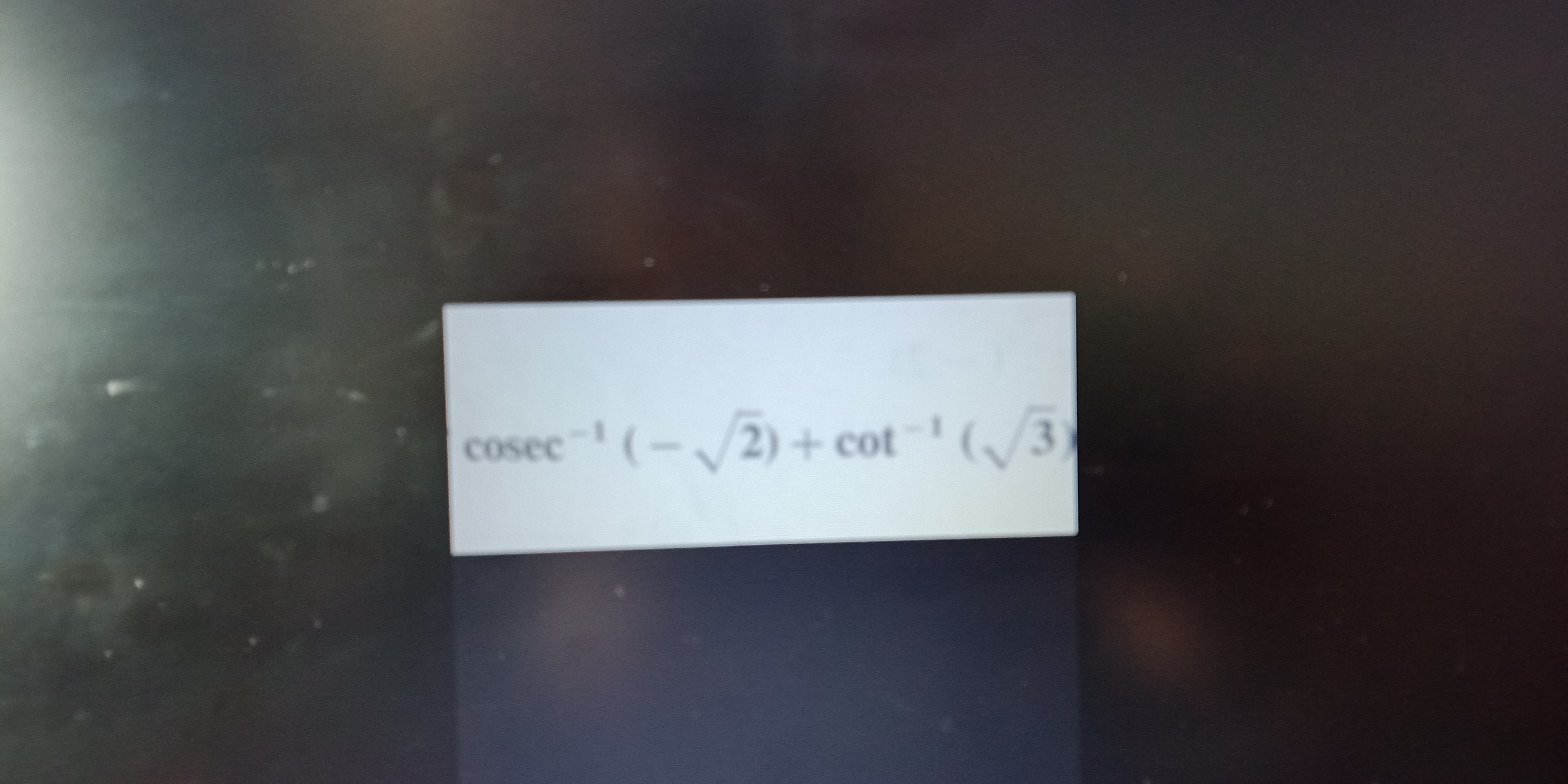
If $$\tan^{-1}{(x+2)}+\tan^{-1}{(x-2)}=\tan^{-1}{(\cfrac{1}{2})}$$, then sum of value(s) of $$x$$ is equal to ?
$$solve\quad for\quad x,\\ 2{ tan }^{ -1 }\left( cos\quad x \right) ={ tan }^{ -1 }\left( 2\quad cosec\quad x \right) $$
Prove that : $$\tan^{-1}{\cfrac{1}{5}}+\tan^{-1}{\cfrac{1}{7}}+\tan^{-1}{\cfrac{1}{3}}+\tan^{-1}{\cfrac{1}{8}}=\cfrac{\pi}{4}$$
Let $$y=\sin^{-1}{(\sin{8})}-\tan^{-1}{(\tan{10})}+\cos^{-1}{(\cos{12})}-\sec^{-1}{(sec{9})}+\cot^{-1}{(\cot{6})}-cosec^{-1}{(cosec{7})}$$. If simplifies to $$a\pi+b$$, then find $$(a-b)$$.
Show that:$$\sin ^ { - 1 } \left( - \frac { 1 } { 2 } \right) + \cos ^ { - 1 } \left( \frac { \sqrt { 3 } } { 2 x } \right) = \cos ^ { - 1 } \left( - \frac { 1 } { 2 } \right)$$
Prove that: $$\tan ^{ -1 }{ \left(\dfrac { 3 }{ 4 } \right) } +\tan ^{ -1 }{ \left(\dfrac { 3 }{ 5 } \right) } -\tan ^{ -1 }{ \left( \dfrac { 8 }{ 19 } \right) =\dfrac { \pi }{ 4 } } $$
Find $$x$$ if $${ tan }^{ -1 }(x+2)+{ tan }^{ -1 }(x-2)={ tan }^{ -1 }\left( \frac { 8 }{ 79 } \right) ;x>0$$
Solve for $$ x , 2 \tan ^ { - 1 } ( \sin x ) = \tan ^ { - 1 } ( 2 \sec x ) , 0 < \frac { \pi } { 2 } $$
$$tan^{-1} A + tan^{-1} B= ?$$
Solve:
$$cos^{-1}{(\dfrac{2x}{1+x^2})}$$
Show that $$\tan ^ { - 1 } ( 1 / 4 ) + \tan ^ { - 1 } ( 2 / 9 ) = \frac { 1 } { 2 } \cos ^ { - 1 } \left( \frac { 3 } { 5 } \right)$$
Solve -
If y = $$sec^-1 (\frac{1}{\sqrt{1 - x^2}})$$
Solve the equation.
$$\cot^{-1} x + \cot^{-1} (n^2 - x + 1) = \cot^{-1} (n - 1)$$
Write the value of $$\cos^{-1} (\cos 1540^{\circ})$$.
Find the simplest values of
$$\tan^{-1} \dfrac{\sqrt{1+x^2} - 1}{x}$$, and $$\tan \left(\dfrac{1}{2}\sin^{-1} \dfrac{2x}{1 + x^2}+\dfrac{1}{2} \cos^{-1} \dfrac{1-y^2}{1+y^2}\right)$$.
Express $$tan^-1 (\frac{cosx}{1-sin x})$$, $$-\frac{\pi}{2} < x < \frac{3\pi}{2}$$ in the simplest form.
Write the value of $$\tan^{-1} \left (\dfrac {1}{x}\right )$$ for $$x < 0$$ in terms of $$\cot^{-1} (x)$$.
If $$ax+b(sec(\tan^{-1}x))=c$$ and $$ay+b(sec(\tan^{-1}y))=c$$, then find the value of $$\dfrac{x+y}{1-xy}$$.
Prove that $$\tan^{-1}\left(\dfrac{\sqrt{1+x^{2}}+\sqrt{1-x^{2}}}{\sqrt{1+x^{2}}-\sqrt{1-x^{2}}}\right)=\dfrac{\pi}{4}+\dfrac{1}{2}\cos^{-1}x^{2}$$
Find the real Solution of the equation
$$\tan^{-1}\sqrt {x(x+1)}+\sin^{-1}\sqrt {x^2 +x+x}=\dfrac {\pi}{2}$$.
Solve the equation
$$\theta = \tan^{-1} (2 \tan^2 \theta) - \dfrac{1}{2} \sin^{-1}\dfrac{3\sin 2\theta}{5+4\cos 2\theta}$$.
Show that
$$\sin^{-1}\dfrac{5}{13}+\cos^{-1}\dfrac{3}{5}=\tan^{-1}\dfrac{63}{16}$$
If $$\dfrac{1}{2}\sin^{-1} \dfrac{2x}{1-x^2}+\dfrac{1}{2} \cos^{-1}\dfrac{1-y^2}{1+y^2}+\dfrac{1}{3}\tan^{-1}\dfrac{3z-z^3}{1-3z^2}=5 \pi$$
then prove that $$x+y+x=xyz$$
Class 12 Commerce Maths Extra Questions
- Application Of Derivatives Extra Questions
- Application Of Integrals Extra Questions
- Continuity And Differentiability Extra Questions
- Determinants Extra Questions
- Differential Equations Extra Questions
- Integrals Extra Questions
- Inverse Trigonometric Functions Extra Questions
- Linear Programming Extra Questions
- Matrices Extra Questions
- Probability Extra Questions
- Relations And Functions Extra Questions
- Three Dimensional Geometry Extra Questions
- Vector Algebra Extra Questions

